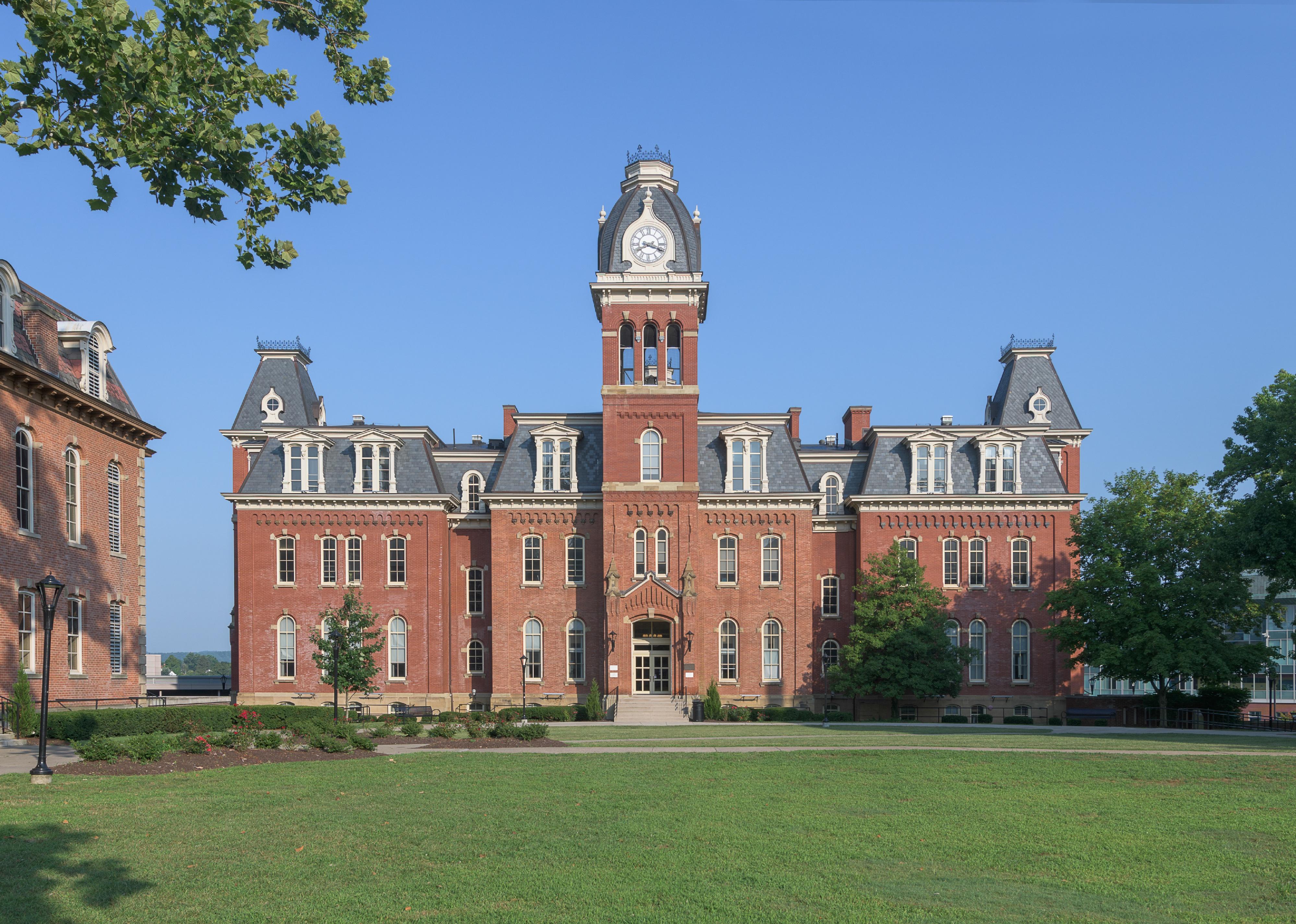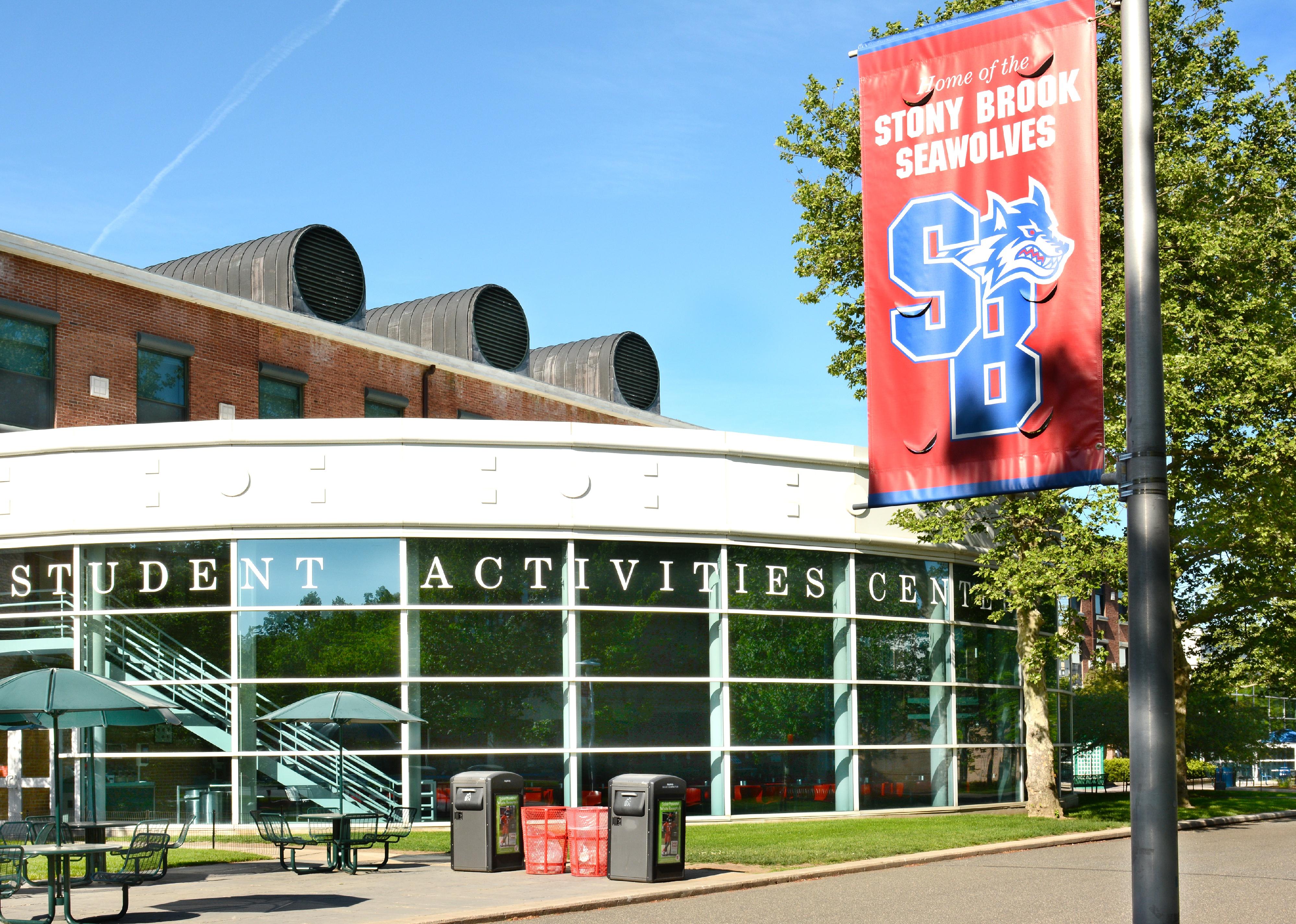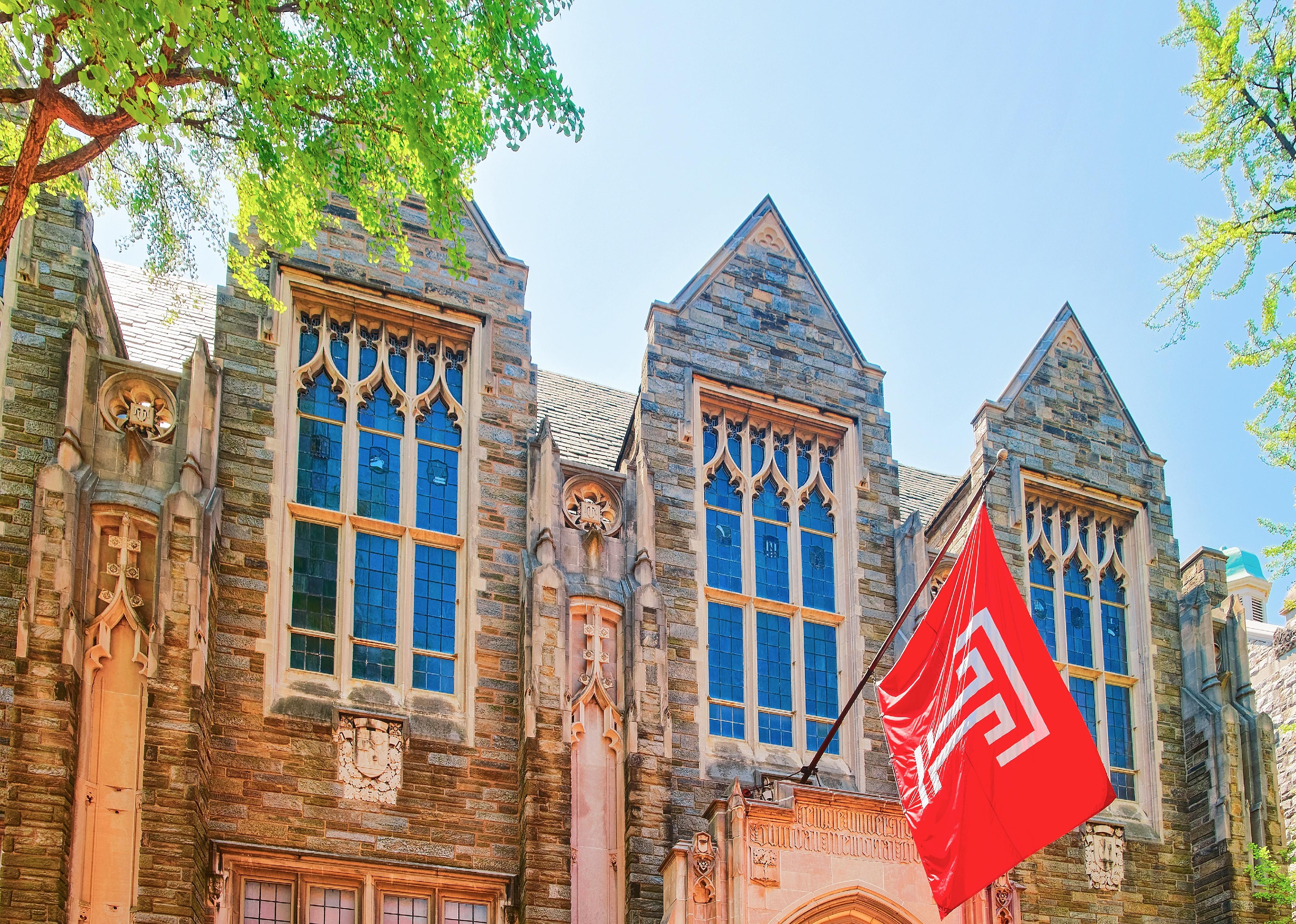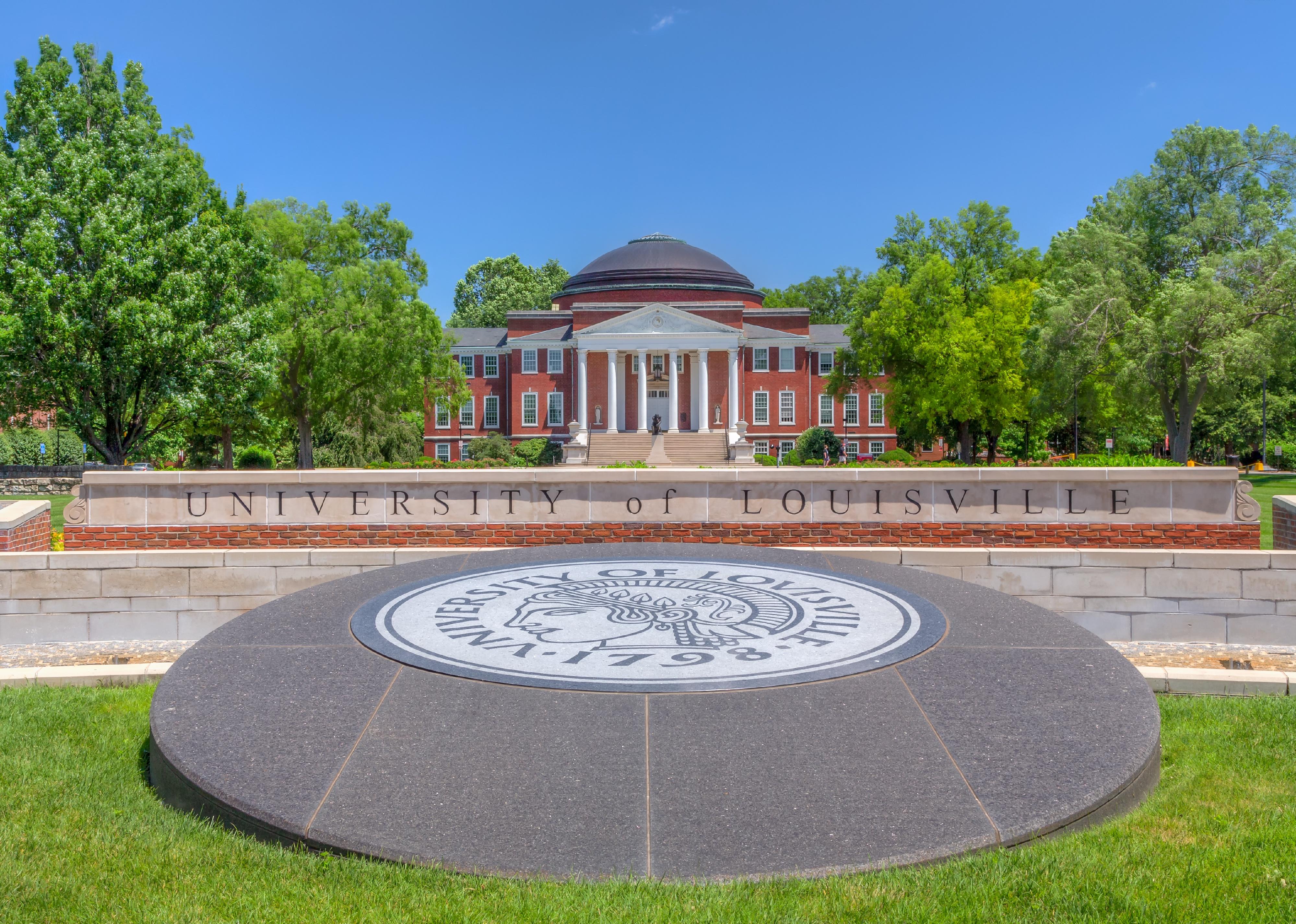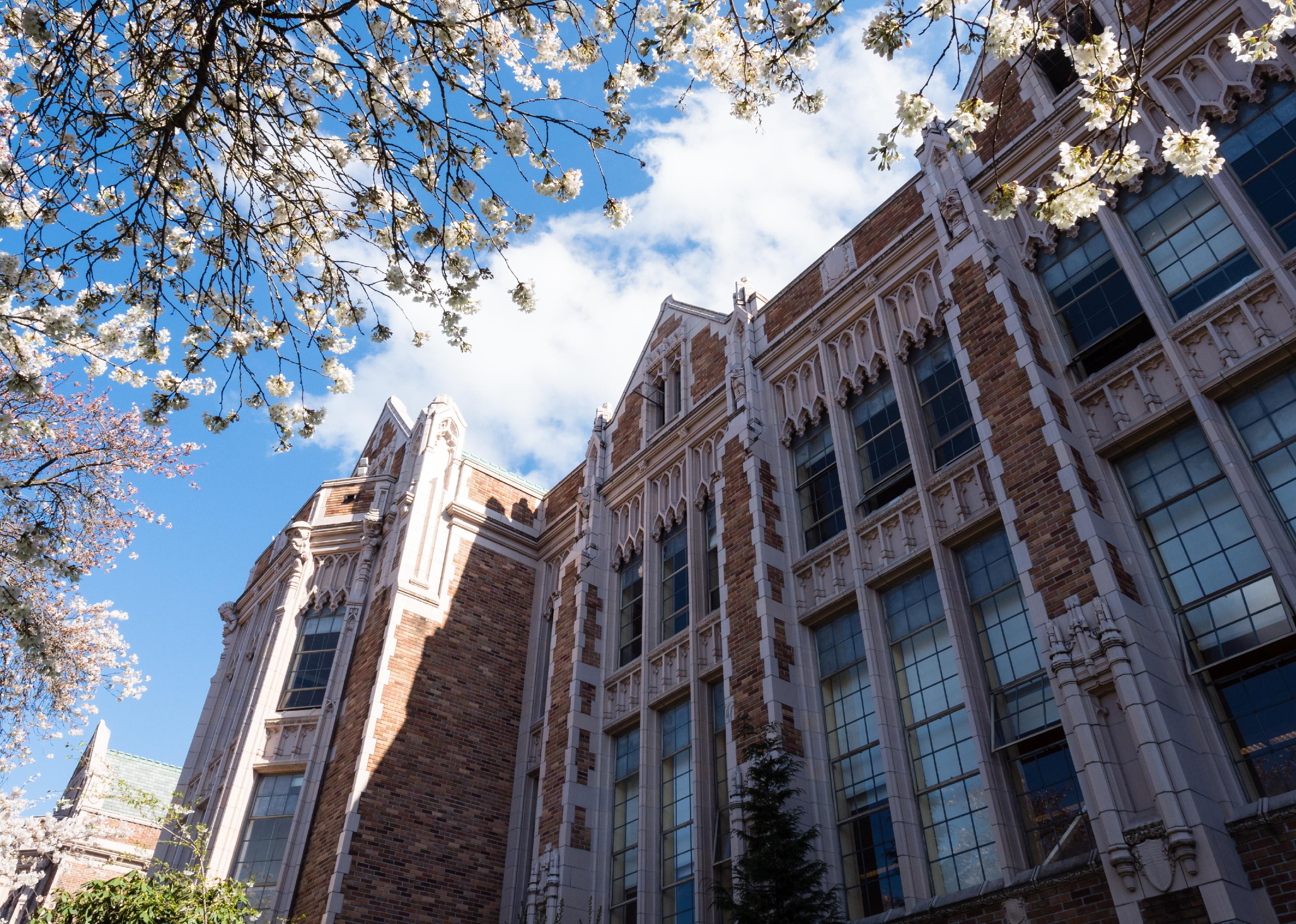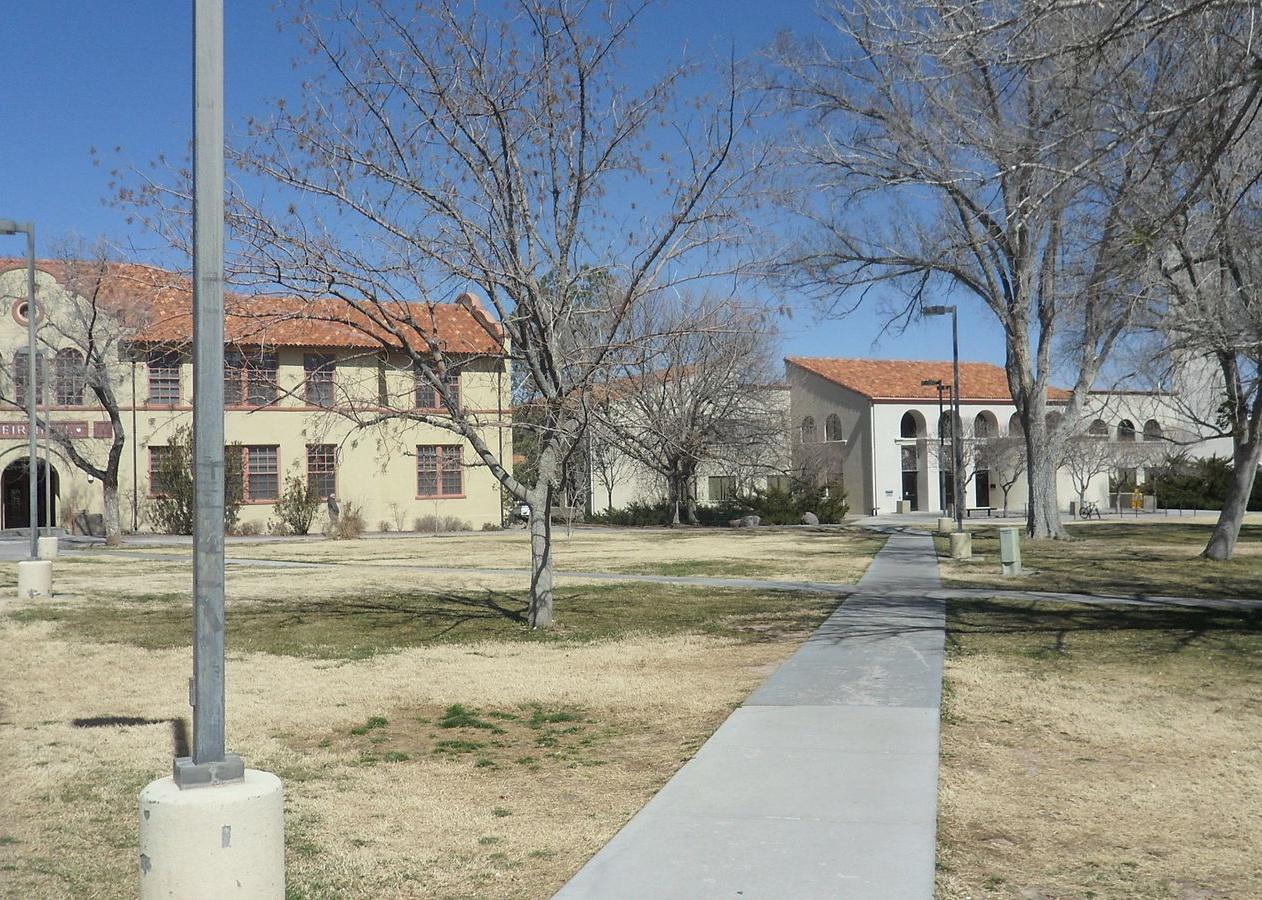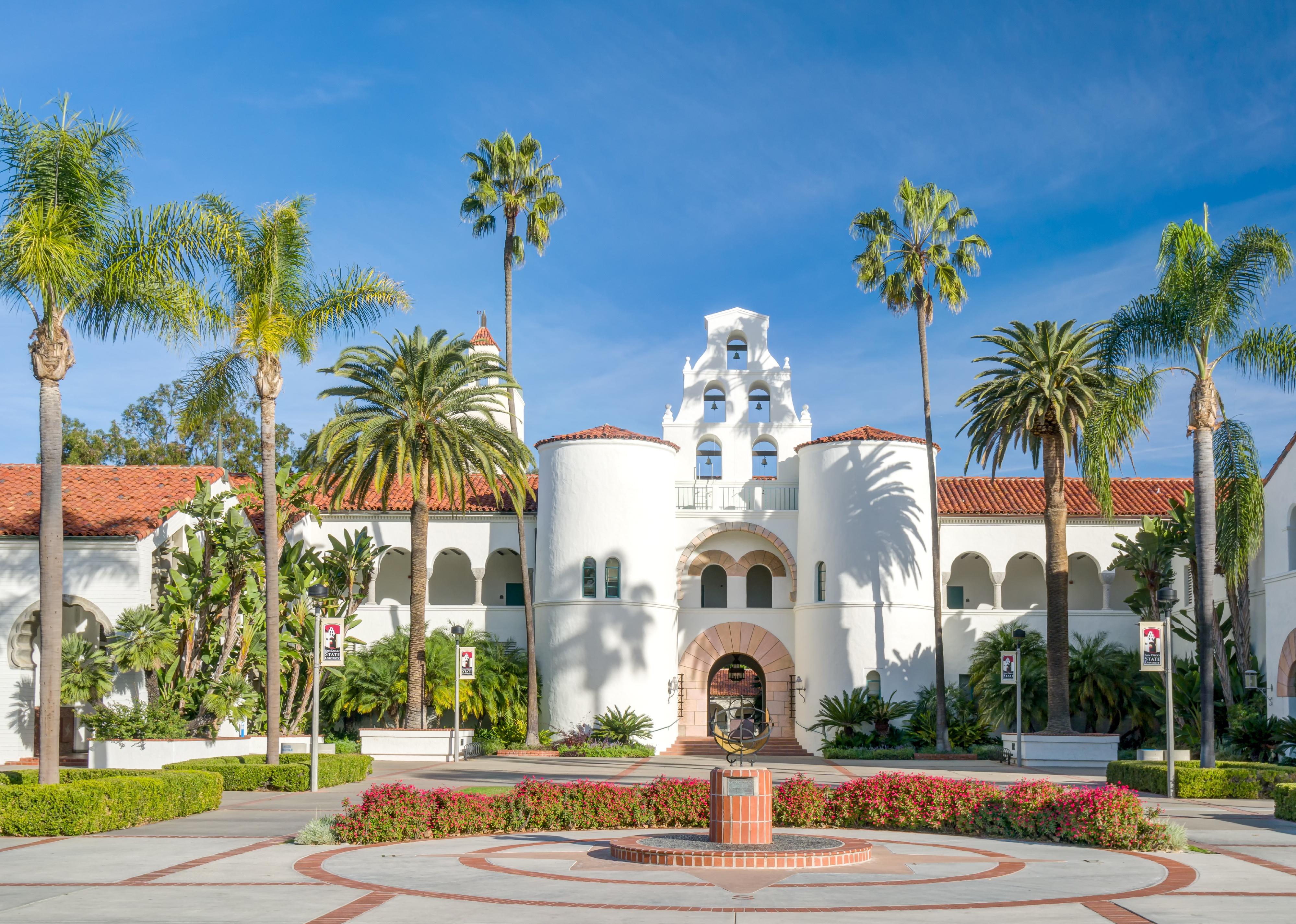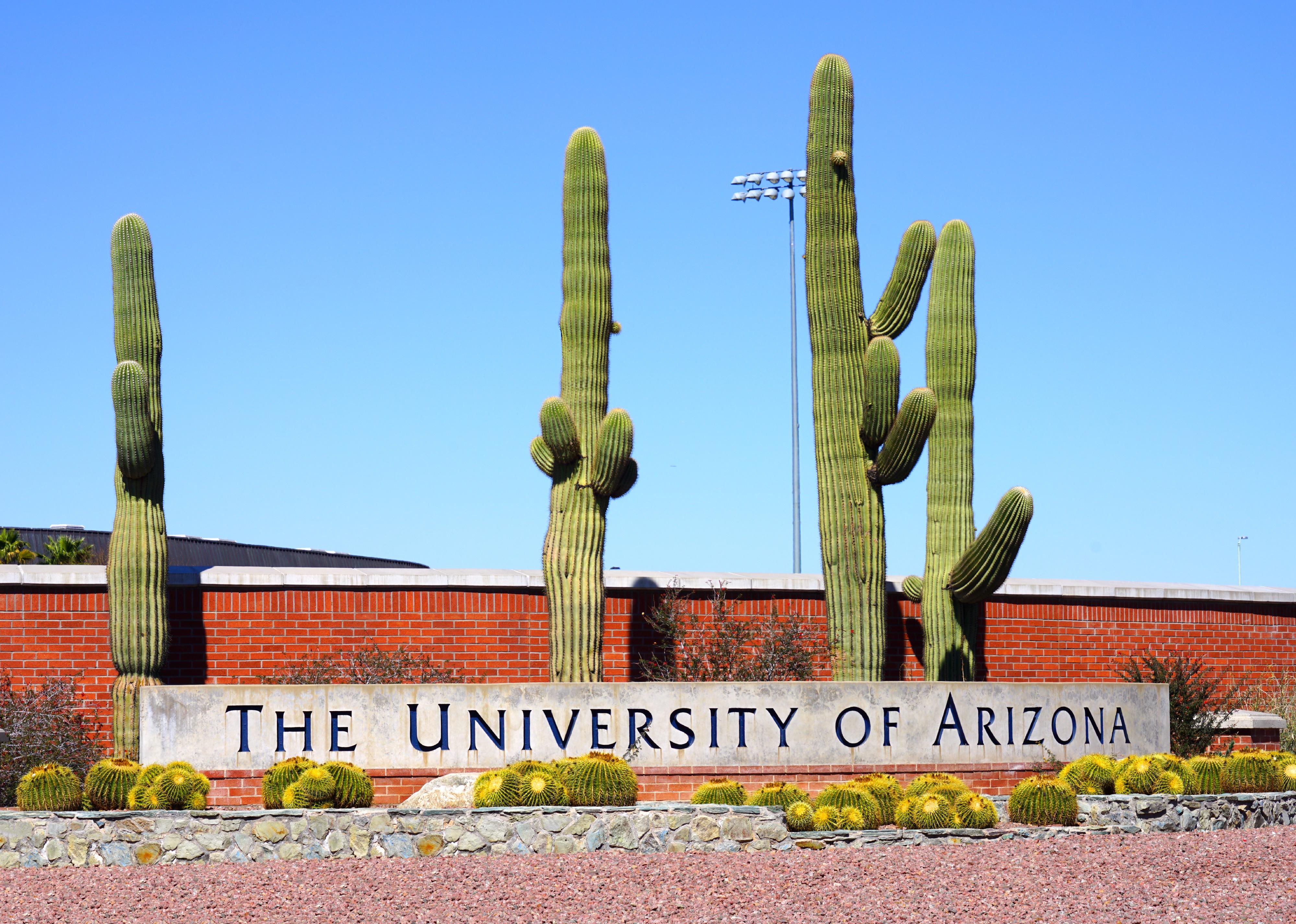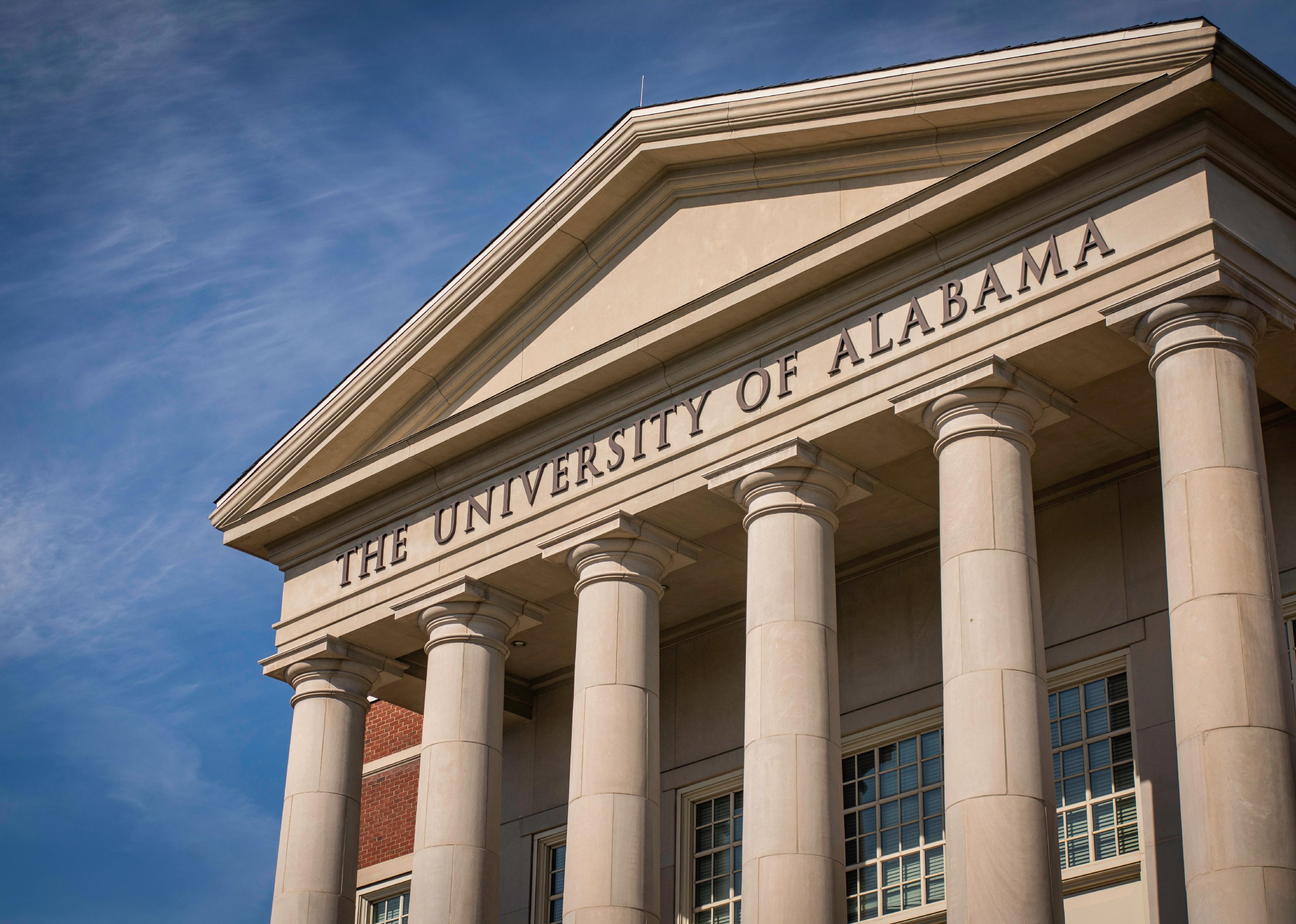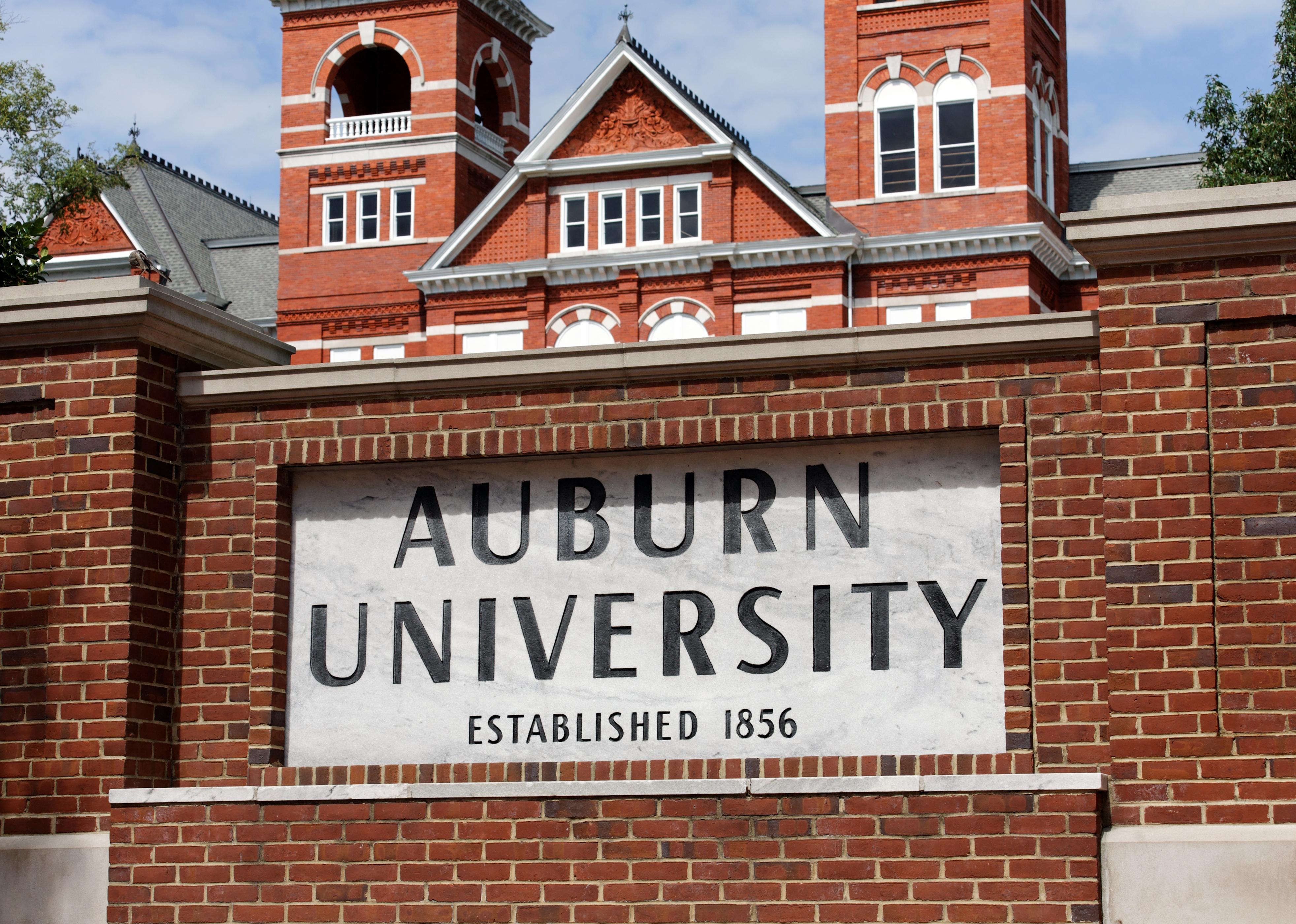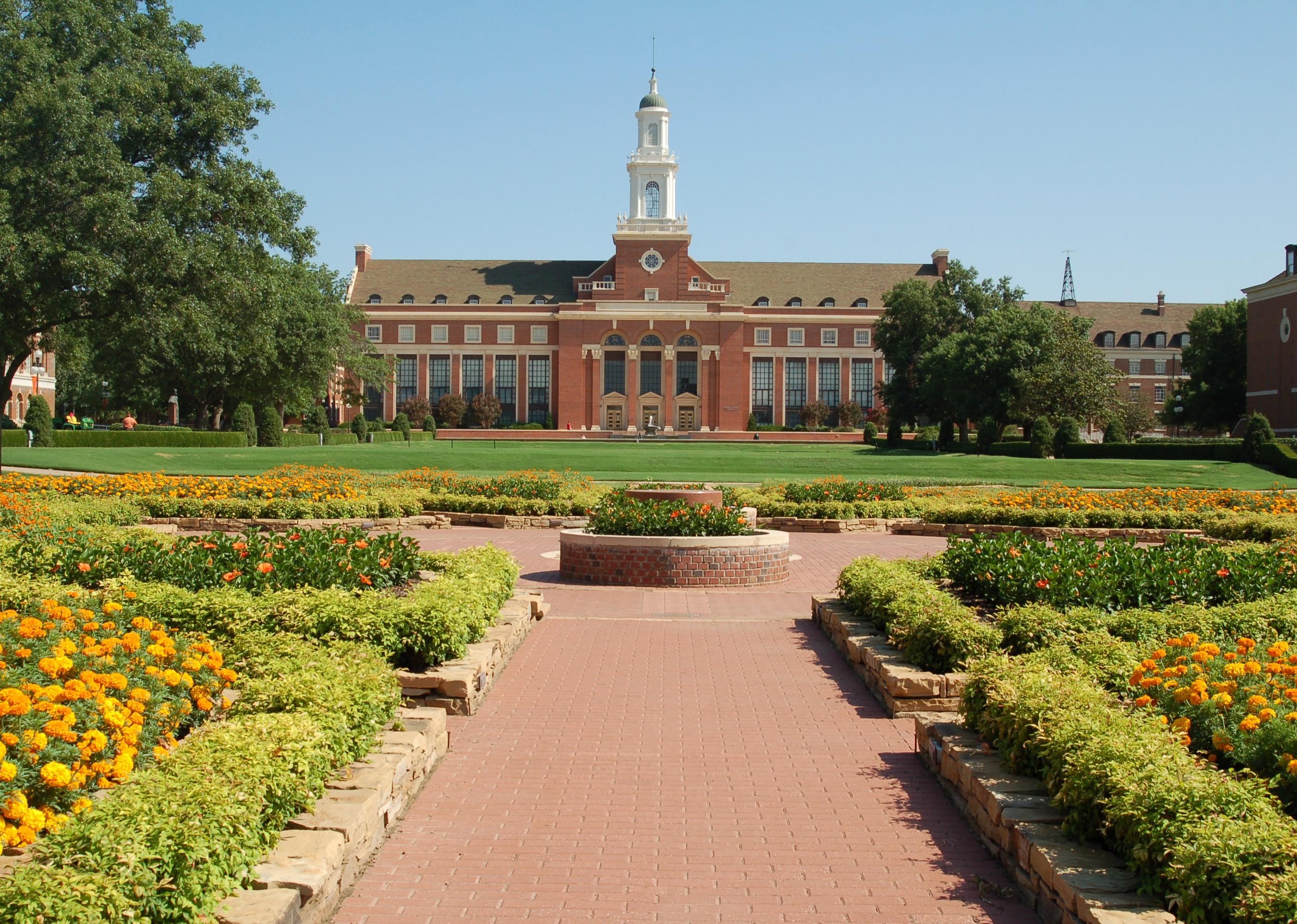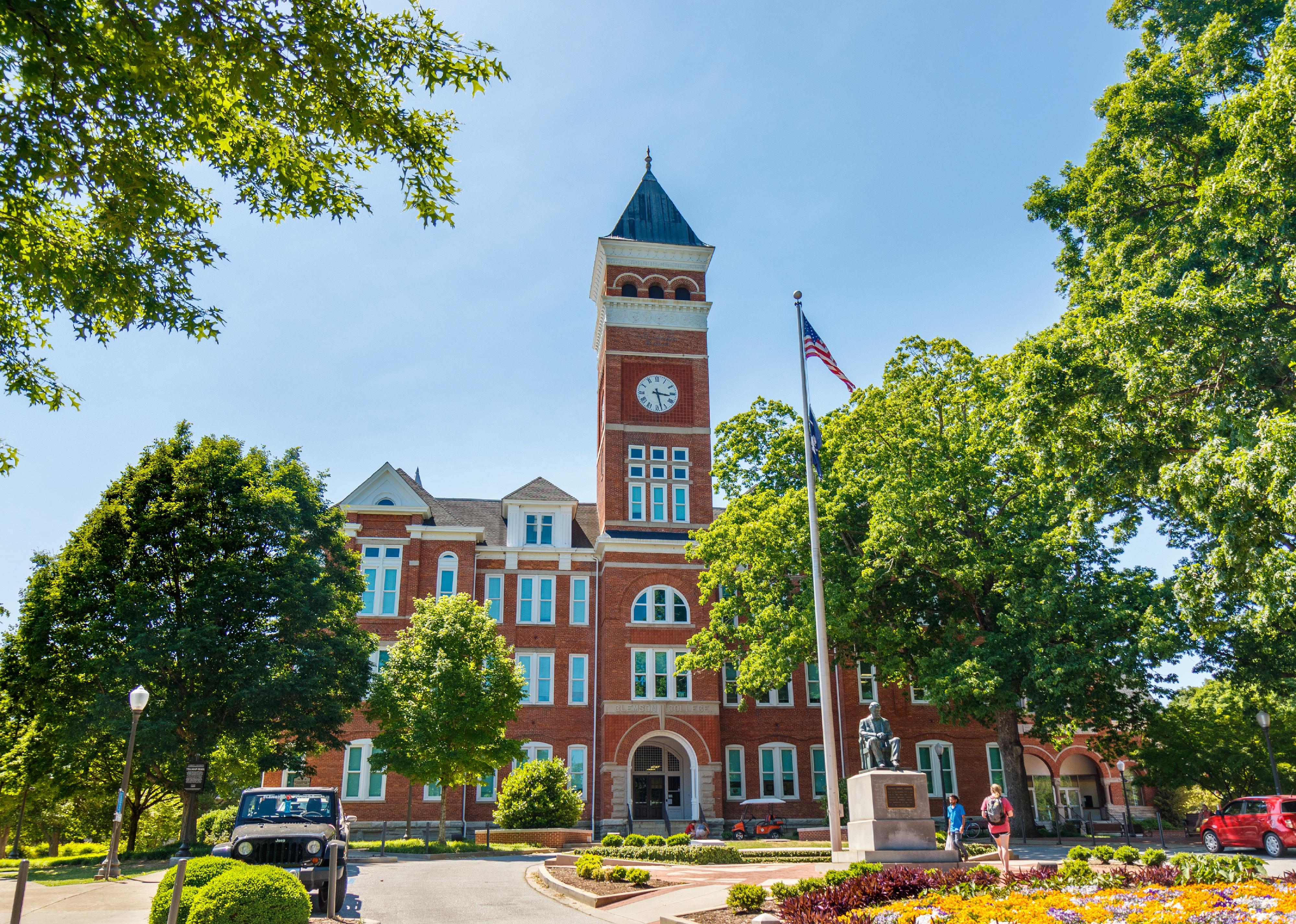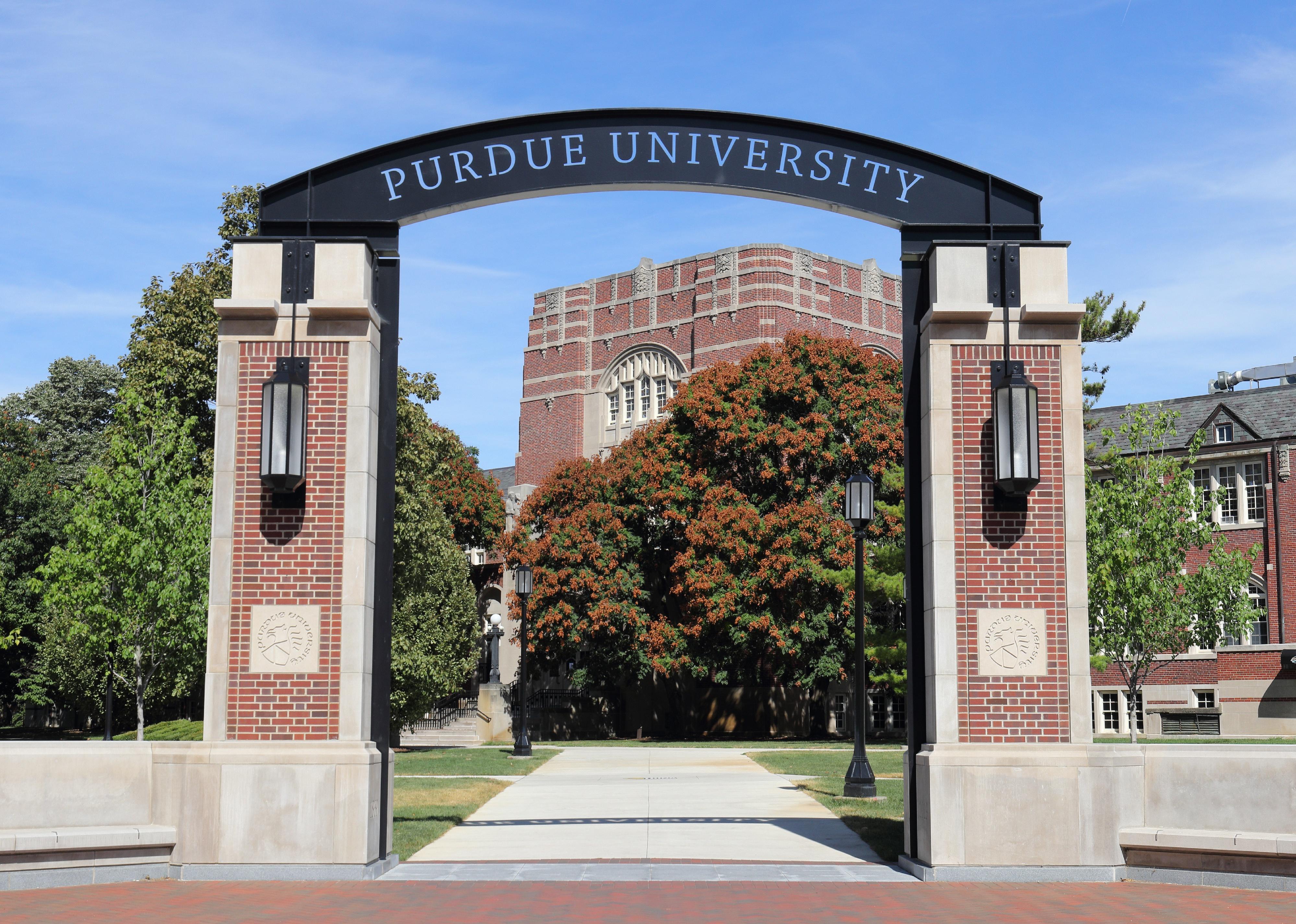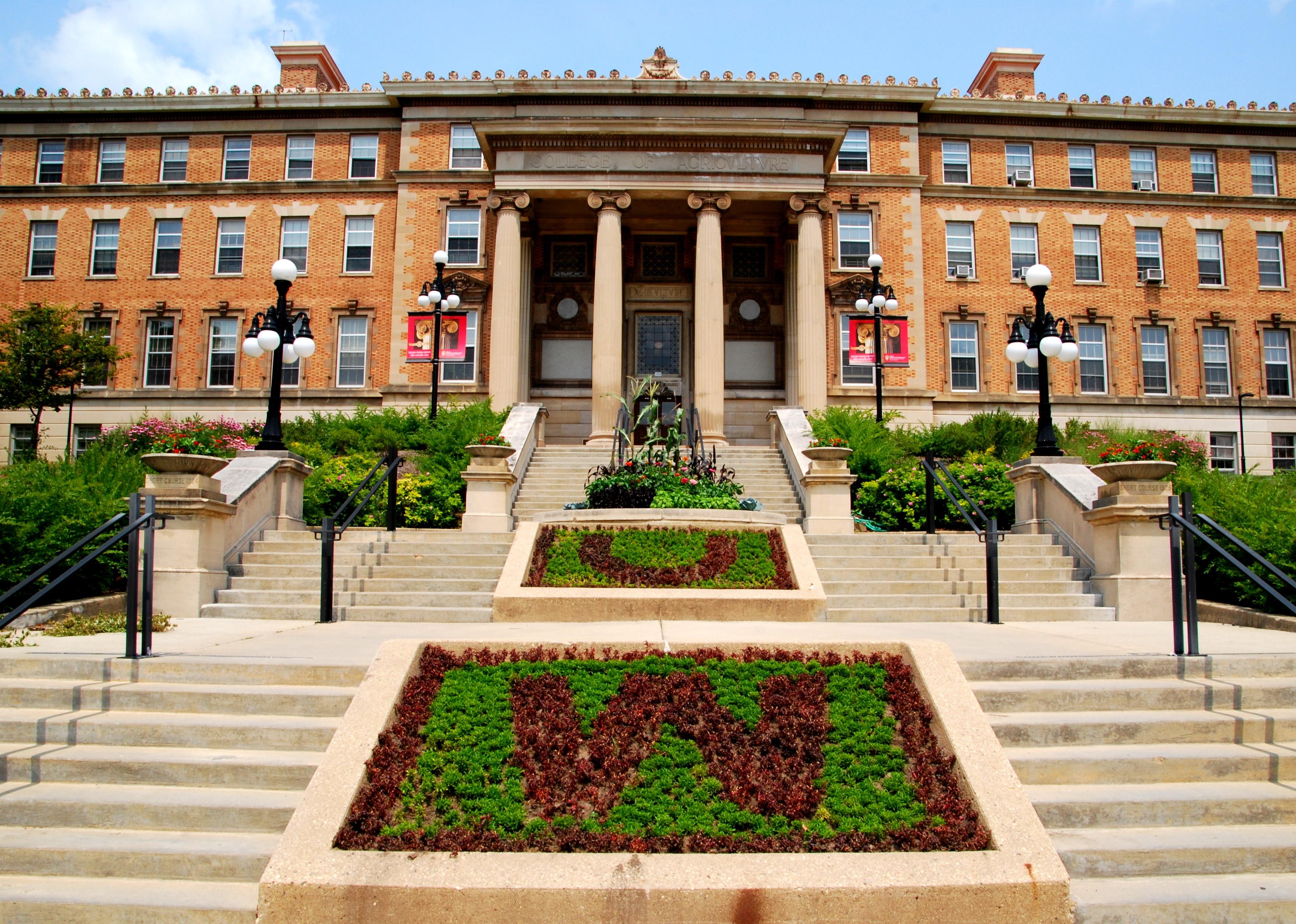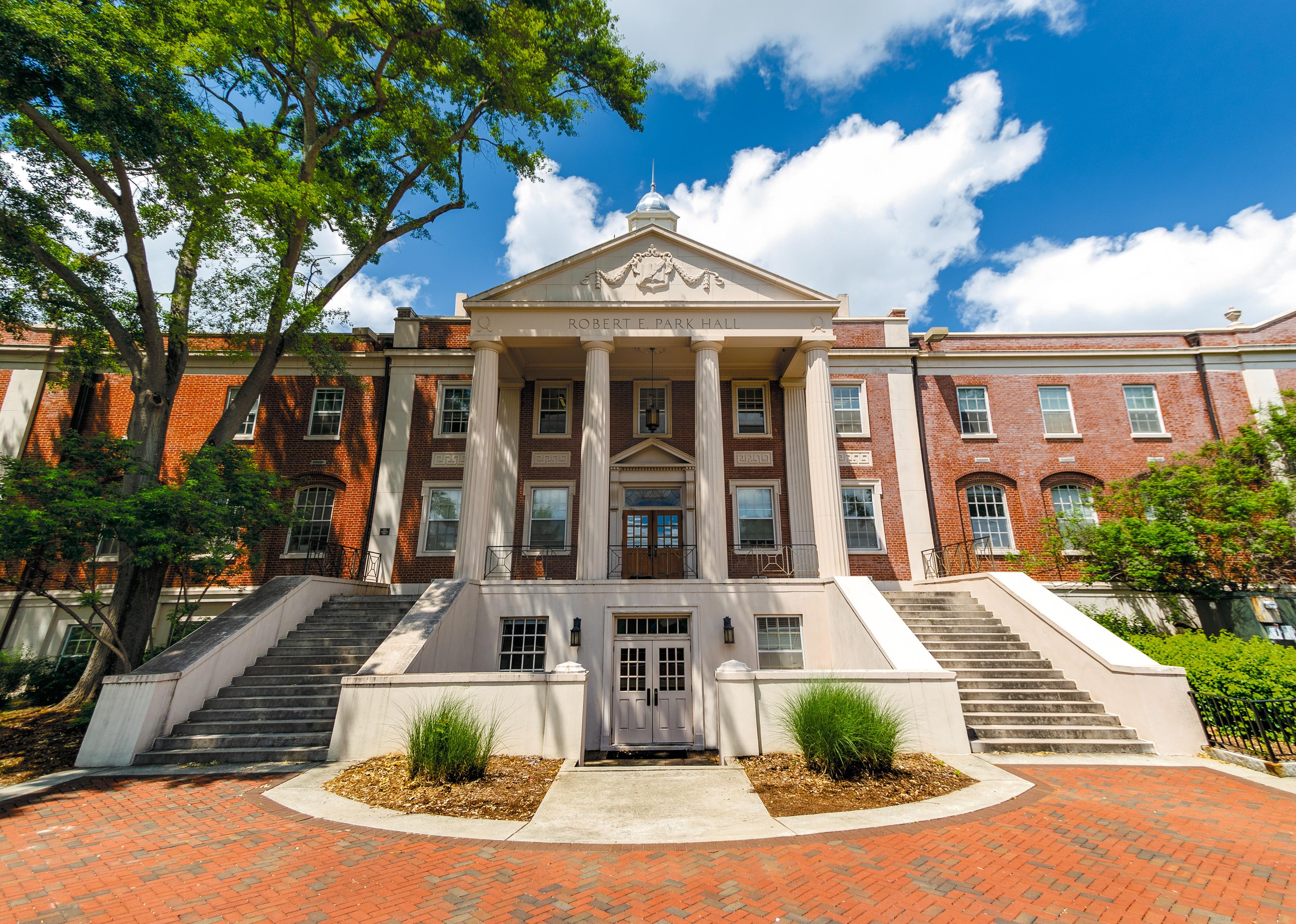Best public colleges in America

Bryan Pollard // Shutterstock
Best public colleges in America
South Building, built in 1814, at the University of North Carolina at Chapel Hill in Chapel Hill, North Carolina.
Earning a college degree is an investment with far-reaching benefits. Adults who hold degrees earn an average of $36,000 more per year than those who hold a high school diploma. This increased income can mean a big difference in quality of life, from being able to afford a home to lower instances of poverty, and even longer life expectancy.
While those statistics are all good reasons to go to college, education often comes with a hefty price tag. Over the last 10 years, tuition rates for both public and private colleges have increased by more than 25% and student loan debt has increased alongside it. According to the Education Data Initiative, the disparity in cost between private and public college tuition has grown yearly over the past decade, reaching the point where a single year at a private college costs nearly as much as an entire 4-year degree at a public school. For the 2020-2021 academic year, the average annual tuition at a 4-year private nonprofit college was $35,852, whereas the price of an in-state public college was $9,375. Private college is, on average, 282.4% more expensive. As a result, many students are choosing to attend a public university, where they can potentially get less expensive tuition and better value for their money.
Public colleges and universities, which receive funding from state and local government sources, mainly in the form of dedicated tax revenue, are usually less expensive than their private counterparts primarily because they do not have to rely solely on tuition fees to stay solvent. And while there is a long-standing assumption that a private school education is somehow “better” than a state university, state schools often provide the same types of degrees as private schools, and depending on the student, can sometimes provide a better fit for their education.
Stacker compiled a list of the best public colleges in America using data from Niche, which was released in 2023. Niche ranks schools based on a variety of factors including academics, admissions, cost, and student life. Niche’s methodology can be found here.
Take a look at some of the best public schools in the country.
You may also like: Best boarding schools in America
![]()
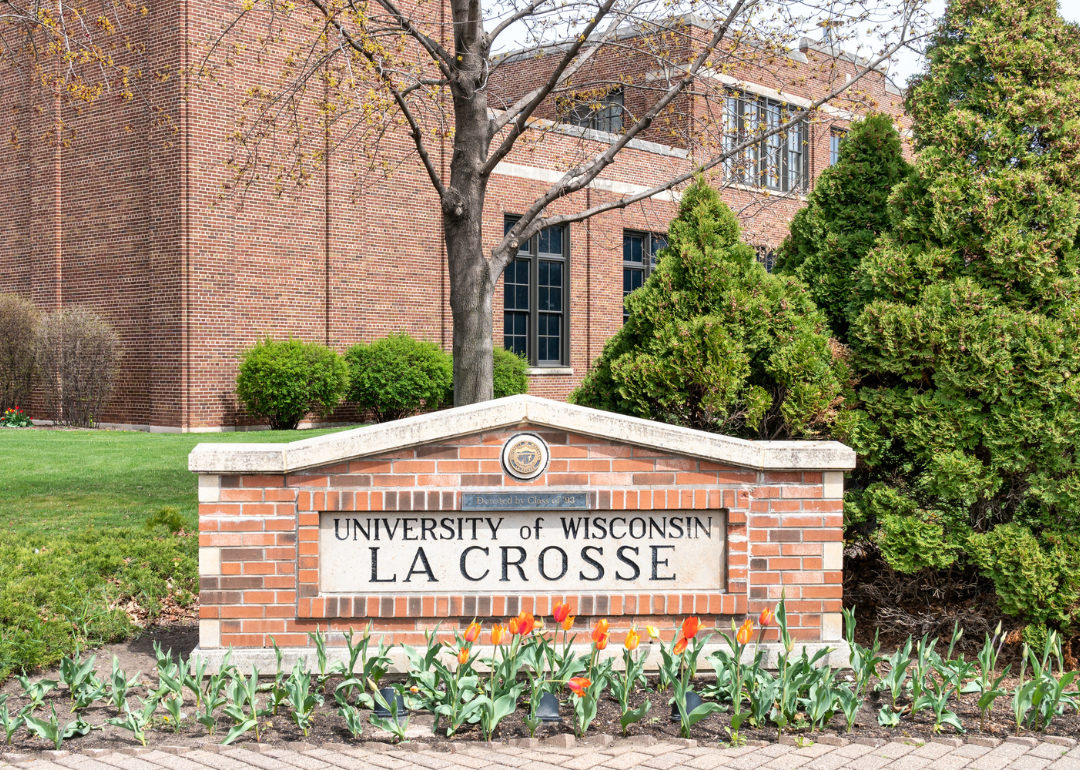
Ken Wolter // Shutterstock
#100. University of Wisconsin – La Crosse
The entrance sign to the campus of the University of Wisconsin-La Crosse.
– Location: La Crosse, WI
– Students: 8,863
– Students to faculty ratio: 18:1
– Graduation rate: 71%
– Median earnings six years after graduation: $48,000
– Employment rate two years after graduation: 96%
The University of Wisconsin at La Crosse has as its motto “mens corpusque” or “mind and body.” Here’s some evidence that students embrace it: 87% participate in recreational sports while maintaining an average 3.2 GPA. The university offers more than 130 degree programs in arts, business, education, health and science, and the humanities and social sciences for all levels of students, undergraduate to doctoral. Ninety-one percent of its classes have fewer than 50 students.
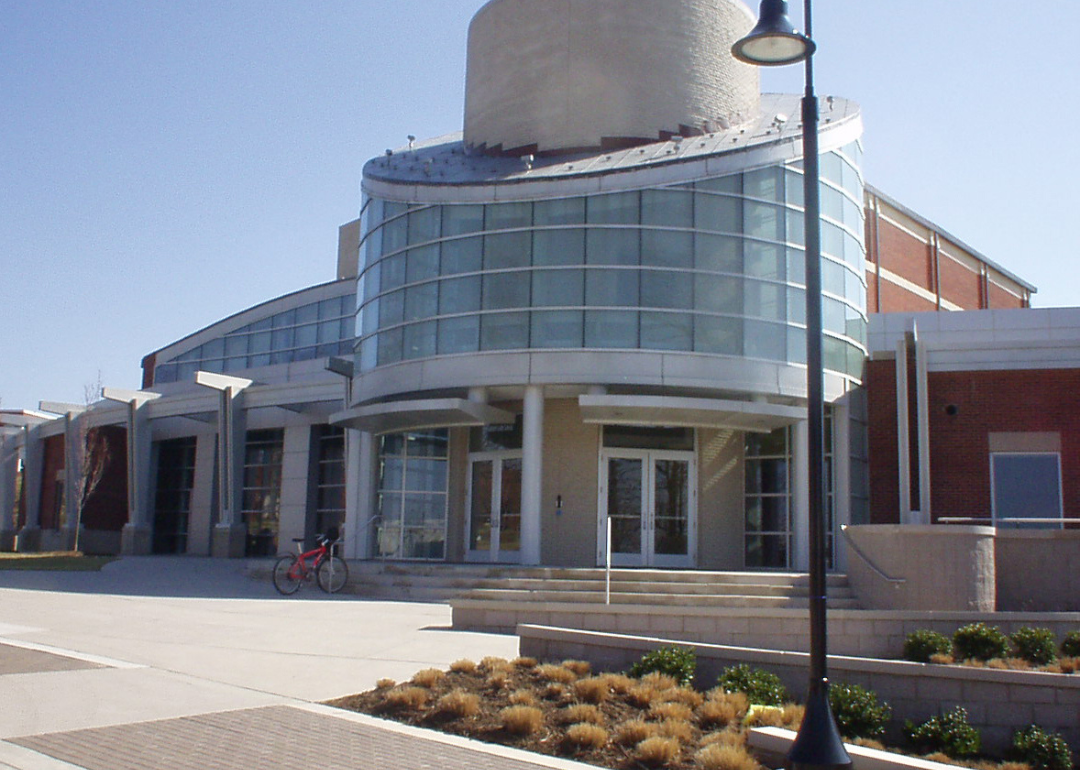
William Davis // Wikimedia Commons
#99. University of North Carolina School of the Arts
Watson Hall, NCSA’s music building.
– Location: Winston Salem, NC
– Students: 890
– Students to faculty ratio: 5:1
– Graduation rate: 72%
– Median earnings six years after graduation: $35,500
– Employment rate two years after graduation: 92%
Founded in 1963 as the country’s first public arts conservatory, today UNCSA trains students in high school through the master’s level in the performing, visual, and moving image arts. Students can choose to focus on drama, dance, design and production, filmmaking, or music.

Felix Mizioznikov // Shutterstock
#98. University of North Carolina – Wilmington
An aerial view of the campus at the University of North Carolina – Wilmington.
– Location: Wilmington, NC
– Students: 11,989
– Students to faculty ratio: 15:1
– Graduation rate: 74%
– Median earnings six years after graduation: $41,600
– Employment rate two years after graduation: 93%
One of 17 institutions that make up the University of North Carolina system, the Wilmington campus is one of the most attractive campuses in the South. It was founded in 1947 as Wilmington College in the heart of what’s known as “the Port City,” and joined the University of North Carolina system in 1969. It offers programs designed for military personnel and their families at nearby Marine Corps Base Camp Lejeune and Marine Corps Air Station New River.
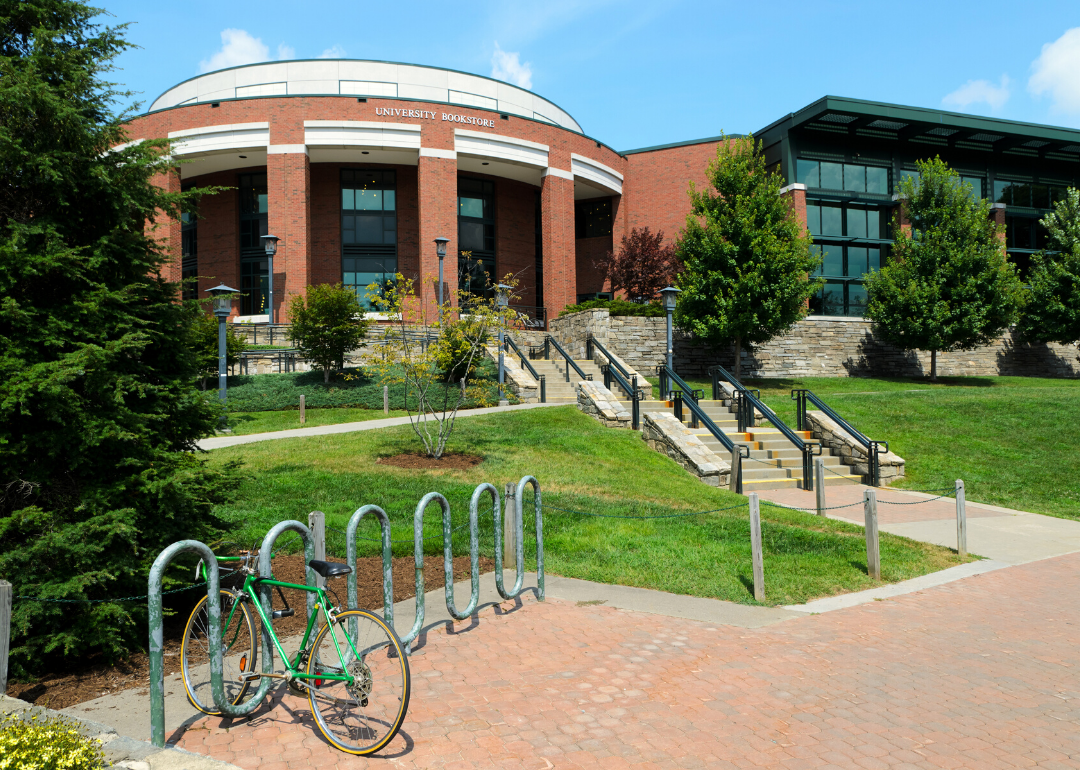
Konstantin L // Shutterstock
#97. Appalachian State University
– Location: Boone, NC
– Students: 16,905
– Students to faculty ratio: 15:1
– Graduation rate: 73%
– Median earnings six years after graduation: $38,800
– Employment rate two years after graduation: 94%
Located in Boone, North Carolina, in the Blue Ridge Mountains, Appalachian State University offers more than 150 undergraduate and graduate programs. The school has been recognized multiple times as a top college, ranked in The Princeton Review’s 2023 “Guide to Green Colleges” as well as its “Best 388 Colleges: 2023 Edition.” Insofar as keeping green goes, App State has a long-standing commitment to sustainability, with programs geared toward reducing waste throughout the community, using locally sourced food on campus, and designing a zero- energy-ready home in partnership with Habitat for Humanity.
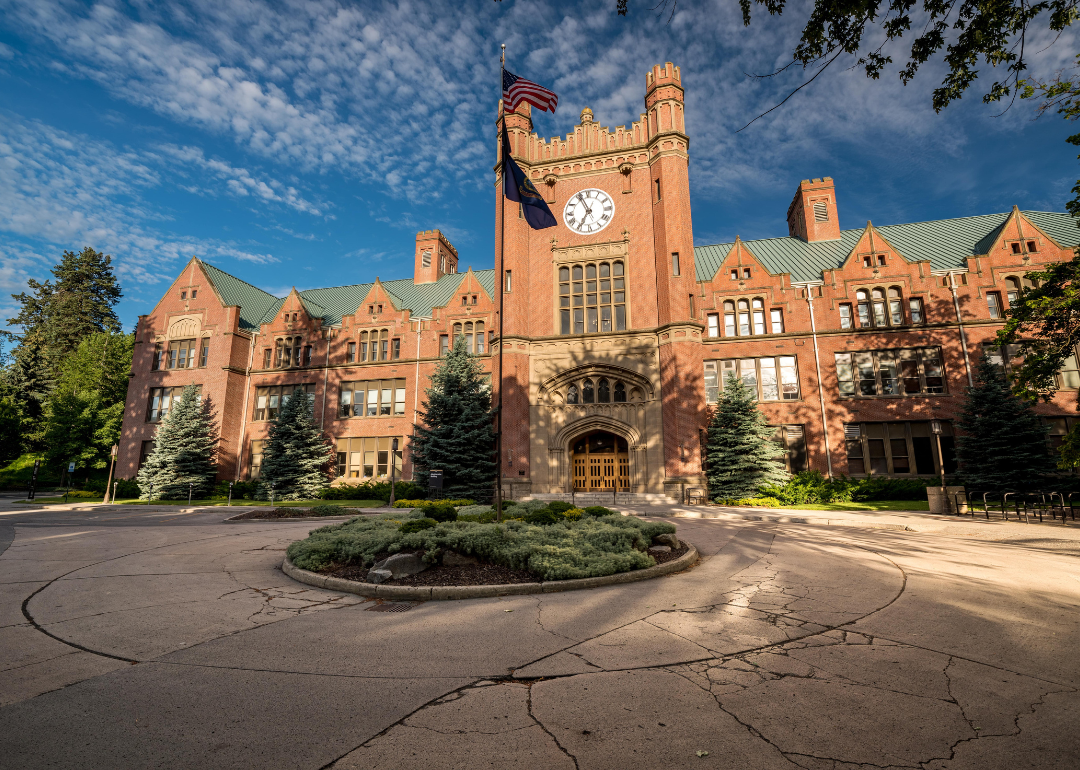
Charles Knowles // Shutterstock
#96. University of Idaho
A brick administration building at the University of Idaho.
– Location: Moscow, ID
– Students: 6,323
– Students to faculty ratio: 12:1
– Graduation rate: 59%
– Median earnings six years after graduation: $41,900
– Employment rate two years after graduation: 92%
The University of Idaho is a land-grant research school founded in 1889 through the federal Morrill Act to specialize in agriculture, engineering, and military sciences. The main campus is in Moscow, a university city of art galleries, movie theaters, and restaurants but surrounded by the Palouse Hills and close to forests and lakes, The class of 2022 is the largest in the school’s history. One fun fact: Its mascot is called Joe Vandal.
You may also like: Can you pass this 8th grade assessment test?

Tdorante10 // Wikimedia Commons
#95. CUNY Baruch College
– Location: New York, NY
– Students: 12,421
– Students to faculty ratio: 20:1
– Graduation rate: 73%
– Median earnings six years after graduation: $57,20
– Median earnings six years after graduation: $57,200
– Employment rate two years after graduation: 89%
New York’s CUNY Baruch College has been ranked as a top college not only by Niche, but also by Forbes, The Princeton Review, and U.S. News & World Report. Located in the heart of New York City, students can enjoy all the city has to offer while getting a stellar education. Baruch has also been rated as one of America’s most diverse schools, with students representing more than 140 nations and over 90 languages.
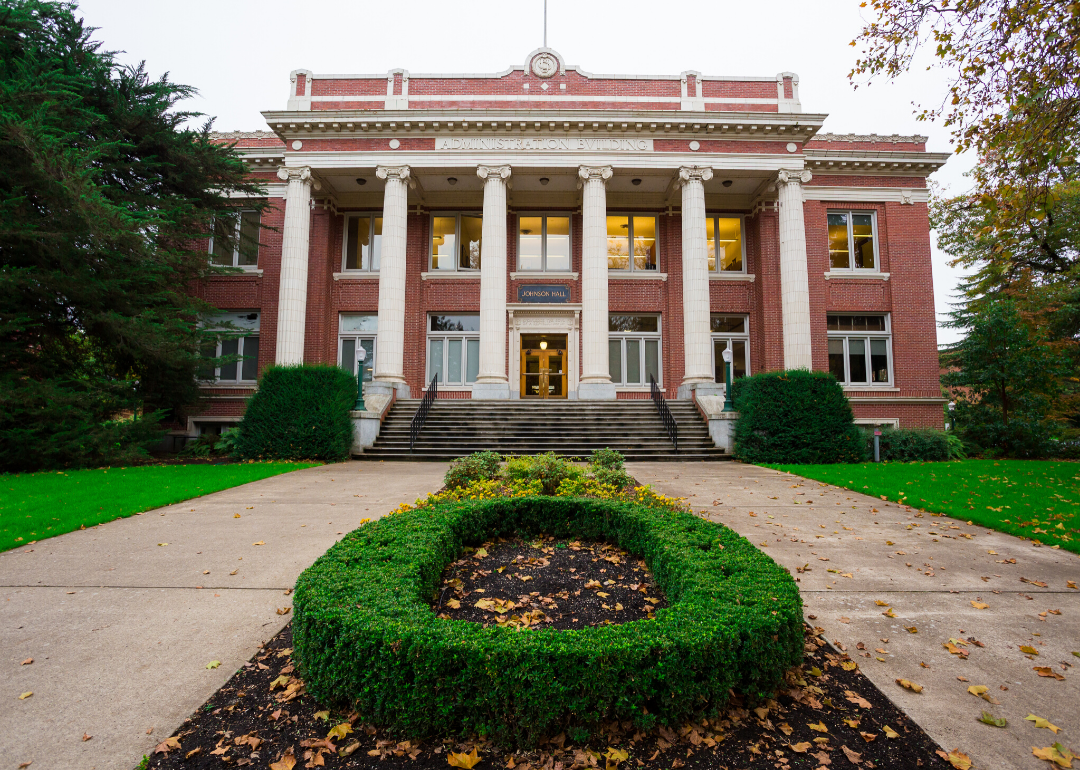
Joshua Rainey Photography // Shutterstock
#94. University of Oregon
– Location: Eugene, OR
– Students: 16,400
– Students to faculty ratio: 16:1
– Graduation rate: 74%
– Median earnings six years after graduation: $44,800
– Employment rate two years after graduation: 91%
UO offers more than 300 undergraduate programs, providing its students with a variety of degree options. There are nine schools and colleges, including the College of Arts and Sciences, College of Design, School of Journalism and Communications, and School of Law. Students who attend UO say they appreciate the beauty of the campus and surrounding areas, the flexibility of educational programs, and the numerous research opportunities.

Wendy van Overstreet // Shutterstock
#93. Ohio University
– Location: Athens, OH
– Students: 13,896
– Students to faculty ratio: 13:1
– Graduation rate: 66%
– Median earnings six years after graduation: $40,500
– Employment rate two years after graduation: 91%
Established in 1802 as the first college in the state, Ohio University has more than 250 educational programs to choose from, as well as sororities and fraternities, clubs, and athletics. Popular degree programs include nursing, business, and communications, and students list friendly and helpful staff, exceptional professors, and the rich campus life as just a few of the reasons they find this school worth attending.
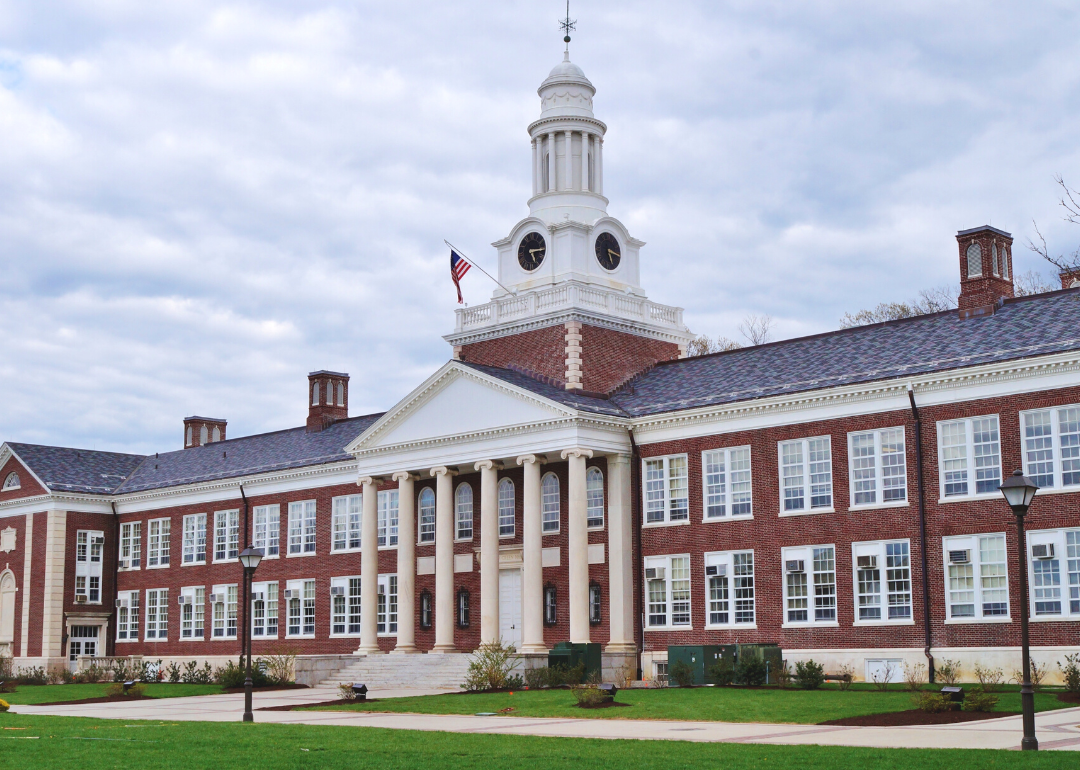
EQRoy // Shutterstock
#92. The College of New Jersey
– Location: Ewing, NJ
– Students: 6,781
– Students to faculty ratio: 13:1
– Graduation rate: 86%
– Median earnings six years after graduation: $58,500
– Employment rate two years after graduation: 95%
The College of New Jersey, which was founded in 1855, is located in the town of Ewing, not too far from the bigger cities of New York and Philadelphia. Degree options are many, with studies in business, nursing, and psychology being some of the most popular. The school is known for research programs, with a strong focus on faculty-student collaboration, which earned it the Campus-Wide Award for Undergraduate Research Accomplishment by the Council on Undergraduate Research in 2015.

Another Believer // Wikimedia Commons
#91. University of Houston
– Location: Houston, TX
– Students: 28,966
– Students to faculty ratio: 20:1
– Graduation rate: 62%
– Median earnings six years after graduation: $51,600
– Employment rate two years after graduation: 91%
The University of Houston offers a wide range of degree programs. In addition to being ranked as one of the Best Public Colleges in America, it was recognized by The Princeton Review as the #1 school for Best Undergrad Programs for Entrepreneurs. Top choices in majors include psychology, finance, and accounting.
You may also like: 2-year degrees that go on to earn the least money
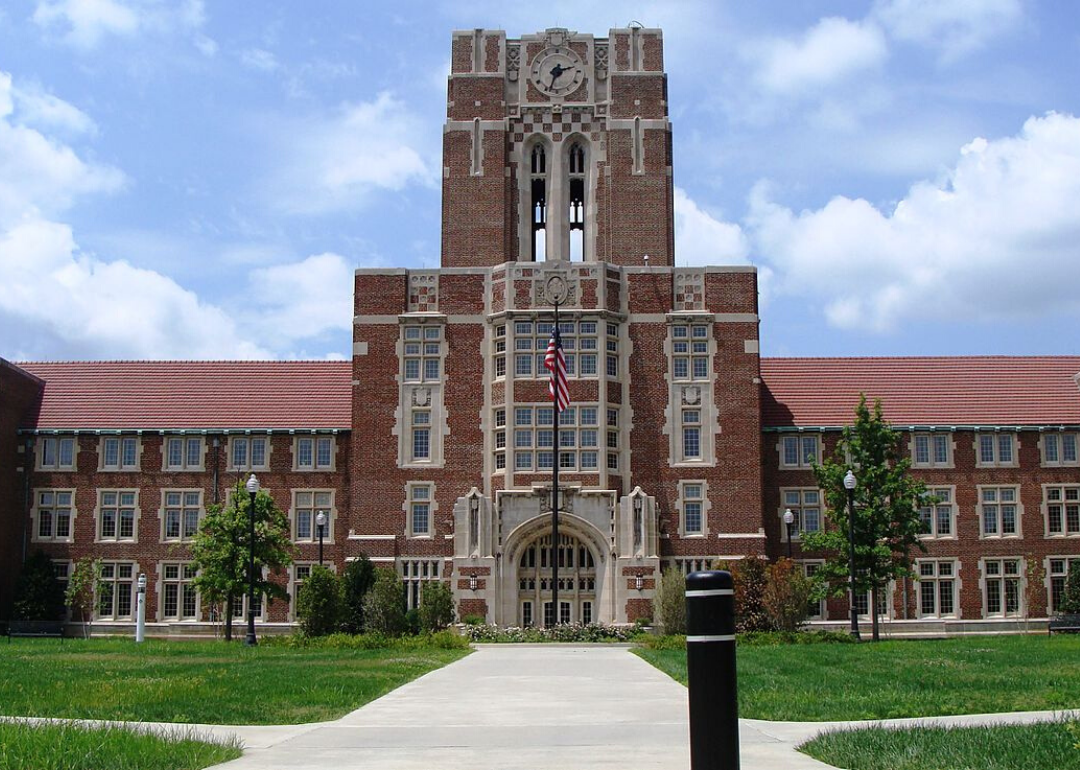
Nightryder84 // Wikimedia Commons
#90. University of Tennessee
– Location: Knoxville, TN
– Students: 22,914
– Students to faculty ratio: 13:1
– Graduation rate: 71%
– Median earnings six years after graduation: $45,100
– Employment rate two years after graduation: 94%
With the main campus located in Knoxville and two branch campuses in Chattanooga and Martin, the University of Tennessee offers a multitude of educational opportunities at all of its locations. Its 78% acceptance rate makes it even more accessible, and the school awards nearly $10,000 per student in average total financial aid each year. Students who attend UT say that the campus is welcoming and promotes a family-like atmosphere, and there are myriad clubs, sports, and other activities to enjoy.
Nagel Photography // Shutterstock
#89. West Virginia University
– Location: Morgantown, WV
– Students: 18,726
– Students to faculty ratio: 13:1
– Graduation rate: 62%
– Median earnings six years after graduation: $45,800
– Employment rate two years after graduation: 93%
West Virginia University has a large student population, with nearly 20,000 attendees. WVU keeps its faculty-to-student ratio low, however, with 34% of classes averaging fewer than 20 students. Popular degree programs include liberal arts, journalism, and sociology. Niche also ranked the school as one of the 100 Best Colleges for Agricultural Sciences in America.

Thomas Barrat // Shutterstock
#88. University of Illinois at Chicago
The UIC Student Center East in downtown Chicago.
– Location: Chicago, IL
– Students: 20,023
– Students to faculty ratio: 8:1
– Graduation rate: 63%
– Median earnings six years after graduation: $54,300
– Employment rate two years after graduation: 91%
UIC is large and diverse with more than a third of its undergraduates being first-generation students. It’s a top-ranked research institution that has made advances in computer science, sustainability, bioengineering, and health sciences. The school’s academic centers create partnerships among urban schools and other universities. Its location in Chicago puts the university close to museums, the Lyric Opera, a host of theatres, parks, and beaches along Lake Michigan.
Steve Cukrov // Shutterstock
#87. Stony Brook University, SUNY
– Location: Stony Brook, NY
– Students: 16,586
– Students to faculty ratio: 8:1
– Graduation rate: 76%
– Median earnings six years after graduation: $57,600
– Employment rate two years after graduation: 91%
New York’s Stony Brook University, SUNY, is a highly rated school with a competitive acceptance rate of 42%. Popular degree programs include health services, psychology, and business. In addition to making the list for Best Public Colleges, Stony Brook also placed in the top 100 in Niche’s rankings for Most Diverse Colleges in America and Best Big Colleges in America and ranked 12th among Most Liberal Colleges.
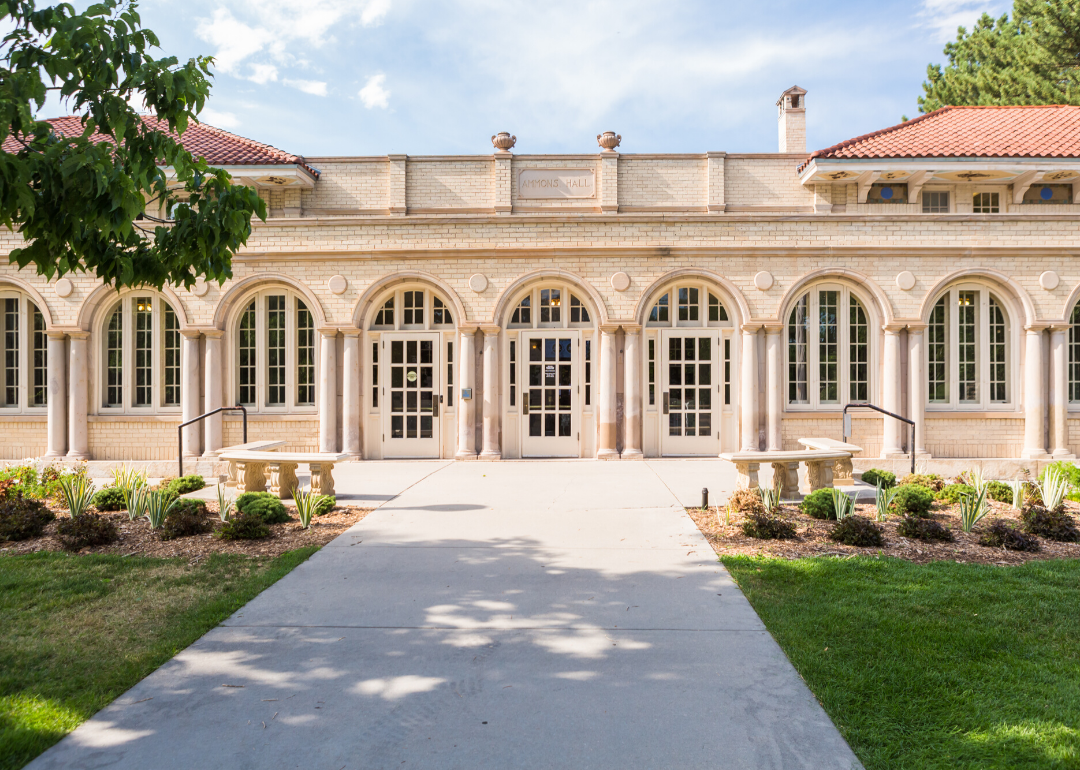
Arina P Habich // Shutterstock
#86. Colorado State University
– Location: Fort Collins, CO
– Students: 19,944
– Students to faculty ratio: 12:1
– Graduation rate: 70%
– Median earnings six years after graduation: $47,100
– Employment rate two years after graduation: 94%
Colorado State’s highly rated academic programs allow for a progressive level of study, in which students can explore their interests in a more personalized way. They have options for nearly 300 different academic programs, with an acceptance rate of 84%. CSU has been ranked as one of the top colleges for agricultural sciences, as well as one of the best colleges for culinary arts.
You may also like: Biggest HBCUs in America
Chad Robertson Media // Shutterstock
#85. Louisiana Tech University
– Location: Ruston, LA
– Students: 7,854
– Students to faculty ratio: 21:1
– Graduation rate: 61%
– Median earnings six years after graduation: $41,500
– Employment rate two years after graduation: 91%
Louisiana Tech University offers fewer degree programs than many of the other schools on our list, but this narrowing of focus allows LA Tech to ensure a truly excellent education in the handful it does provide. This excellence is demonstrated by the fact that LA Tech is the only Carnegie doctoral research university within a 200-mile radius, and by the fact that it frequently ranks as one of the top research schools per dollar spent in the country. Beyond academics, the university’s draw includes its 16 NCAA Division I sports teams, and its location in a friendly small southern town of Ruston.
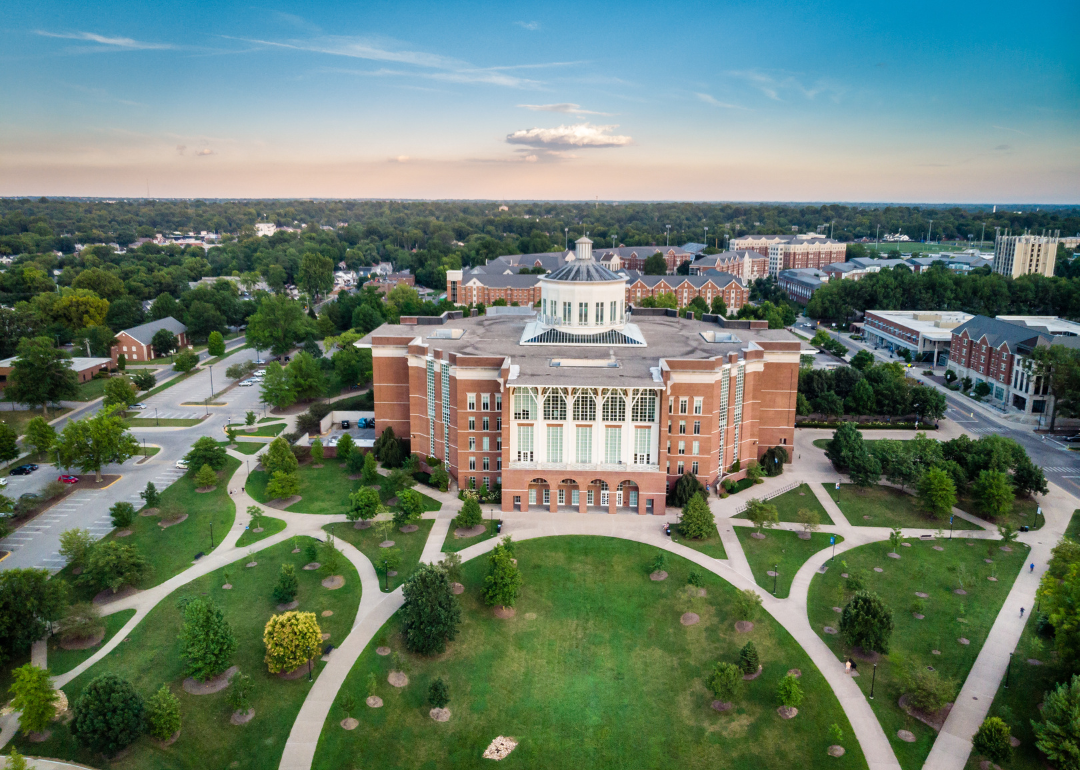
Alexey Stiop // Shutterstock
#84. University of Kentucky
An aerial view of the William T. Young Library at the University of Kentucky in Lexington.
– Location: Lexington, KY
– Students: 20,239
– Students to faculty ratio: 11:1
– Graduation rate: 66%
– Median earnings six years after graduation: $45,100
– Employment rate two years after graduation: 94%
This university, situated deep in Bluegrass country, offers more than 200 programs in 16 colleges, from medicine, nursing, and pharmacy to public policy and administration. Its College and Career Studies Program helps students with intellectual disabilities continue their learning. Lexington is called the “Horse Capital of the World,” known too for its bourbon distilleries.
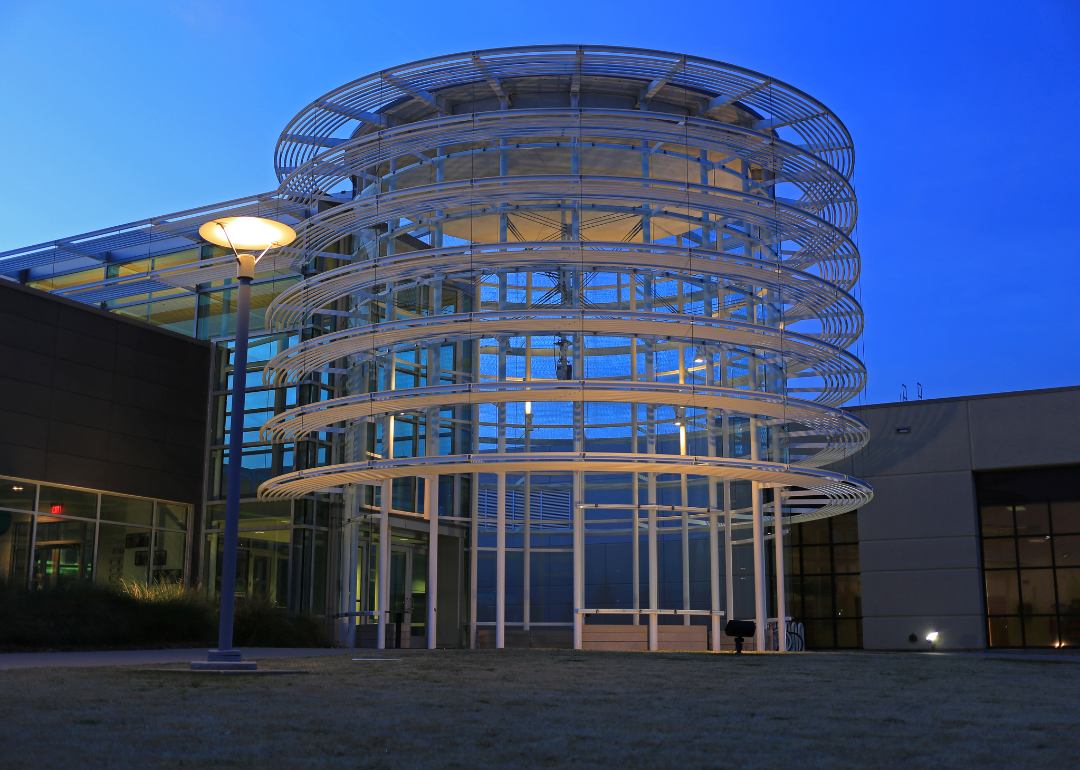
Dorti // Shutterstock
#83. University of Texas – Dallas
The UT Dallas Visitor Center as seen at night.
– Location: Richardson, TX
– Students: 17,979
– Students to faculty ratio: 19:1
– Graduation rate: 69%
– Median earnings six years after graduation: $53,100
– Employment rate two years after graduation: 91%
A public research university, UT Dallas has seven schools offering more than 140 undergraduate and graduate programs, from accounting to bioinformatics and computational biology. Its top-ranked programs are in STEM, management, liberal arts, and social sciences. It grew out of the Graduate Research Center of the Southwest, established by the founders of Texas Instruments in the 1960s as a place for advanced research and scientific training. It’s also a chess powerhouse: In 18 out of 20 years, the school’s chess team has taken part in the Final Four Collegiate Chess Tournament.

Baltimore Heritage // Wikimedia Commons
#82. University of Maryland, Baltimore County
– Location: Baltimore, MD
– Students: 9,220
– Students to faculty ratio: 14:1
– Graduation rate: 70%
– Median earnings six years after graduation: $55,000
With a student body of just over 9,000, UMBC has consistently been ranked as one of the best schools in the country, cracking the top 10 in the U.S. News & World Report more than once. Students are drawn to the school’s numerous options in undergraduate, graduate, and certificate programs, as well as its commitment to innovation, research, and community support.
Roman Babakin // Shutterstock
#81. Temple University
– Location: Philadelphia, PA
– Students: 24,915
– Students to faculty ratio: 9:1
– Graduation rate: 75%
– Median earnings six years after graduation: $50,500
– Employment rate two years after graduation: 93%
Philadelphia’s Temple University is the largest school in the city. Despite the school’s size, classes are kept small. There are more than 500 academic programs to choose from, and plenty of sports, clubs, and other extracurriculars.
You may also like: Most expensive colleges—and what students actually pay
Ken Wolter // Shutterstock
#80. University of Louisville
– Location: Louisville, KY
– Students: 11,598
– Students to faculty ratio: 9:1
– Graduation rate: 60%
– Median earnings six years after graduation: $41,800
– Employment rate two years after graduation: 93%
The University of Louisville prides itself on the flexibility it provides for its students. With three campuses, a robust catalog of online classes, and several accelerated bachelor’s degree programs, the school quite literally meets students wherever they are. The ever-growing student body, which currently sits at around 23,000 (including both undergraduate and graduate students) can choose to study in one of the university’s 12 schools and colleges, which include nursing, dental, and medical programs.
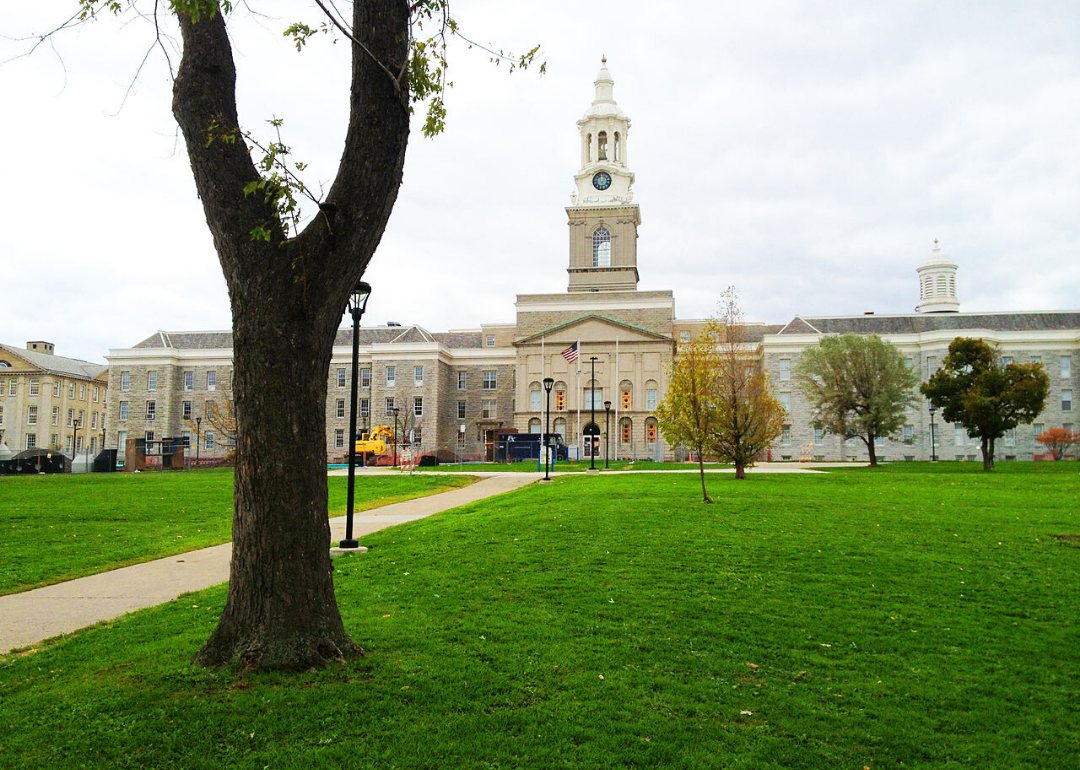
Davidhar // Wikimedia Commons
#79. University at Buffalo, SUNY
– Location: Buffalo, NY
– Students: 20,435
– Students to faculty ratio: 11:1
– Graduation rate: 75%
– Median earnings six years after graduation: $52,600
– Employment rate two years after graduation: 94%
University at Buffalo, SUNY, has more than 20,000 students and a multitude of undergraduate, graduate, and doctoral programs. It has been named the #1 public school in New York State by the Wall Street Journal and made Niche’s top 100 for Best Big Colleges in America. Popular majors include business, psychology, and communications.

Professorcornbread // Wikimedia Commons
#78. CUNY John Jay College of Criminal Justice
The exterior of John Jay College of Criminal Justice as seen from the plaza.
– Location: New York, NY
– Students: 11,270
– Students to faculty ratio: 19:1
– Graduation rate: 51%
– Median earnings six years after graduation: $44,900
– Employment rate two years after graduation: 90%
Part of the CUNY university system, John Jay College of Criminal Justice was founded in 1964 and is one of the most renowned criminology schools in the country. Among the most popular majors are as follows: criminal justice, forensic psychology, public administration, criminology, computer science and information security, and law and society. The public college began as a police science program created in the mid-1950s as police work became more complicated. It is named after the first chief justice of the U.S. Supreme Court, John Jay, who also was a governor of New York.
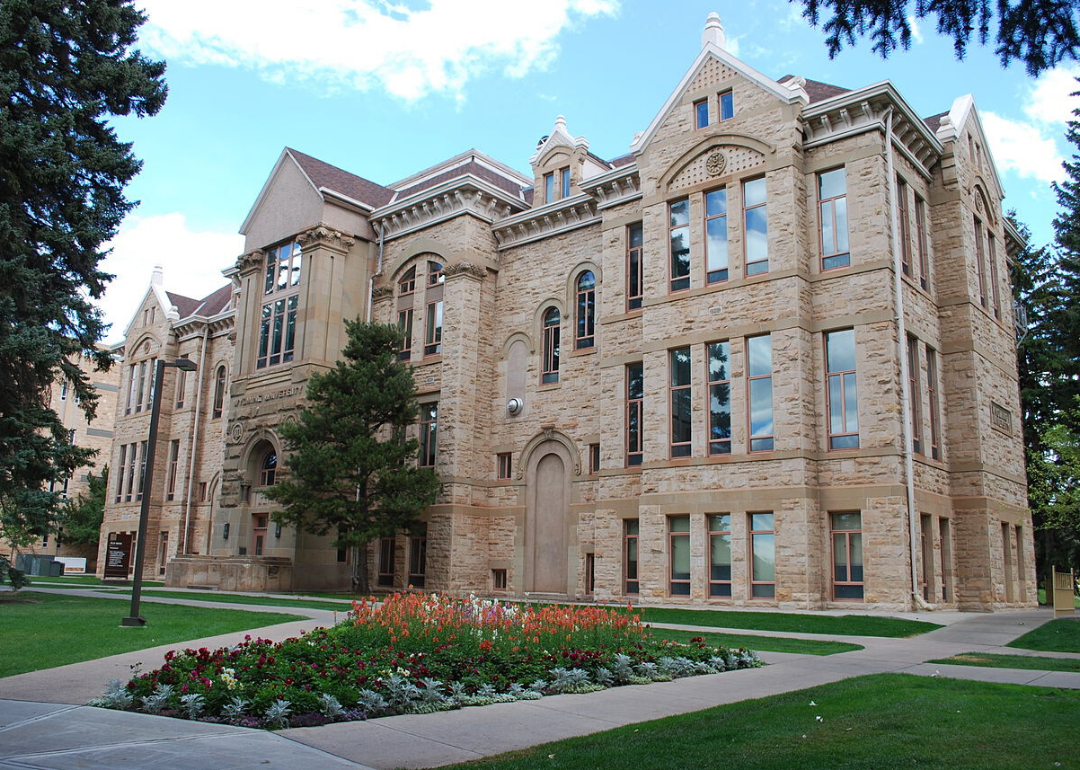
Thecoldmidwest // Wikimedia Commons
#77. University of Wyoming
– Location: Laramie, WY
– Students: 7,783
– Students to faculty ratio: 12:1
– Graduation rate: 59%
– Median earnings six years after graduation: $47,300
– Employment rate two years after graduation: 93%
The University of Wyoming, located in Laramie, offers more than 200 areas of study and a 12:1 student-faculty ratio for a more intimate learning environment. Popular majors include nursing, psychology, and education, and the school awards an average of $8,957 in student aid per year. Students who attend UW mention affordability, research opportunities, and small class sizes as some of the things that make this school top-notch.
Amehime // Shutterstock
#76. Washington State University
– Location: Pullman, WA
– Students: 22,315
– Students to faculty ratio: 16:1
– Graduation rate: 59%
– Median earnings six years after graduation: $50,600
– Employment rate two years after graduation: 92%
Located in beautiful Pullman, Washington, WSU has been ranked as having some of the best college professors in America, as well as making Forbes’ list for best value colleges. The school has more than 98 majors, with research opportunities and internships available to help students move forward in their potential careers.
You may also like: 30 college majors that didn’t exist 50 years ago
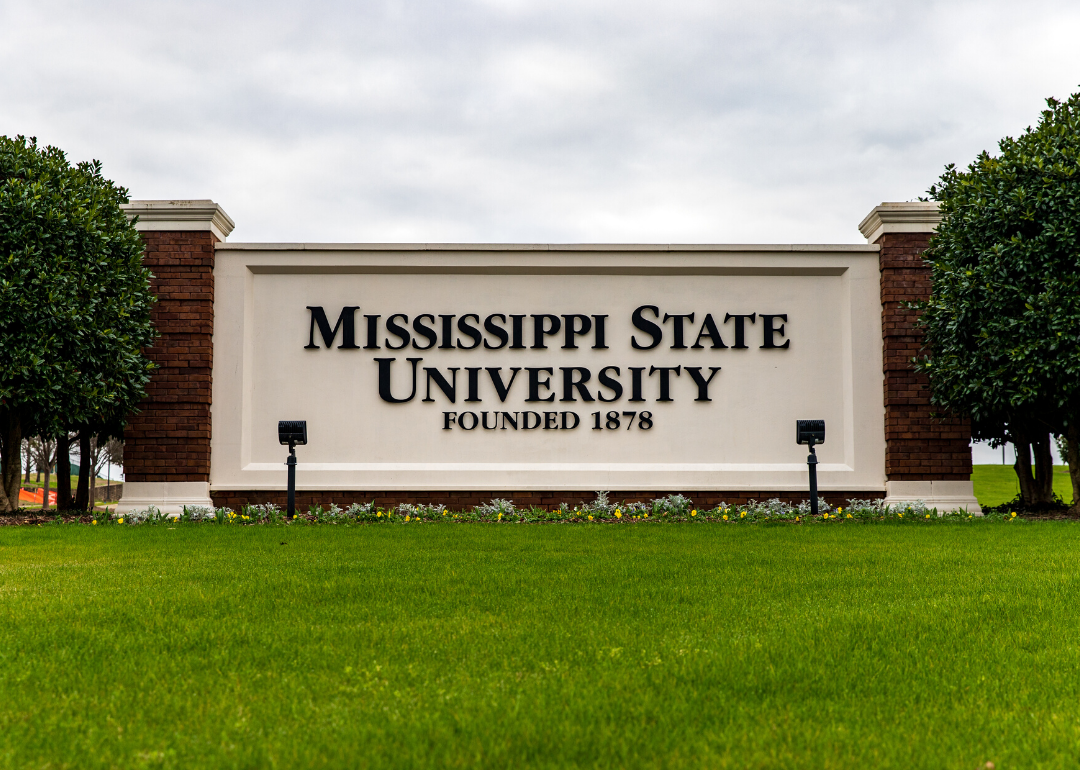
C5 Media // Shutterstock
#75. Mississippi State University
– Location: Mississippi State, MS
– Students: 17,089
– Students to faculty ratio: 17:1
– Graduation rate: 64%
– Median earnings six years after graduation: $40,200
– Employment rate two years after graduation: 92%
Mississippi State University has an enrollment of more than 17,000 full-time students. It’s also an NCAA Division I school, so athletic events tend to be embedded in campus life, along with fraternities and sororities, clubs, and other student organizations. Average tuition cost comes in around $16,000 per year, with the school awarding an average of more than $12,000 in financial aid.

Travel Bug // Shutterstock
#74. Virginia Military Institute
– Location: Lexington, VA
– Students: 1,698
– Students to faculty ratio: 11:1
– Graduation rate: 85%
– Median earnings six years after graduation: $65,700
– Employment rate two years after graduation: 97%
This public college is small, with just over 1,600 full-time students, which makes for an excellent student-faculty ratio. Faculty regularly partners with student cadets on research projects. VMI was also ranked as one of the Best Value Colleges in America, and Best Liberal Arts Colleges in America.

Sadads // Wikimedia Commons
#73. South Dakota School of Mines & Technology
– Location: Rapid City, SD
– Students: 2,163
– Students to faculty ratio: 13:1
– Graduation rate: 50%
– Median earnings six years after graduation: $56,500
– Employment rate two years after graduation: 94%
This highly rated university is a STEM school, focusing on science, technology, engineering, and mathematics. It offers 20 science and engineering majors and 22 minors. In addition to being rated as one of the best public colleges in America, the school also made the top 100 in Niche’s rankings of Best Small Colleges in America. What’s more, it was ranked the #1 college in South Dakota.
Atomic Energy505 // Wikimedia Commons
#72. New Mexico Tech
– Location: Socorro, NM
– Students: 1,103
– Students to faculty ratio: 8:1
– Graduation rate: 54%
– Median earnings six years after graduation: $50,000
– Employment rate two years after graduation: 90%
Ranked by Niche as the #1 college in New Mexico, NM Tech has a small enrollment of just over 1,100 full-time students and maintains an 8:1 student-faculty ratio. The school is known for its educational opportunities in biology, chemistry, and chemical engineering, and is ranked among the top 10 Hispanic-serving Institutions in America.
Kzollman // Wikimedia Commons
#71. Kansas State University
– Location: Manhattan, KS
– Students: 14,497
– Students to faculty ratio: 14:1
– Graduation rate: 68%
– Median earnings six years after graduation: $45,600
– Employment rate two years after graduation: 94%
In addition to its ranking as one of the Best Public Colleges in America, Kansas State is also ranked #11 for Best Colleges for Agricultural Sciences in America, so it’s no surprise that animal sciences is one of the school’s most popular majors. Attending students score the school as “very good,” naming the educational opportunities, helpful advisers and professors, and exceptional campus amenities as some of the university’s high points.
You may also like: 25 oldest colleges in America
Ken Wolter // Shutterstock
#70. San Diego State University
– Location: San Diego, CA
– Students: 28,084
– Students to faculty ratio: 23:1
– Graduation rate: 76%
– Median earnings six years after graduation: $51,000
– Employment rate two years after graduation: 92%
San Diego State is a larger school, with an enrollment of more than 28,000 students. Students attending SDSU can choose from nearly 200 different degree programs, and enjoy a variety of extracurricular activities, including sports, clubs, and Greek life. Popular majors include business, psychology, and liberal arts.

Sopotnicki // Shutterstock
#69. University of Colorado Boulder
The entrance sign for the University of Colorado Boulder.
– Location: Boulder, CO
– Students: 27,703
– Students to faculty ratio: 14:1
– Graduation rate: 72%
– Median earnings six years after graduation: $50,800
– Employment rate two years after graduation: 92%
One of 35 public research schools that belong to the Association of American Universities, the University of Colorado Boulder offers more than 90 degree programs. Its alumni include five Nobel laureates, nine MacArthur Fellows, and three U.S. Supreme Court justices. It is the top university recipient of NASA astrophysics technology grants.
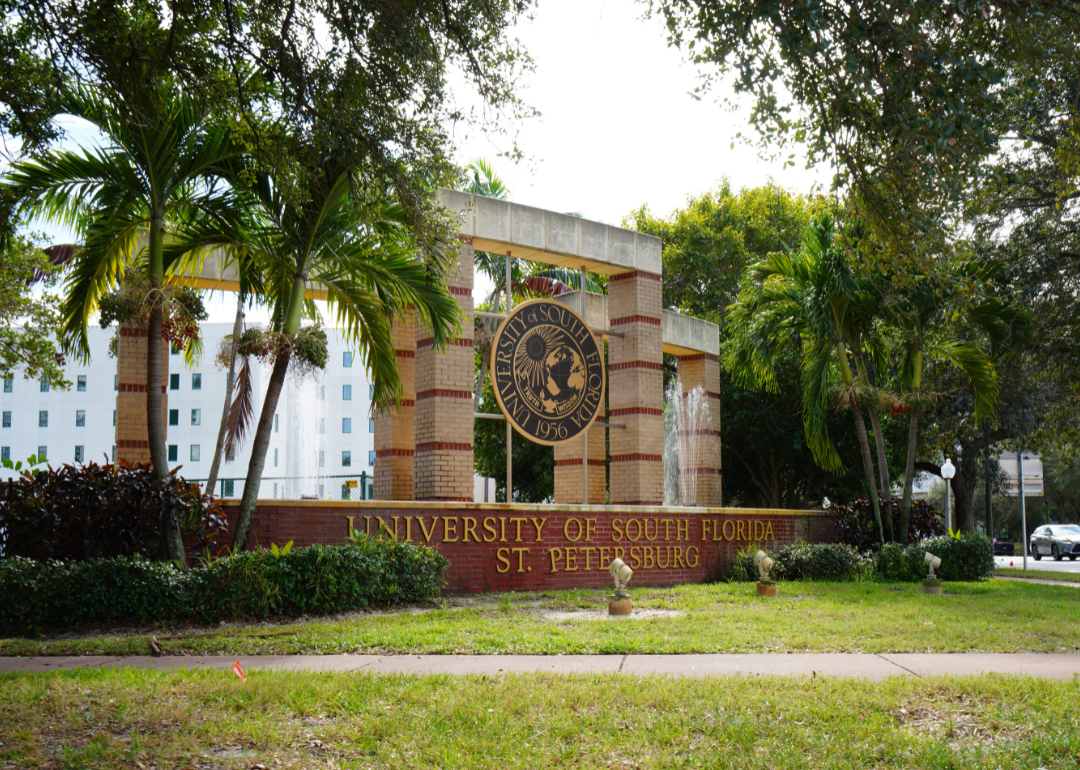
EQRoy // Shutterstock
#68. University of South Florida – St. Petersburg
A sign at the entrance of the campus of the University of South Florida – St. Petersburg.
– Location: St. Petersburg, FL
– Students: 2,570
– Students to faculty ratio: 16:1
– Graduation rate: 44%
– Median earnings six years after graduation: $43,500
– Employment rate two years after graduation: 91%
This campus of the University of South Florida is on 52 acres on the waterfront in downtown St. Petersburg, the “Sunshine City.” Students have the opportunity for hands-on experience whether in biology or business, preparing them for jobs or graduate studies. A program for first-year students named Innovation Scholars pairs them with mentors from St. Petersburg businesses. The school is close to museums, restaurants, and other attractions in the city.
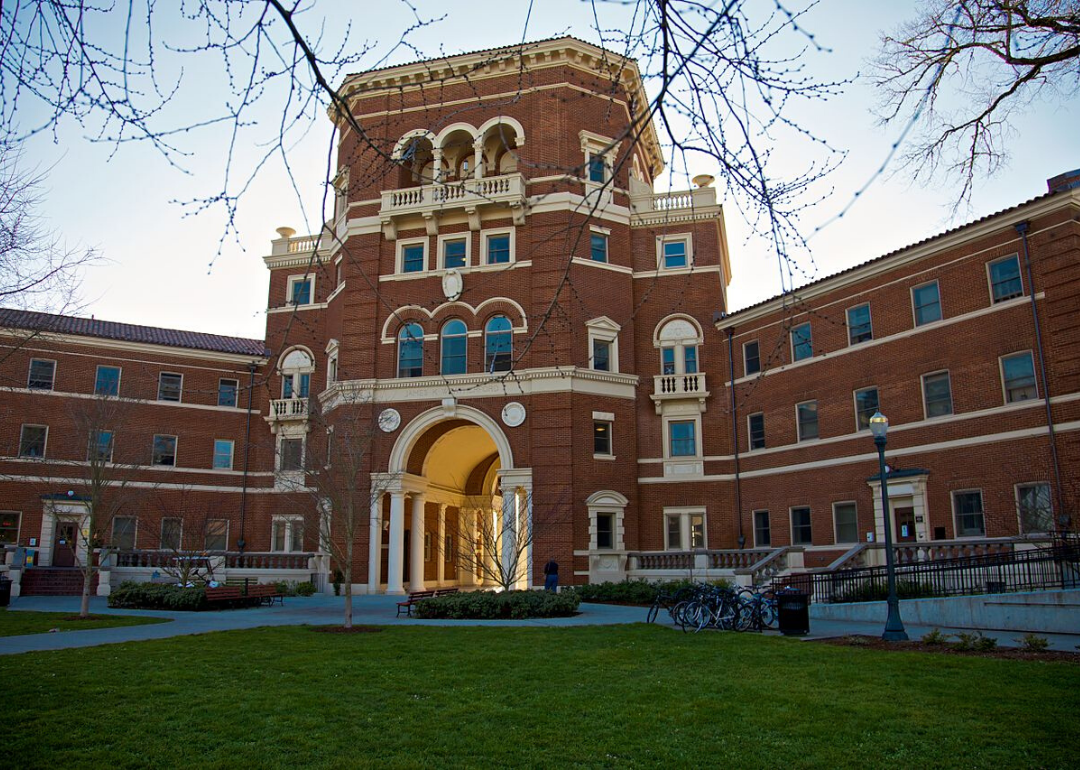
Gregkeene // Wikimedia Commons
#67. Oregon State University
– Location: Corvallis, OR
– Students: 18,496
– Students to faculty ratio: 15:1
– Graduation rate: 69%
– Median earnings six years after graduation: $49,600
– Employment rate two years after graduation: 92%
Oregon’s largest college, OSU is located in Corvallis, with an enrollment of just under 19,000 students. The school has some of the most highly rated degree programs in the country, and its forestry and oceanography programs are among the most highly respected in the world. Students attending OSU cite excellent support from advisers and professors, as well as comprehensive online classes, as some of the main benefits. Niche also ranked OSU the top online school.
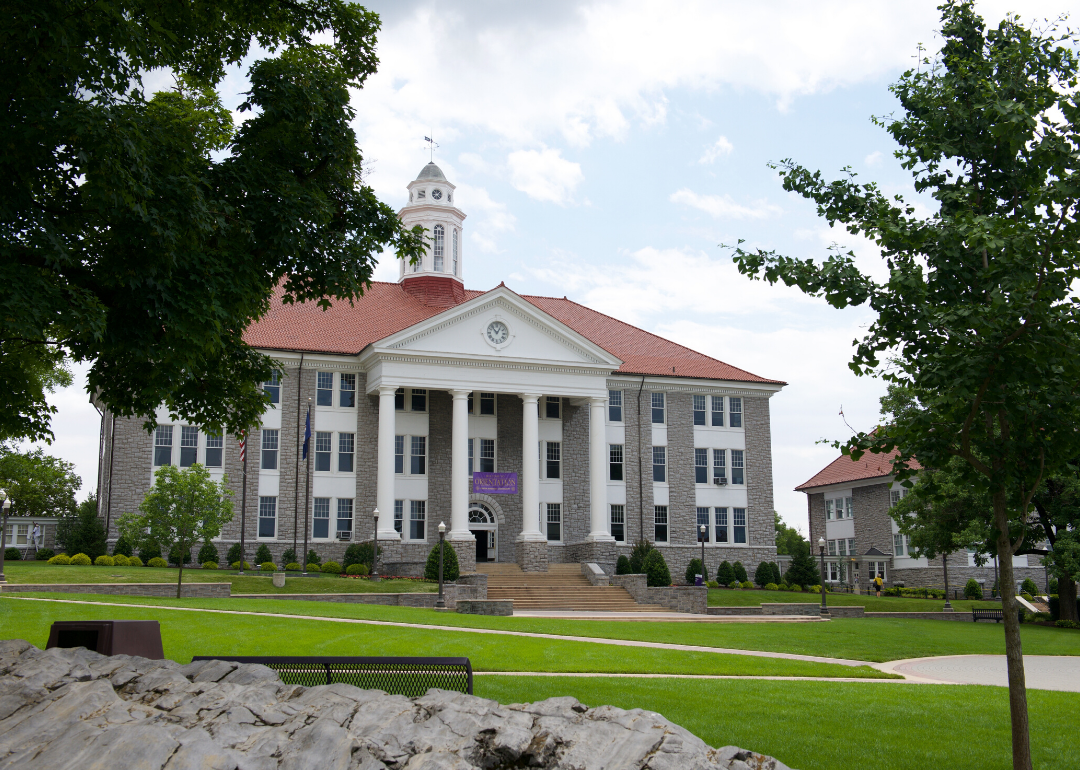
ThePhotosite // Shutterstock
#66. James Madison University
– Location: Harrisonburg, VA
– Students: 18,673
– Students to faculty ratio: 16:1
– Graduation rate: 82%
– Median earnings six years after graduation: $56,600
– Employment rate two years after graduation: 96%
JMU has a sizable community with close to 19,000 students. Students have 139 degrees to choose from, and more than 80% of the undergraduates attending JMU participate in research programs, internships, or practicums. The college also recently earned the Carnegie Commission Classification of R2 Doctoral University with high research activity.
You may also like: What American education was like 100 years ago
EQRoy // Shutterstock
#65. University of Arizona
– Location: Tucson, AZ
– Students: 28,556
– Students to faculty ratio: 14:1
– Graduation rate: 65%
– Median earnings six years after graduation: $47,300
– Employment rate two years after graduation: 92%
Ranked second for Best Colleges in Arizona, U of A has a lot to offer prospective students. There are multiple degree programs to choose from, as well as clubs, athletics, and Greek life. The school is located in the picturesque city of Tucson, which has been rated as one of America’s most bikeable large cities, and one of the best cities for outdoor living.
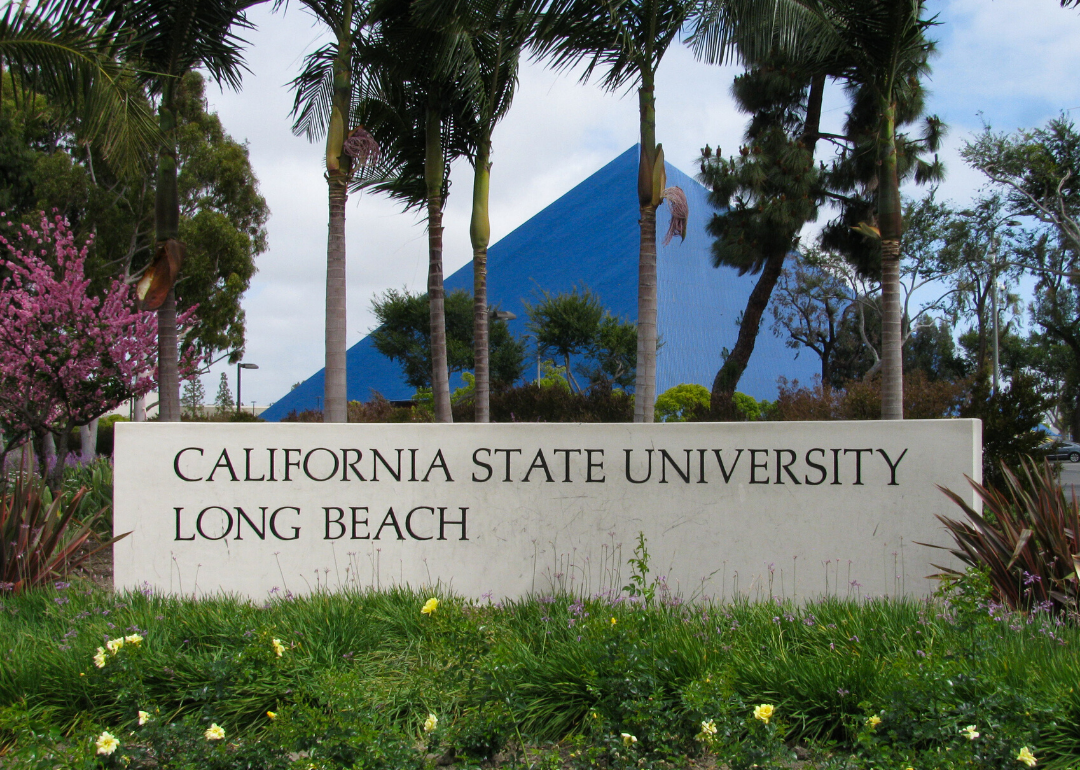
Underawesternsky // Shutterstock
#64. California State University – Long Beach
– Location: Long Beach, CA
– Students: 29,110
– Students to faculty ratio: 21:1
– Graduation rate: 73%
– Median earnings six years after graduation: $48,100
– Employment rate two years after graduation: 92%
Cal State Long Beach sits on 332 acres of land, in proximity to both the city and the beach. Students enjoy a high level of diversity, more than 80 different majors to choose from, plus multiple clubs and extracurricular activities.
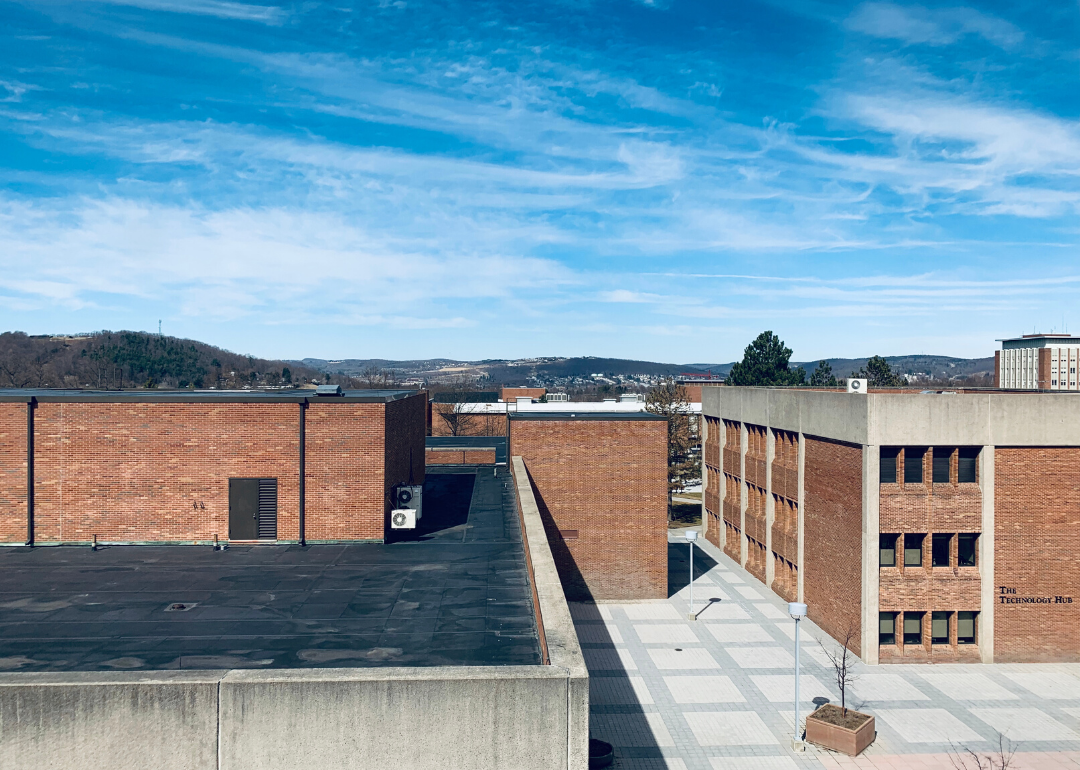
Yagna Theja Daggupati // Shutterstock
#63. Binghamton University, SUNY
– Location: Vestal, NY
– Students: 13,889
– Students to faculty ratio: 17:1
– Graduation rate: 82%
– Median earnings six years after graduation: $61,600
– Employment rate two years after graduation: 92%
This New York university has a fairly substantial enrollment of more than 13,000 students and an acceptance rate of 43%. Approximately 76% of attending students receive financial aid. The most popular majors include economics, psychology, and neuroscience. The school’s president announced the allocation of $1.5 million in endowment funds to create the George Floyd Scholarship for Social Change, as well as increasing its Clifford D. Clark Diversity Fellowship by $200,000 annually.
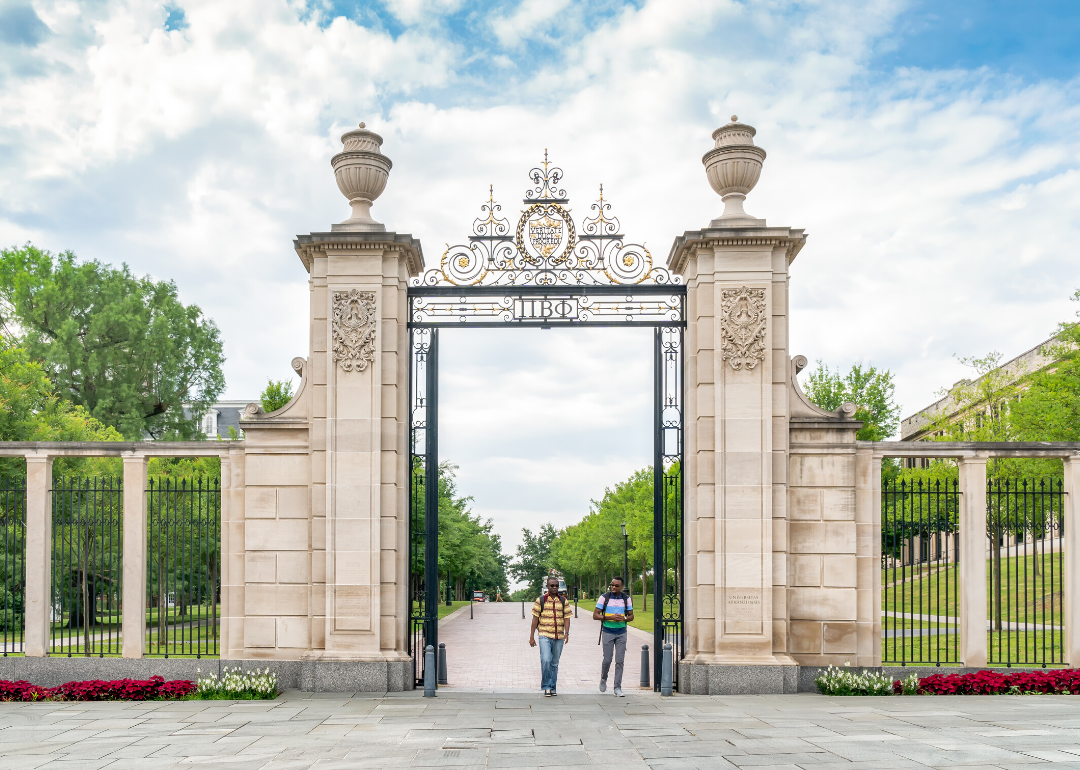
Ken Wolter // Shutterstock
#62. University of Arkansas
– Location: Fayetteville, AR
– Students: 20,252
– Students to faculty ratio: 16:1
– Graduation rate: 68%
– Median earnings six years after graduation: $44,900
– Employment rate two years after graduation: 92%
The University of Arkansas is considered a top research and educational facility, with more than 200 academic programs within 10 different colleges. Tuition averages just over $16,000 a year, and 87% of students receive financial aid. U of A students rate this school as “very good,” and say they enjoy top-of-the-line professors, great services and amenities, and a beautiful campus.
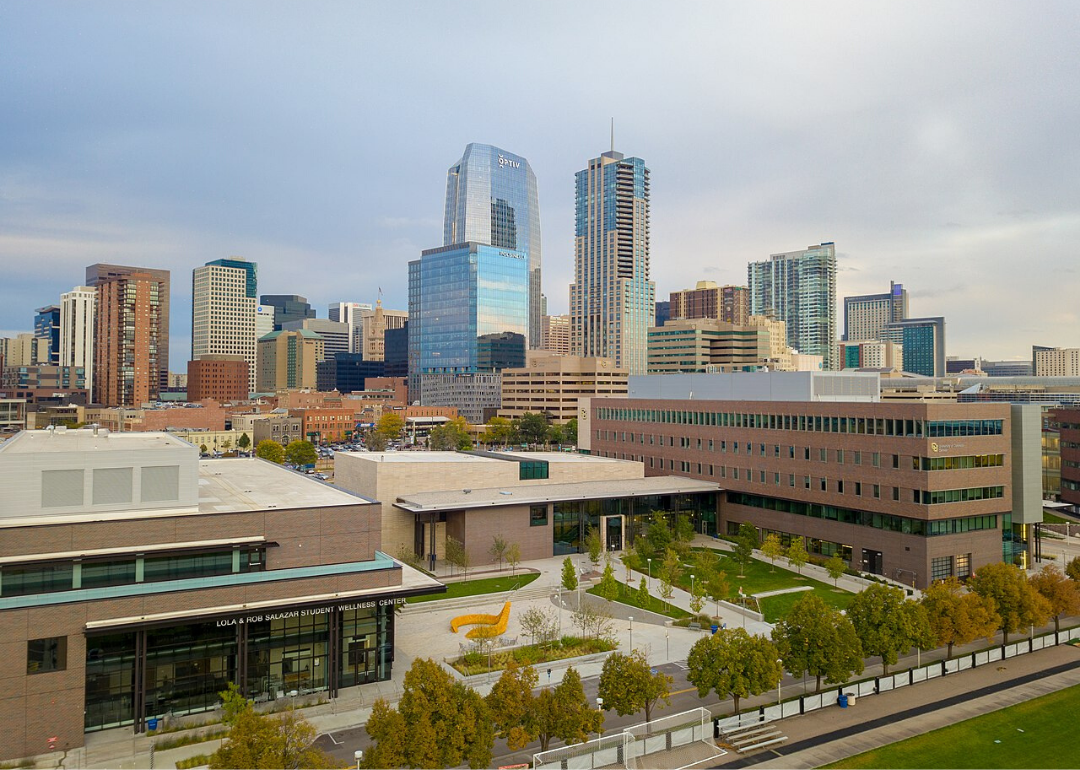
Nove1986 // Wikimedia Commons
#61. University of Colorado Denver
– Location: Denver, CO
– Students: 8,622
– Students to faculty ratio: 2:1
– Graduation rate: 44%
– Median earnings six years after graduation: $56,400
– Employment rate two years after graduation: 90%
Located in downtown Denver, UC Denver provides an urban experience that combines education with the culture and excitement of the city. The school offers a variety of bachelor’s, master’s, doctorate, and certificate programs. Popular majors include business, nursing, and biology.
You may also like: Best private colleges in America
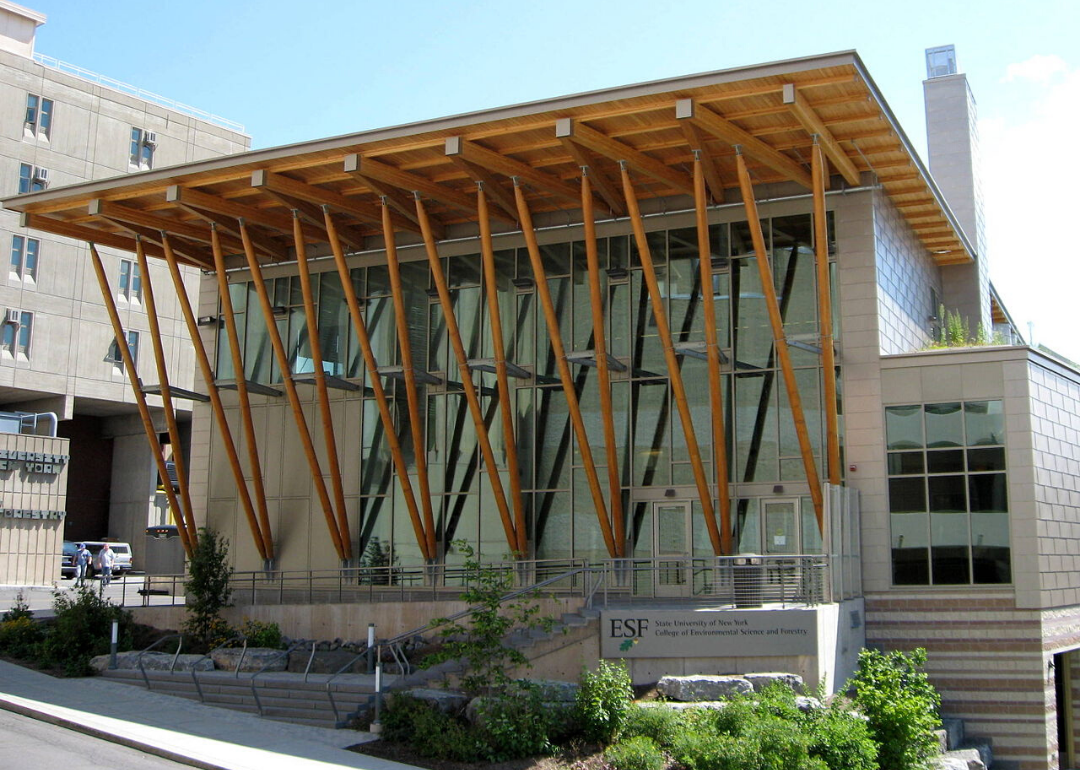
DASonnenfeld // Wikimedia Commons
#60. SUNY College of Environmental Science & Forestry
– Location: Syracuse, NY
– Students: 1,625
– Students to faculty ratio: 12:1
– Graduation rate: 77%
– Median earnings six years after graduation: $45,600
– Employment rate two years after graduation: 94%
This Syracuse school’s most popular degree programs include ecology and evolutionary biology, natural resources conservation, and environmental science. The school was also named as one of the top green colleges by The Princeton Review.
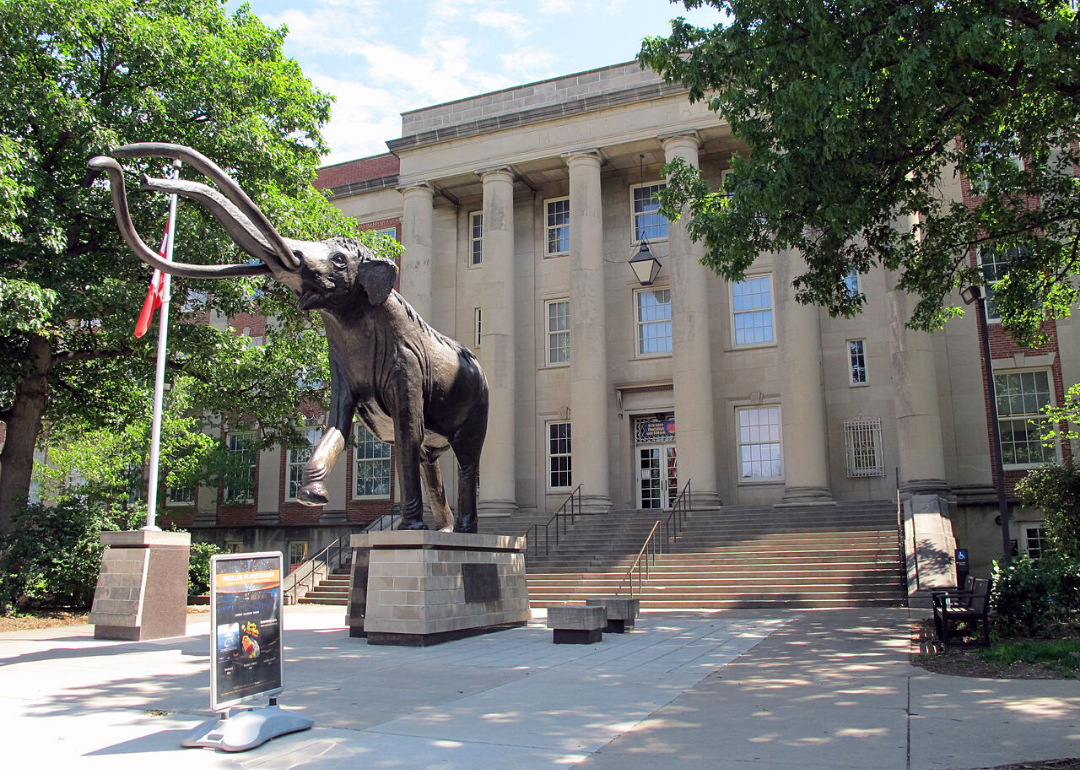
Hanyou23 // Wikimedia Commons
#59. University of Nebraska – Lincoln
– Location: Lincoln, NE
– Students: 18,949
– Students to faculty ratio: 14:1
– Graduation rate: 66%
– Median earnings six years after graduation: $46,400
– Employment rate two years after graduation: 96%
Established in 1869, the University of Nebraska at Lincoln is a member of the Big Ten Conference and the Big Ten Academic Alliance. This well-established school has been ranked in the top 50 for Best Colleges for Agricultural Sciences in America. The campus sprawls across more than 800 acres, and students can enjoy the active Greek life, sporting events, and clubs for nearly every interest.
Travel_with_me // Shutterstock
#58. The University of Alabama
– Location: Tuscaloosa, AL
– Students: 27,750
– Students to faculty ratio: 17:1
– Graduation rate: 72%
– Median earnings six years after graduation: $44,500
– Employment rate two years after graduation: 93%
The University of Alabama was founded in 1831 and was the state’s first public college. Students have nearly 200-degree programs to choose from, and there are more than 600 student organizations and clubs, as well as myriad volunteer and internship opportunities. The campus encompasses 1,200 beautifully cultivated acres, with greenery all around, and nearby Tuscaloosa offers dining, shopping, and outdoor activities.
Sean Pavone // Shutterstock
#57. University of Missouri
– Location: Columbia, MO
– Students: 21,344
– Students to faculty ratio: 10:1
– Graduation rate: 73%
– Median earnings six years after graduation: $48,300
– Employment rate two years after graduation: 95%
Highly ranked among Best Greek Life Colleges in America, the U of M campus has a very active Greek life and loads of sporting activities to participate in or attend. Students can choose from more than 90 undergraduate programs, 150 graduate programs, and 85 online degrees and certificates. Popular majors include minority and ethnic studies, business, and health service preparatory studies. The school offers hands-on learning as part of some areas of study, plus entrepreneurship programs and a study abroad program.

Chad Robertson Media // Shutterstock
#56. The University of Kansas
An entrance sign to The University of Kansas.
– Location: Lawrence, KS
– Students: 16,439
– Students to faculty ratio: 7:1
– Graduation rate: 63%
– Median earnings six years after graduation: $48,800
– Employment rate two years after graduation: 94%
The University of Kansas was founded in 1865 and opened to its first class of students the following year in an unfinished building. It now has five campuses, three of them medical branches, and the original treeless ridge is its wooded main campus in Lawrence, a comprehensive research and teaching school. It is the only state university in Kansas that is a member of the respected Association of American Universities.
You may also like: College majors that earn the most money

Claudine Van Massenhove // Shutterstock
#55. California Polytechnic State University (Cal Poly) – San Luis Obispo
A sign and building at California Polytechnic State University – San Luis Obispo.
– Location: San Luis Obispo, CA
– Students: 19,925
– Students to faculty ratio: 20:1
– Graduation rate: 83%
– Median earnings six years after graduation: $66,900
– Employment rate two years after graduation: 95%
Cal Poly encourages its students to “learn by doing,” an approach that it says has set it apart from other universities since its founding in 1901. By giving students real-world experience, Cal Poly allows them to apply what they have learned in projects ranging from exploring space—it has graduated four astronauts—to looking for solutions to climate change. The university’s six colleges offer more than 60 majors.
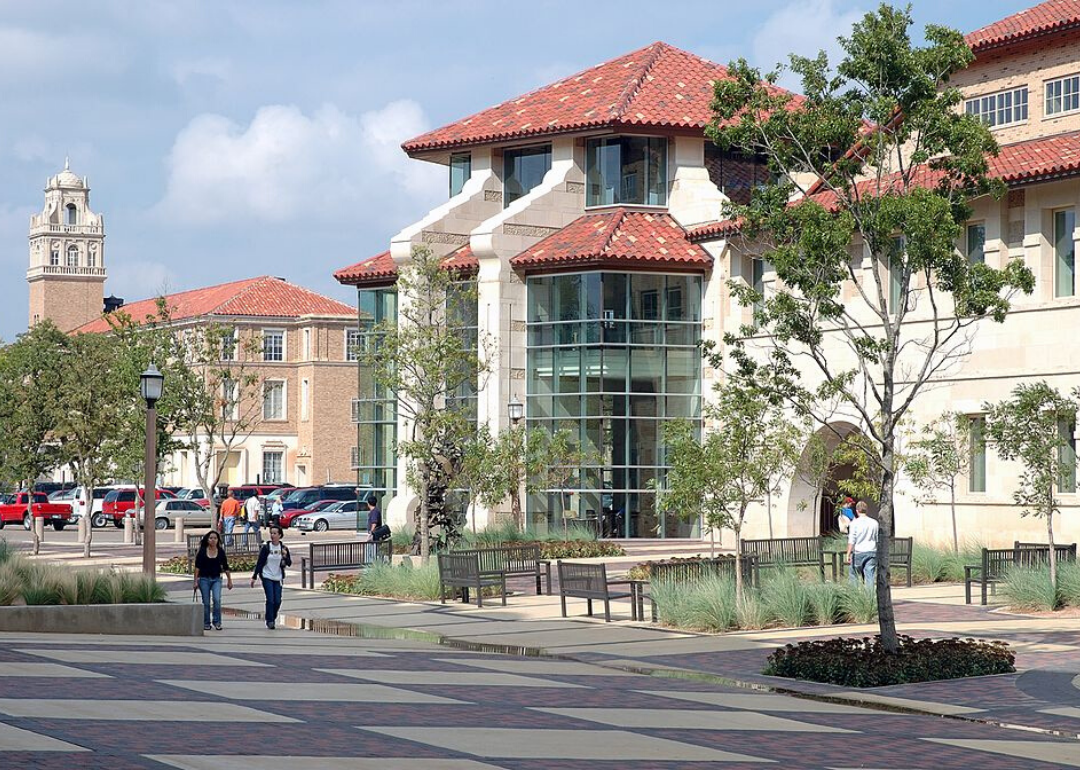
Holzman Moss Bottino Architecture // Wikimedia Commons
#54. Texas Tech University
– Location: Lubbock, TX
– Students: 29,010
– Students to faculty ratio: 16:1
– Graduation rate: 63%
– Median earnings six years after graduation: $51,400
– Employment rate two years after graduation: 93%
Located in the city of Lubbock, Texas Tech is a public research university founded in 1923. It offers more than 150 areas of study, alongside more than 550 different clubs and extracurriculars. The school is also ranked as one of the best for agricultural sciences and for kinesiology and physical therapy programs.

Daderot // Wikimedia Commons
#53. University of Connecticut
– Location: Storrs, CT
– Students: 18,090
– Students to faculty ratio: 8:1
– Graduation rate: 83%
– Median earnings six years after graduation: $58,400
– Employment rate two years after graduation: 95%
UConn was founded in 1881 and has four other regional campuses in the state. The school offers 120 majors and 92 research and professional fields of study, with a total of 14 schools and colleges. Students who attend UConn have the added bonus of more than 700 different clubs and organizations to choose from, as well as five cultural centers.
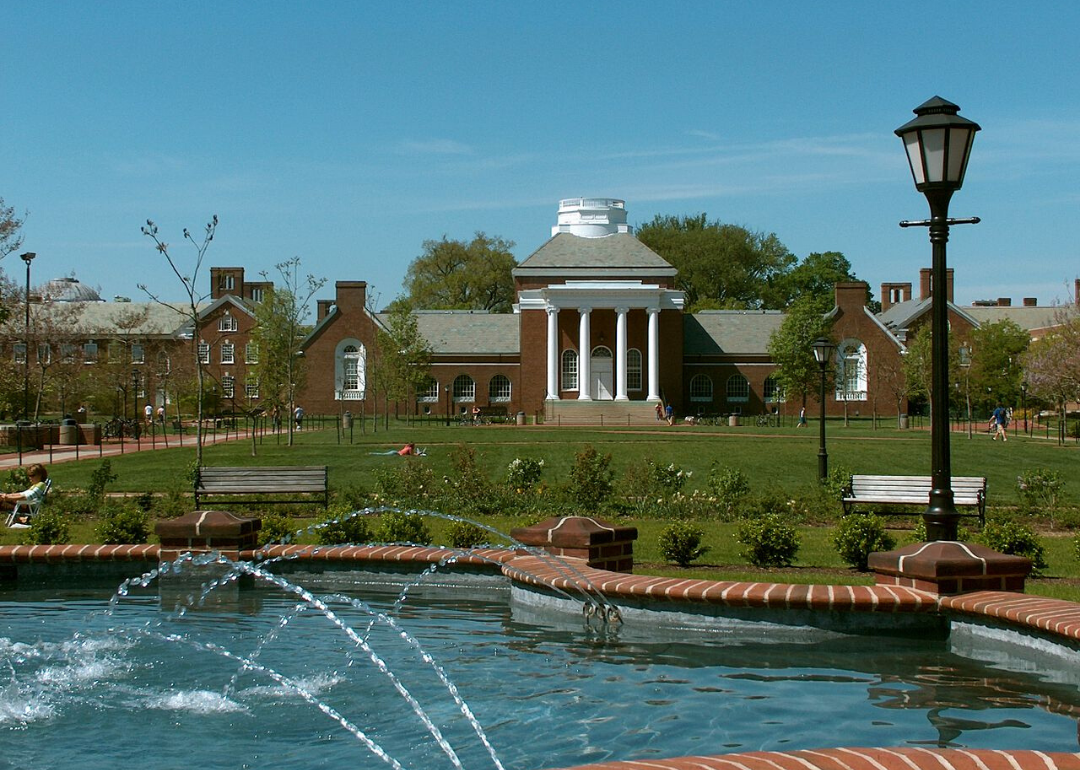
Cargoudel // Wikimedia Commons
#52. University of Delaware
– Location: Newark, DE
– Students: 17,912
– Students to faculty ratio: 14:1
– Graduation rate: 82%
– Median earnings six years after graduation: $57,000
– Employment rate two years after graduation: 96%
Popular areas of study at the University of Delaware include finance and marketing, and the school is highly ranked by Niche for Best Colleges for Kinesiology and Physical Therapy in America. The campus also has a variety of clubs and organizations for students to participate in, as well as intercollegiate athletics, arts, and cultural activities.
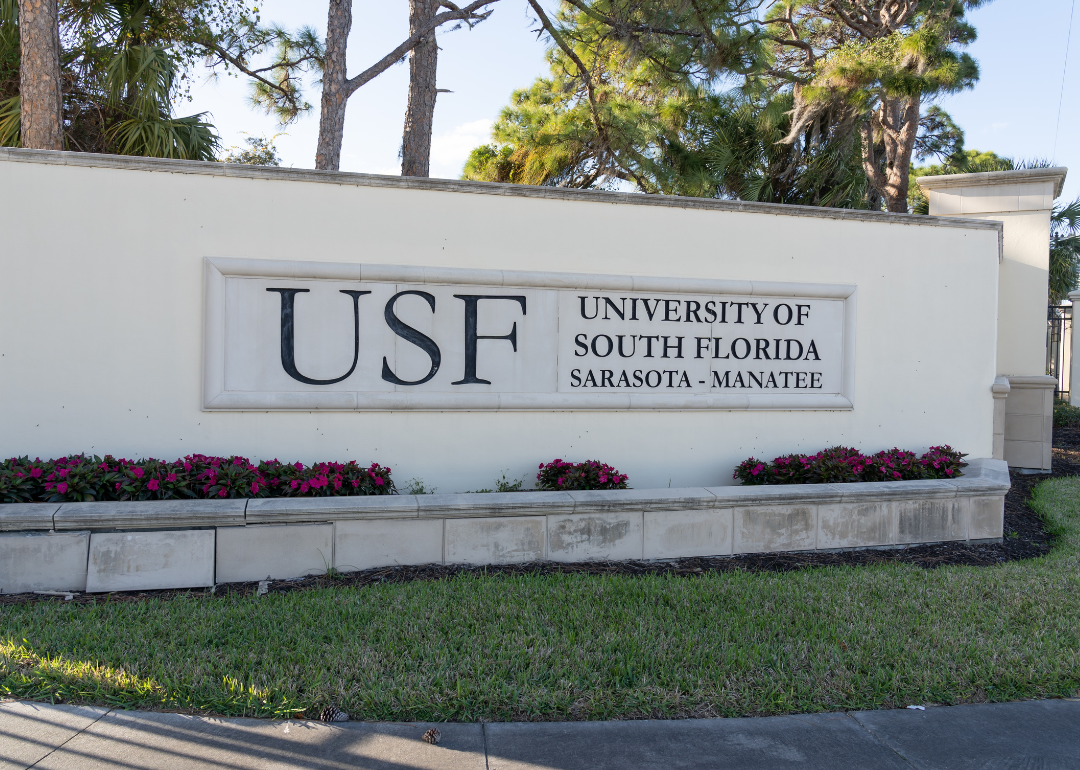
JHVEPhoto // Shutterstock
#51. University of South Florida – Sarasota-Manatee
An entrance sign for the University of South Florida – Sarasota-Manatee.
– Location: Sarasota, FL
– Students: 958
– Students to faculty ratio: 12:1
– Graduation rate: 47%
– Median earnings six years after graduation: $43,500
– Employment rate two years after graduation: 91%
This Gulf Coast campus is within driving distance of Tampa, St. Petersburg, Orlando, and Miami. Students can choose from more than 400 internships and research positions, and more than 30 clubs and organizations. In addition to its wide range of undergraduate and graduate programs, it offers experiential learning through partnerships and off-site centers.
You may also like: How diverse are the 10 most selective universities?
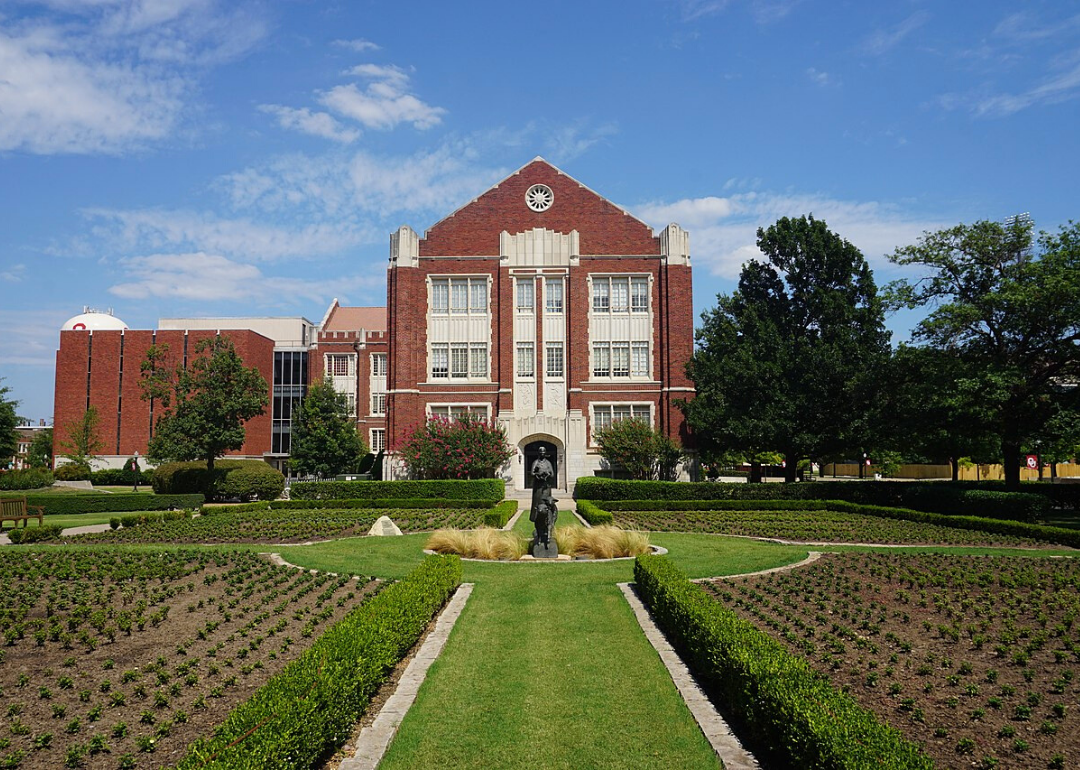
Michael Barera // Wikimedia Commons
#50. University of Oklahoma
– Location: Norman, OK
– Students: 18,564
– Students to faculty ratio: 14:1
– Graduation rate: 72%
– Median earnings six years after graduation: $51,100
– Employment rate two years after graduation: 93%
Founded in 1890, the University of Oklahoma is located in the town of Norman, not far from Oklahoma City. The school offers 170 different majors, and in addition to three campuses in Oklahoma, has centers in Italy, Mexico, and Brazil. The university also has a strong athletic program, and it has been ranked #4 for Best College Athletics in America and in the top 50 for Best Colleges for Student Athletes in America.

Ken Wolter // Shutterstock
#49. University of South Carolina
– Location: Columbia, SC
– Students: 26,174
– Students to faculty ratio: 14:1
– Graduation rate: 78%
– Median earnings six years after graduation: $44,900
– Employment rate two years after graduation: 95%
This NCAA Division I school is big on athletics, ranking in the top 25 for Best College Athletics in America and #11 for Best College for Sports Management. Students can choose from 300 majors, with the most being finance, marketing, and business.
Katherine Welles // Shutterstock
#48. Auburn University
– Location: Auburn, AL
– Students: 22,458
– Students to faculty ratio: 15:1
– Graduation rate: 79%
– Median earnings six years after graduation: $48,800
– Employment rate two years after graduation: 95%
Auburn University is considered one of Alabama’s top schools, with a wide variety of majors, as well as clubs and student organizations and a highly rated athletic program. In addition to the opportunities afforded by the university, the city of Auburn itself has beautiful parks, professional sporting events, concerts, and cultural events. AU was also ranked in the top 50 for Colleges with the Best Student Life in America.
Feng Cheng // Shutterstock
#47. University of Mississippi
– Location: University, MS
– Students: 15,485
– Students to faculty ratio: 8:1
– Graduation rate: 67%
– Median earnings six years after graduation: $42,700
– Employment rate two years after graduation: 92%
Greek life is a big part of the social scene at Ole Miss, with the school earning a #3 ranking for Best Greek Life Colleges in America. It offers a variety of degrees, including an accountancy school, as well as numerous national research centers. The school also boasts a designation as R1: Doctoral Universities – Highest Research Activity by the Carnegie Classification.
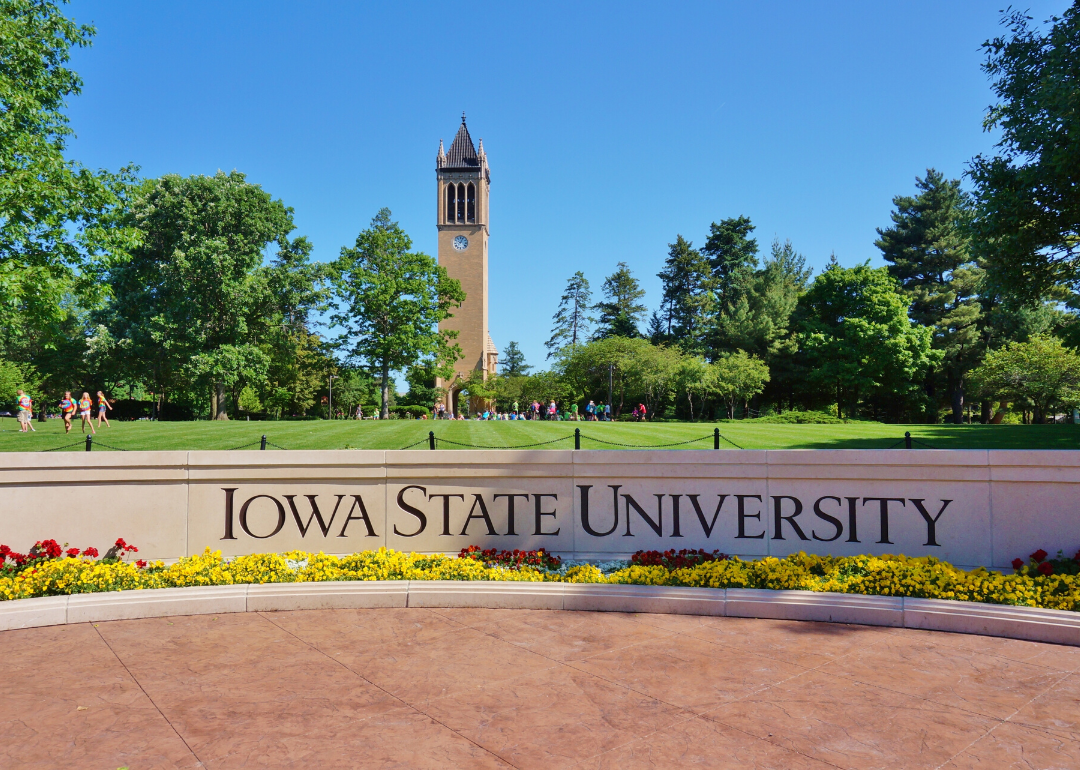
EQRoy // Shutterstock
#46. Iowa State University
– Location: Ames, IA
– Students: 24,461
– Students to faculty ratio: 15:1
– Graduation rate: 75%
– Median earnings six years after graduation: $50,700
– Employment rate two years after graduation: 96%
Iowa State was founded in 1858. Its most popular undergraduate majors include agriculture, biological and biomedical sciences, education, engineering, and marketing. Students can also participate in more than 800 student organizations, internships, research programs, and study abroad programs.
You may also like: 25 of the best TV shows set in high school
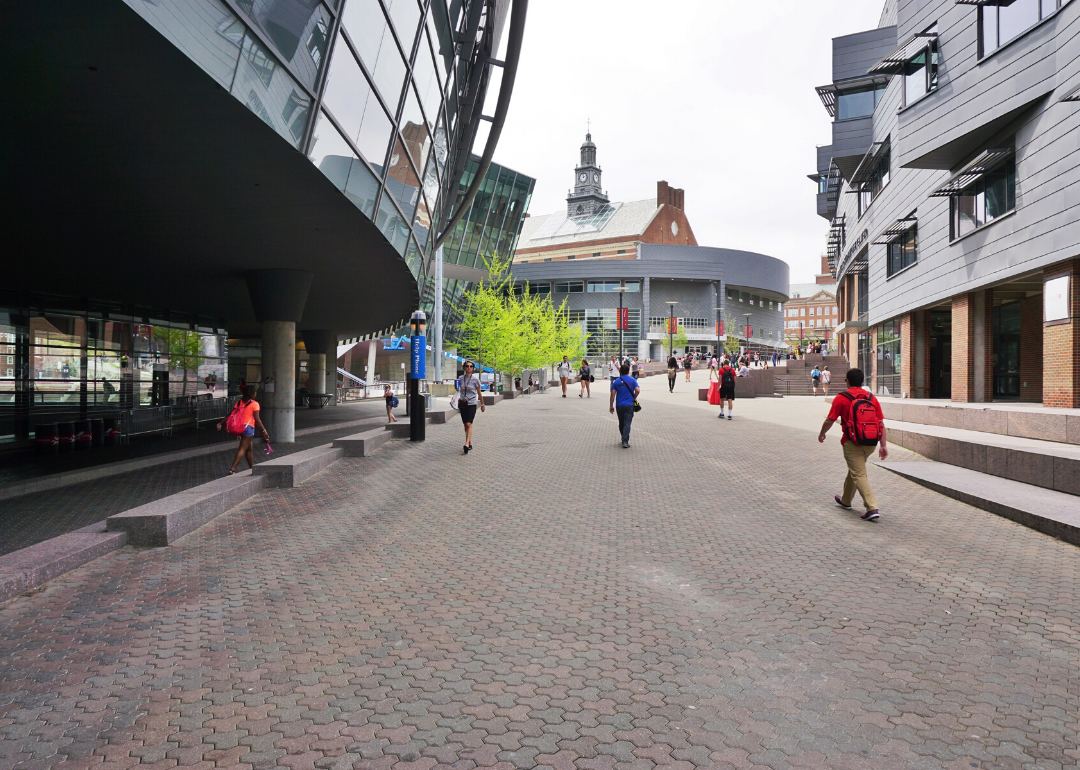
EQRoy // Shutterstock
#45. University of Cincinnati
– Location: Cincinnati, OH
– Students: 24,301
– Students to faculty ratio: 10:1
– Graduation rate: 73%
– Median earnings six years after graduation: $42,300
– Employment rate two years after graduation: 92%
The University of Cincinnati has more than 300 majors and 100 certificate programs—undergrad right up through doctoral—for students to choose from, with nursing, psychology, and marketing being some of the most sought-after degrees. The campus is located just a short distance from downtown Cincinnati, making it convenient for students to access restaurants, shops, and cultural events.

Felix Mizioznikov // Shutterstock
#44. Florida International University
– Location: Miami, FL
– Students: 27,551
– Students to faculty ratio: 20:1
– Graduation rate: 67%
– Median earnings six years after graduation: $46,300
– Employment rate two years after graduation: 90%
FIU is a top research university located in Miami, offering more than 200 degree programs. Students who attend say the school has a high level of diversity and provides an enriching educational experience.

fisheradam13 // Shutterstock
#43. United States Merchant Marine Academy
– Location: Kings Point, NY
– Students: 1,028
– Students to faculty ratio: 8:1
– Graduation rate: 82%
– Median earnings six years after graduation: $88,100
– Employment rate two years after graduation: 97%
Tucked away in Kings Point, New York, this small university offers students a big experience. With an enrollment of around 1,000 undergraduates and a very competitive acceptance rate, the school is considered one of the premier universities in the state. Popular degree programs include marine science and engineering. The school was also rated in the top 100 for Hardest Colleges to Get Into in America.

Tim Roberts Photography // Shutterstock
#42. Arizona State University
– Location: Tempe, AZ
– Students: 57,485
– Students to faculty ratio: 17:1
– Graduation rate: 66%
– Median earnings six years after graduation: $47,700
– Employment rate two years after graduation: 91%
ASU, ranked #1 for Best Colleges in Arizona, offers more than 400 undergraduate and 450 graduate degrees. Students who attend ASU have the option to participate in accelerated learning and concurrent degree programs, as well as being part of student research programs and internships.
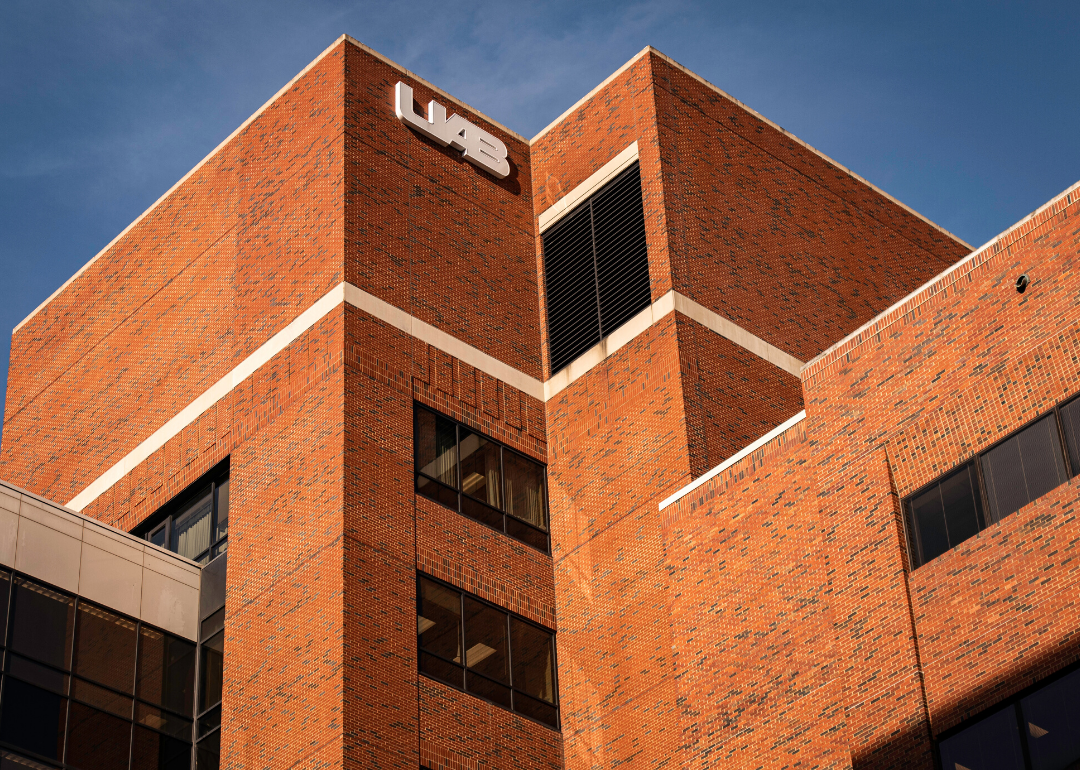
Travel_with_me // Shutterstock
#41. University of Alabama – Birmingham
– Location: Birmingham, AL
– Students: 10,402
– Students to faculty ratio: 4:1
– Graduation rate: 61%
– Median earnings six years after graduation: $41,200
– Employment rate two years after graduation: 92%
UAB, originally founded in association with the Medical College of Alabama in 1859, is the only public four-year university in the Birmingham area. Popular majors include nursing, business, and psychology. Student life is vibrant; the school has 18 NCAA Division 1 sports teams, 20 club and intramural teams, 28 Greek organizations, and 250 campus organizations.
You may also like: 30 celebs you didn’t know were Ivy Leaguers
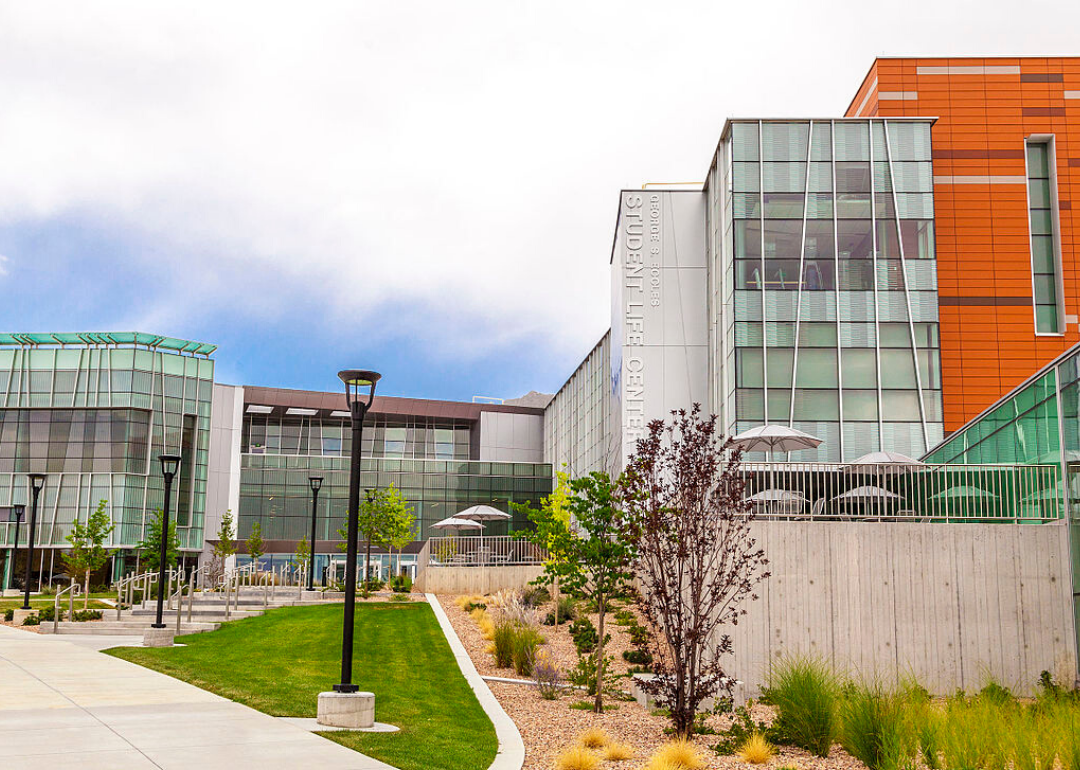
Ricardo630 // Wikimedia Commons
#40. University of Utah
– Location: Salt Lake City, UT
– Students: 18,749
– Students to faculty ratio: 9:1
– Graduation rate: 67%
– Median earnings six years after graduation: $53,000
– Employment rate two years after graduation: 90%
The University of Utah offers 86 majors within 25 fields of study, with majors in psychology, communications, and economics among the most popular. The school also recently broke ground on a $93.5 million Applied Sciences Project that will renovate a historic campus building and add a new lab and research center.
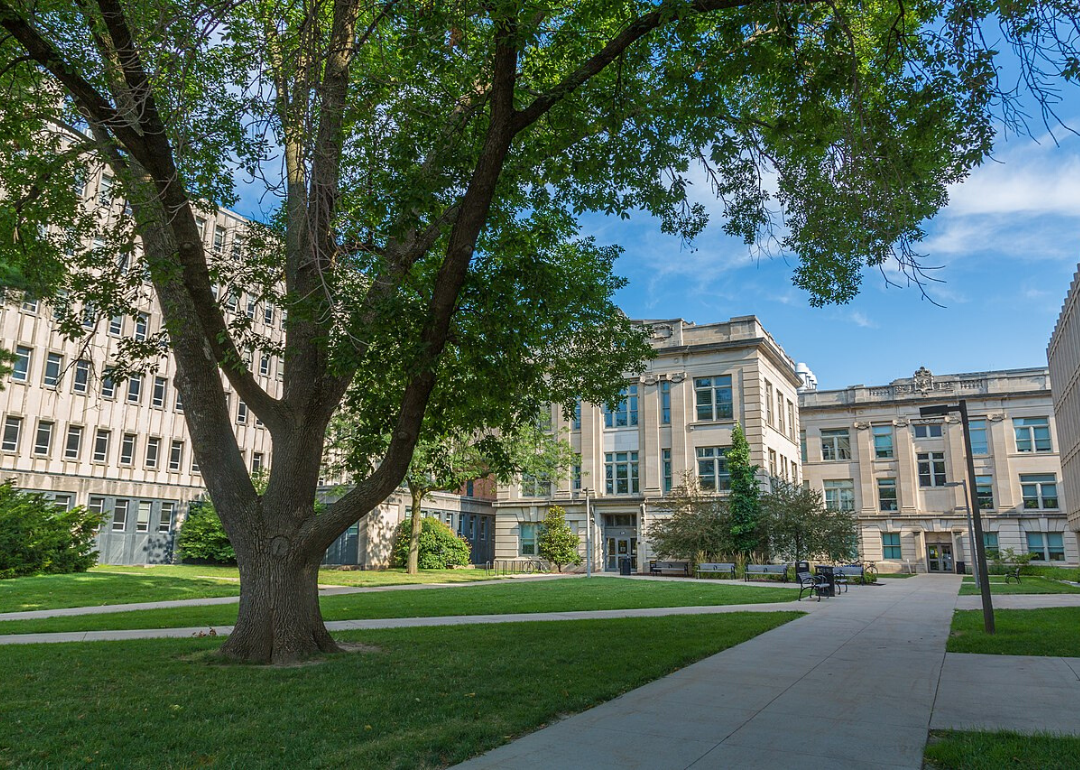
Tony Webster // Wikimedia Commons
#39. University of Iowa
– Location: Iowa City, IA
– Students: 20,227
– Students to faculty ratio: 8:1
– Graduation rate: 72%
– Median earnings six years after graduation: $51,900
– Employment rate two years after graduation: 96%
Ranked #1 in Public Universities in the state, the University of Iowa offers its students more than 200 different areas of study, with majors including kinesiology, finance, and nursing. Its health sciences department is very popular, providing students with opportunities for hands-on research at the university hospital and clinics.

FLJuJitsu // Wikimedia Commons
#38. University of Central Florida
– Location: Orlando, FL
– Students: 43,513
– Students to faculty ratio: 28:1
– Graduation rate: 74%
– Median earnings six years after graduation: $45,400
– Employment rate two years after graduation: 93%
The University of Central Florida offers more than 220 degree programs across 13 colleges and has been ranked by U.S. News & World Report as a top 20 school for innovation. The school’s sunny Florida location also earned it a spot in the top 50 for Best College Campuses in America.
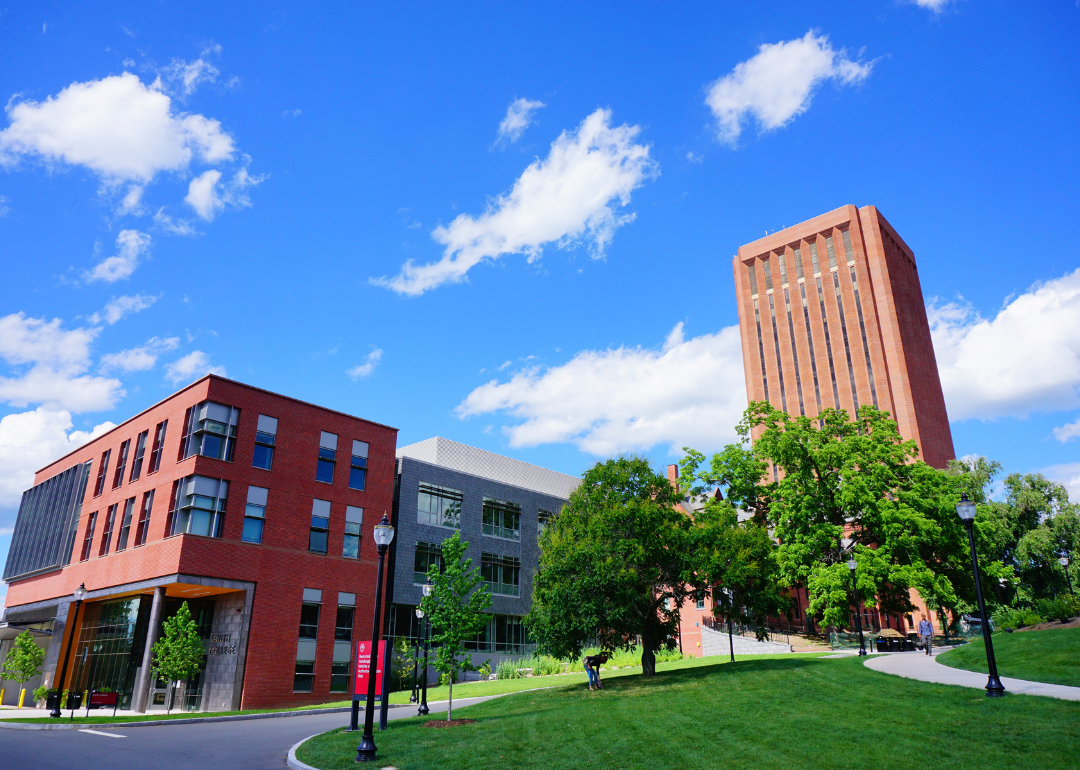
Feng Cheng // Shutterstock
#37. University of Massachusetts Amherst
The University of Massachusetts (UMASS) Amherst Campus landscape.
– Location: Amherst, MA
– Students: 22,212
– Students to faculty ratio: 15:1
– Graduation rate: 83%
– Median earnings six years after graduation: $51,400
– Employment rate two years after graduation: 94%
UMass bills itself as a world-class public research institution. Founded in 1863 through the Morrill Act as an agricultural school on 32 acres, it admitted its first 56 students with just four faculty members to teach them and four wooden buildings to teach in. Today, it is the flagship of the state’s university system offering a wide range of undergraduate and graduate programs and what’s known as 4+1 accelerated programs, which allow students to earn both their bachelor’s and master’s degrees at once. Amherst is the quintessential college town, where Emily Dickinson wrote her poems and where students can find cultural events and outdoor activities.

ehrlif // Shutterstock
#36. Michigan Technological University
– Location: Houghton, MI
– Students: 5,778
– Students to faculty ratio: 14:1
– Graduation rate: 72%
– Median earnings six years after graduation: $66,400
– Employment rate two years after graduation: 97%
Ranked as one of Michigan’s best value colleges, Michigan Tech is located in the city of Houghton, right off the Keweenaw Waterway and in close proximity to Lake Superior. There are more than 120 degree programs within its seven colleges, and the university is home to the Great Lakes Research Center, where students can participate in research programs with biologists, geologists, and engineers.
You may also like: States where high schoolers are least likely to graduate
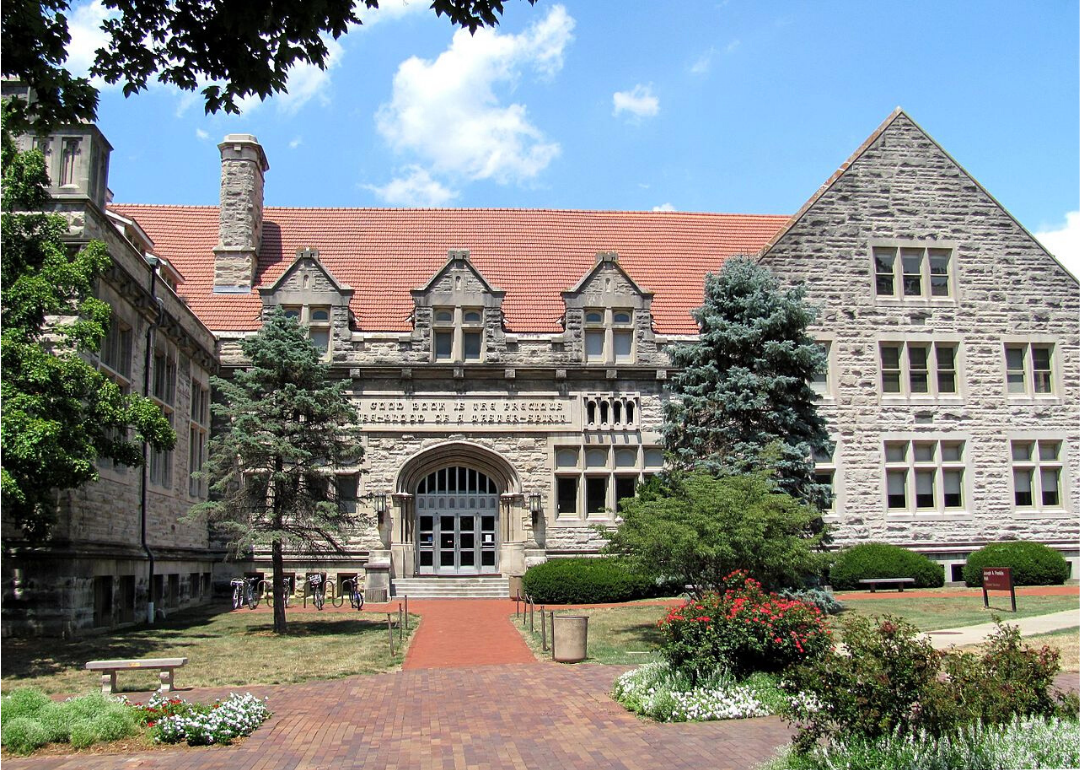
MARELBU // Wikimedia Commons
#35. Indiana University – Bloomington
– Location: Bloomington, IN
– Students: 31,632
– Students to faculty ratio: 15:1
– Graduation rate: 80%
– Median earnings six years after graduation: $47,700
– Employment rate two years after graduation: 95%
IU celebrated 200 years of higher learning in 2020, a huge milestone for the state’s flagship university. In that 200 years, the school has grown to an enrollment of nearly 32,000, with 200+ undergraduate majors and more than 500 academic programs. In their spare time, students can explore more than 750 student activities and groups, learning communities, and cultural organizations.
MWaits // Shutterstock
#34. Oklahoma State University
– Location: Stillwater, OK
– Students: 17,624
– Students to faculty ratio: 14:1
– Graduation rate: 64%
– Median earnings six years after graduation: $46,500
– Employment rate two years after graduation: 93%
Oklahoma State University has more than 300 majors and minors, and over 200 master’s and doctorate programs, giving students plenty of options in their chosen fields of study. The school’s most popular majors include business and marketing, and OSU was ranked as one of the Best Colleges for Agricultural Sciences in America. This is also an affordable university, with average tuition running below the national average and 92% of students receiving financial aid.
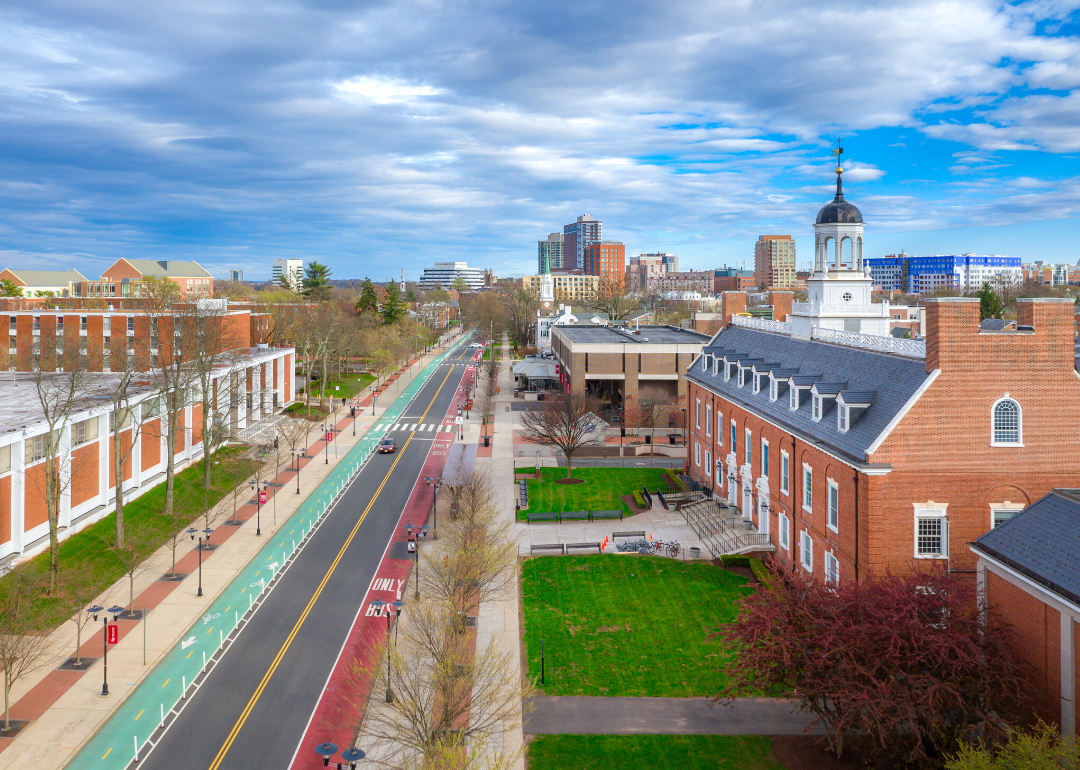
FotosForTheFuture // Shutterstock
#33. Rutgers University–New Brunswick
– Location: Piscataway, NJ
– Students: 33,788
– Students to faculty ratio: 8:1
– Graduation rate: 84%
– Median earnings six years after graduation: $57,900
– Employment rate two years after graduation: 93%
Rutgers has more than 150 undergraduate majors and nationally respected research centers, providing an environment of hands-on learning and real-world experience. Students who attend Rutgers cite diversity and opportunity as being top draws, and Rutgers was ranked in the top 50 for Most Diverse Colleges in America.
Bryan Pollard // Shutterstock
#32. Clemson University
– Location: Clemson, SC
– Students: 20,021
– Students to faculty ratio: 15:1
– Graduation rate: 85%
– Median earnings six years after graduation: $52,400
– Employment rate two years after graduation: 94%
Ranked #1 for Best Colleges in South Carolina, Clemson’s 20,000-acre campus is located on the shores of Lake Hartwell in the foothills of the Blue Ridge Mountains. Students can choose from more than 80 undergraduate majors and 130 graduate programs, and have opportunities to participate in research programs, a wide array of campus activities and clubs, and travel abroad.
EQRoy // Shutterstock
#31. Michigan State University
– Location: East Lansing, MI
– Students: 34,588
– Students to faculty ratio: 11:1
– Graduation rate: 81%
– Median earnings six years after graduation: $53,600
– Employment rate two years after graduation: 95%
MSU was founded in 1855 and was the first university to teach scientific agriculture. The campus encompasses 5,300 acres, with agricultural and natural resource research and education conducted on another 20,000 acres around the state. In addition to its highly rated education and research programs, MSU is an NCAA Division I school and is ranked in the top 20 for Best College Athletics in America.
You may also like: Best colleges in America
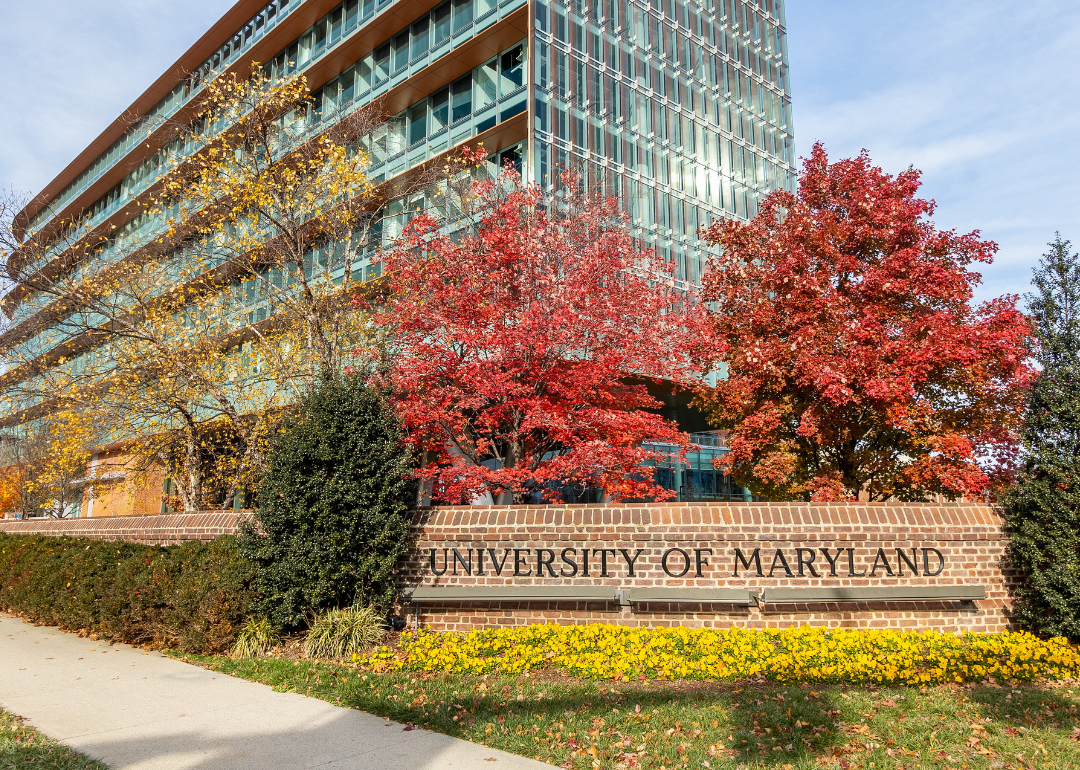
Bryan Pollard // Shutterstock
#30. University of Maryland – College Park
The entrance sign at the University of Maryland – College Park.
– Location: College Park, MD
– Students: 28,160
– Students to faculty ratio: 14:1
– Graduation rate: 87%
– Median earnings six years after graduation: $62,900
– Employment rate two years after graduation: 93%
Located just outside Washington, D.C., the University of Maryland at College Park is the state’s flagship public school. It’s one of the nation’s top public research universities and calls itself the first “Do Good” campus, committed to social entrepreneurship. Founded as an agriculture school in 1856, it is now known for its research, academics, arts, and athletics. It has 12 schools and colleges, offers more than 300 programs, and has a faculty that consists of two Nobel laureates and three Pulitzer Prize winners.
Leigh Trail // Shutterstock
#29. University of South Florida
– Location: Tampa, FL
– Students: 29,650
– Students to faculty ratio: 14:1
– Graduation rate: 74%
– Median earnings six years after graduation: $43,500
– Employment rate two years after graduation: 91%
The University of South Florida is a top state research facility. Founded in 1956, the school offers more than 180 majors and concentrations among its 14 colleges, and programs include health services, biomedical services, and nursing. In 2020, USF ranked in the top five nationally among “Golden Age Universities,” which includes both private and public schools.
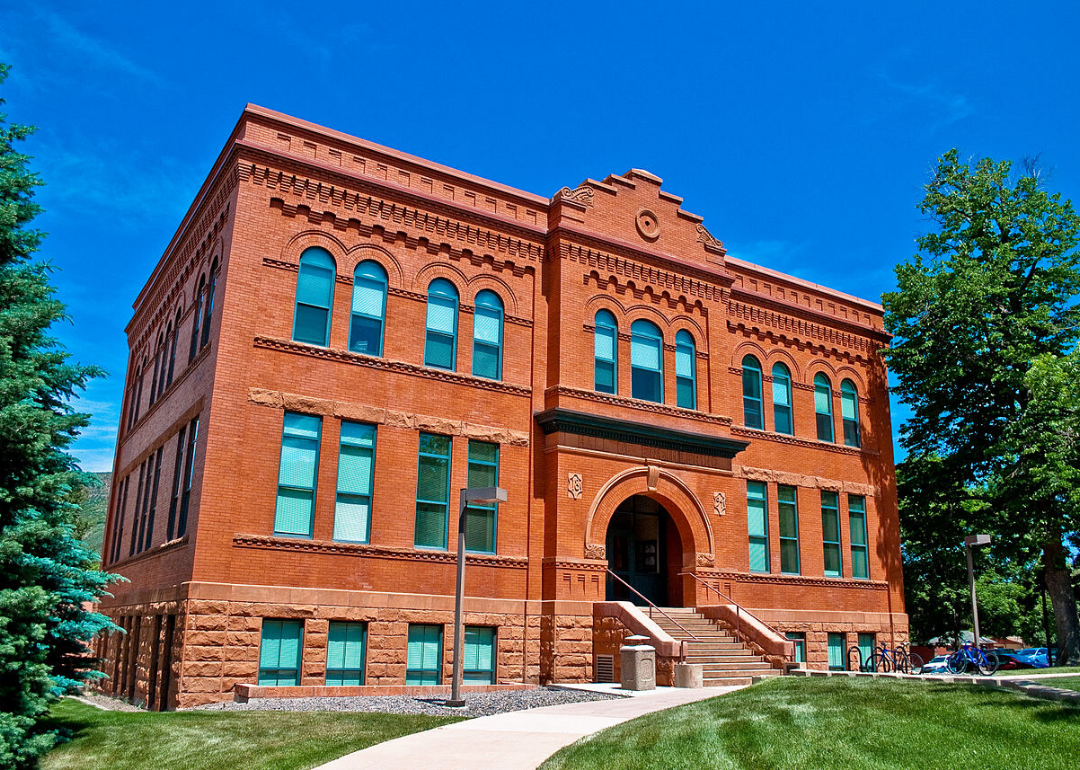
ChrisEngelsma // Wikimedia Commons
#28. Colorado School of Mines
– Location: Golden, CO
– Students: 5,201
– Students to faculty ratio: 14:1
– Graduation rate: 84%
– Median earnings six years after graduation: $84,900
– Employment rate two years after graduation: 95%
Colorado School of Mines was founded in 1873. It offers a variety of degrees for both undergraduate and graduate programs, including programs in space resources, quantum engineering, and advanced energy systems. Mechanical engineering and petroleum engineering are two of the most popular majors, and the school ranks in the top 50 for Best Colleges for Engineering in America.
Ken Wolter // Shutterstock
#27. University of Minnesota – Twin Cities
– Location: Minneapolis, MN
– Students: 28,989
– Students to faculty ratio: 8:1
– Graduation rate: 84%
– Median earnings six years after graduation: $51,900
– Employment rate two years after graduation: 94%
The flagship campus of the University of Minnesota system, the Twin Cities campus was founded in 1851 and remains the only land-grant university in the state. With 150+ degree programs ranging from accounting to urban studies, the university offers students a chance to study in small groups and provides over 1,000 on-campus opportunities for internships and research. Notable alumni include two former U.S. vice presidents, 55 members of Congress, and dozens of founders and CEOs.

Christian Hinkle // Shutterstock
#26. University of Pittsburgh
– Location: Pittsburgh, PA
– Students: 18,298
– Students to faculty ratio: 4:1
– Graduation rate: 84%
– Median earnings six years after graduation: $53,900
– Employment rate two years after graduation: 94%
Founded as the Pittsburgh Academy in 1787, the University of Pittsburgh has grown to offer 652 degrees and certificate programs across its 16 schools, and campus life includes clubs and activities, Greek life, and close proximity to the city of Pittsburgh, which has shopping, restaurants, and cultural events.
You may also like: Best private high school in every state
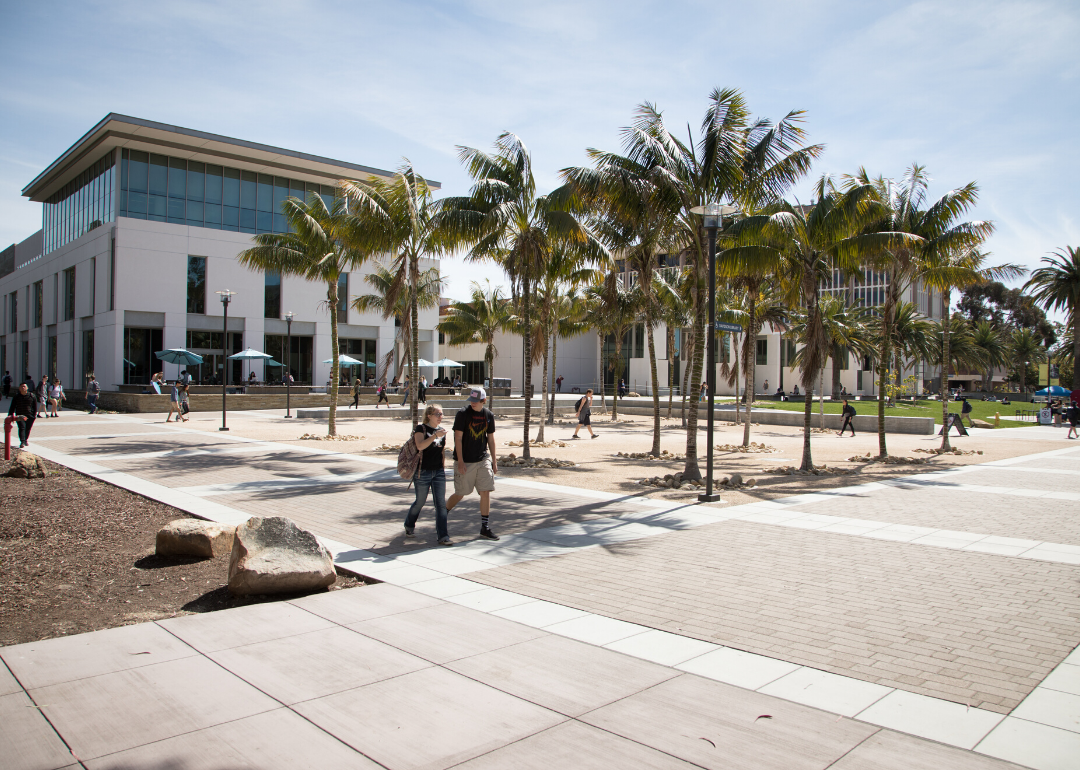
VDB Photos // Shutterstock
#25. University of California – Santa Barbara
– Location: Santa Barbara, CA
– Students: 22,480
– Students to faculty ratio: 20:1
– Graduation rate: 84%
– Median earnings six years after graduation: $55,300
– Employment rate two years after graduation: 91%
UC Santa Barbara, located on the lovely California coast, was founded in 1891. Offering more than 200 different majors, degrees, and credentials, UC Santa Barbara combines its status as a leading research institution with outstanding educational opportunities. The campus has more than 500 student organizations and activities, and best of all, it sits right on the Pacific Ocean, providing students with beautiful views and the chance to explore the outdoors.
Chris Allan // Shutterstock
#24. University of California – Davis
– Location: Davis, CA
– Students: 30,186
– Students to faculty ratio: 11:1
– Graduation rate: 86%
– Median earnings six years after graduation: $58,200
– Employment rate two years after graduation: 91%
Another top-notch school from California’s state university system, UC Davis is located in the Sacramento area. Founded in 1908, the university is known for its highly rated educational and research programs, diversity, and a dedication to sustainability. Aggies are also very highly rated in agriculture, forestry, and veterinary science.
Bryan Regan // Shutterstock
#23. North Carolina State University
– Location: Raleigh, NC
– Students: 22,929
– Students to faculty ratio: 12:1
– Graduation rate: 84%
– Median earnings six years after graduation: $52,500
– Employment rate two years after graduation: 94%
North Carolina State has an enrollment of more than 22,000 students, with 300+ undergraduate and graduate programs to choose from. Recent students had some of the highest scores for ACT and SAT in university history, and more than 100 students in the last five years were national scholars and fellows. Top choices in majors include biology, engineering, and business.

Spiroview Inc // Shutterstock
#22. The Ohio State University
– Location: Columbus, OH
– Students: 42,734
– Students to faculty ratio: 8:1
– Graduation rate: 87%
– Median earnings six years after graduation: $46,100
– Employment rate two years after graduation: 94%
Located in the city of Columbus, Ohio State has an enrollment of more than 42,000 students. Students can choose from more than 200 majors, and enjoy a rich campus life that includes student organizations, clubs, and more than 90 acres of outdoor space. The school’s athletic program, the Ohio State Buckeyes, is also renowned. It is an NCAA Division I school, a member of the Big Ten Athletic Conference, and ranked in the top 10 for Best College Athletics in America.
Jonathan Weiss // Shutterstock
#21. Purdue University
– Location: West Lafayette, IN
– Students: 33,575
– Students to faculty ratio: 16:1
– Graduation rate: 83%
– Median earnings six years after graduation: $55,100
– Employment rate two years after graduation: 95%
Rated as the top public university in Indiana, Purdue also ranks high for public colleges in the U.S. Tuition costs just over $12,000 per year, with the school awarding more than $11,000 in financial aid on average. Attending students say they enjoy the beautiful campus, diversity, and choices in educational programs.
You may also like: 2-year degrees that can earn you the most money
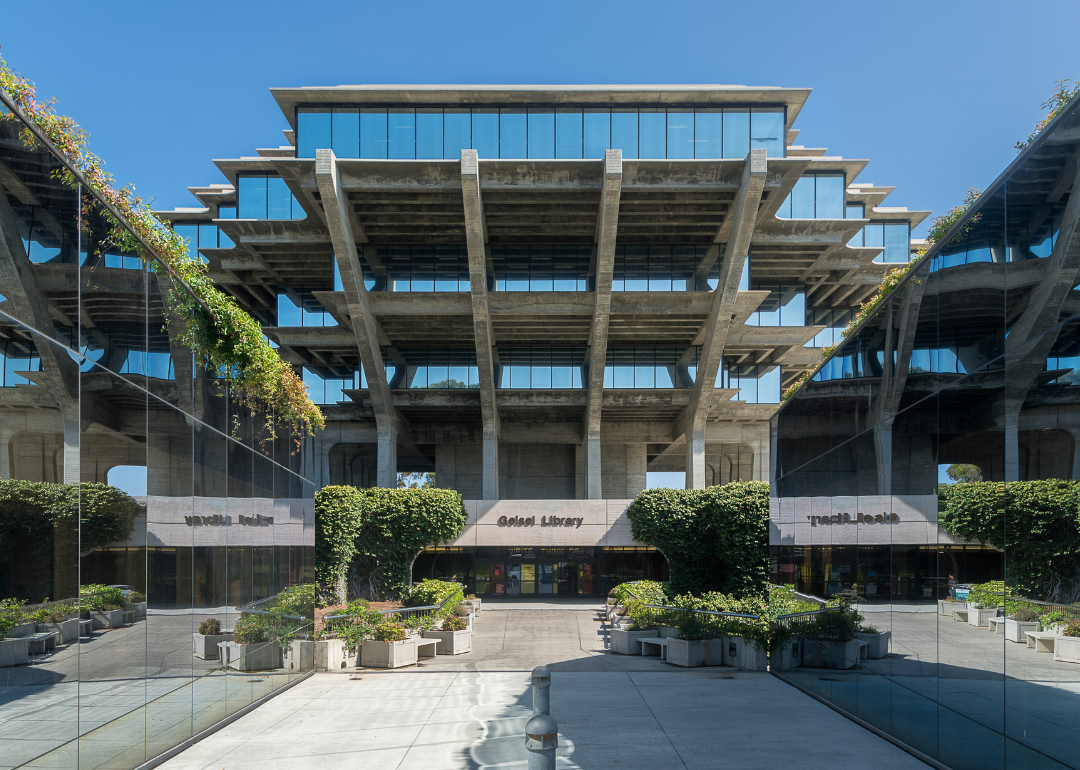
Nagel Photography // Shutterstock
#20. University of California – San Diego
Geisel Library on Gilman Drive on the campus of the University of California – San Diego.
– Location: La Jolla, CA
– Students: 30,939
– Students to faculty ratio: 10:1
– Graduation rate: 87%
– Median earnings six years after graduation: $59,900
– Employment rate two years after graduation: 89%
A top research institution, UC San Diego received $1.64 billion in sponsored research funding for the 2022 fiscal year. Sixteen Nobel Prize laureates have taught at the school along with winners of the Tony Award, Pulitzer Prize, and Field Medal in mathematics. The campus is on 1,200 acres overlooking the Pacific Ocean and its Geisel Library is named after Audrey and Theodor Seuss Geisel, better known as Dr. Seuss.
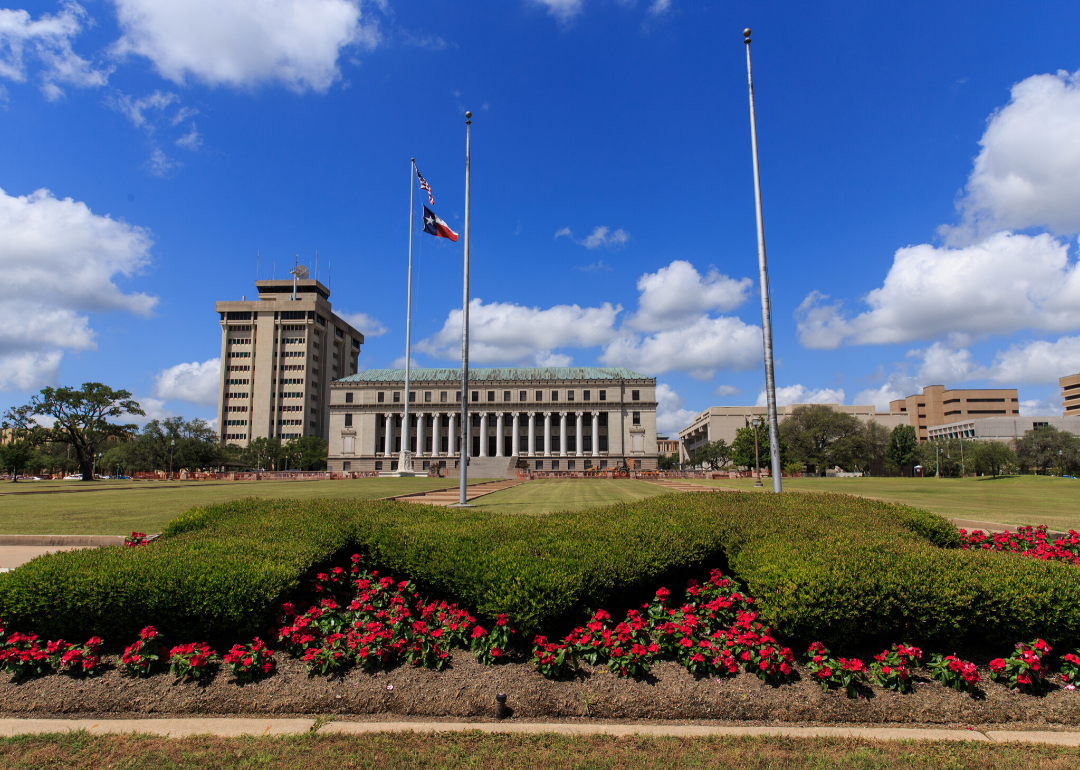
Tricia Daniel // Shutterstock
#19. Texas A&M University
– Location: College Station, TX
– Students: 49,442
– Students to faculty ratio: 15:1
– Graduation rate: 83%
– Median earnings six years after graduation: $58,000
– Employment rate two years after graduation: 95%
Texas A&M was established in 1876 and was the first public higher learning facility in Texas. It offers more than 130 undergraduate, 175 graduate, and 90 doctorate programs. One of the largest research facilities in the U.S., it provides hands-on research for students and is one of only two universities in the country leading two National Science Foundation Engineering Research Centers.
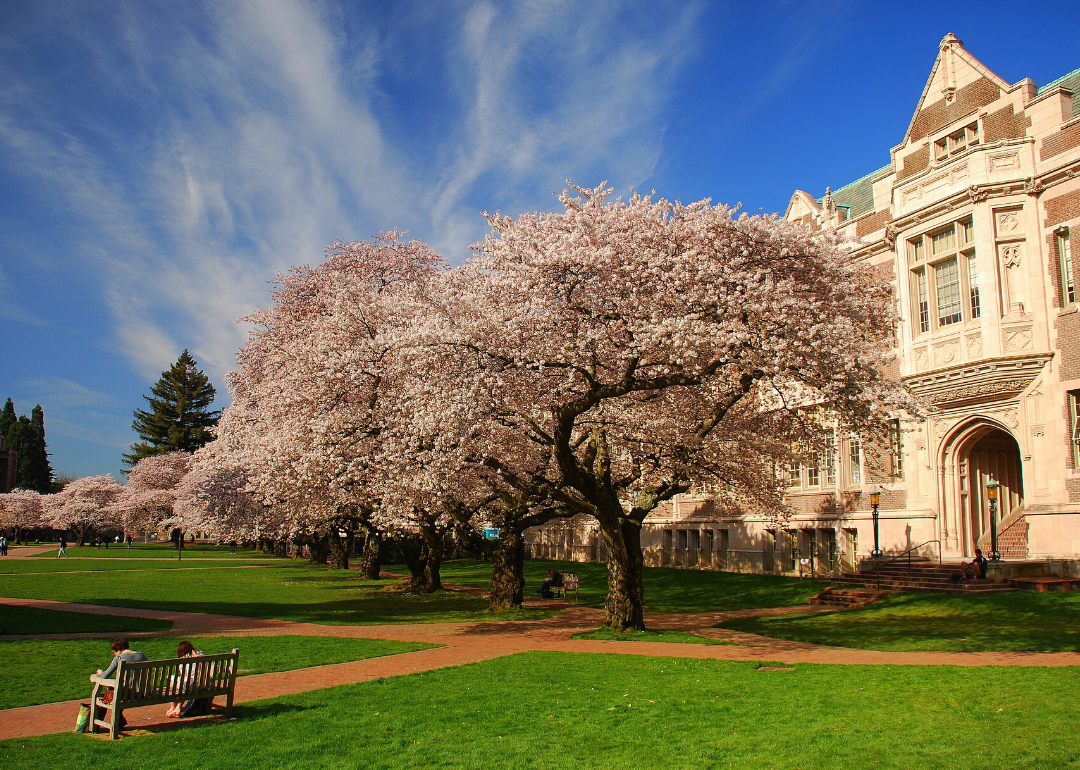
Mike Peters // Shutterstock
#18. University of Washington
– Location: Seattle, WA
– Students: 29,350
– Students to faculty ratio: 6:1
– Graduation rate: 82%
– Median earnings six years after graduation: $57,700
– Employment rate two years after graduation: 91%
The University of Washington is a multi-campus school, with locations in Seattle, Tacoma, and Bothell. It offers plentiful research opportunities, and students can also apply for its study abroad program. Campus life includes student organizations, volunteering, Greek memberships, and a strong athletic department.
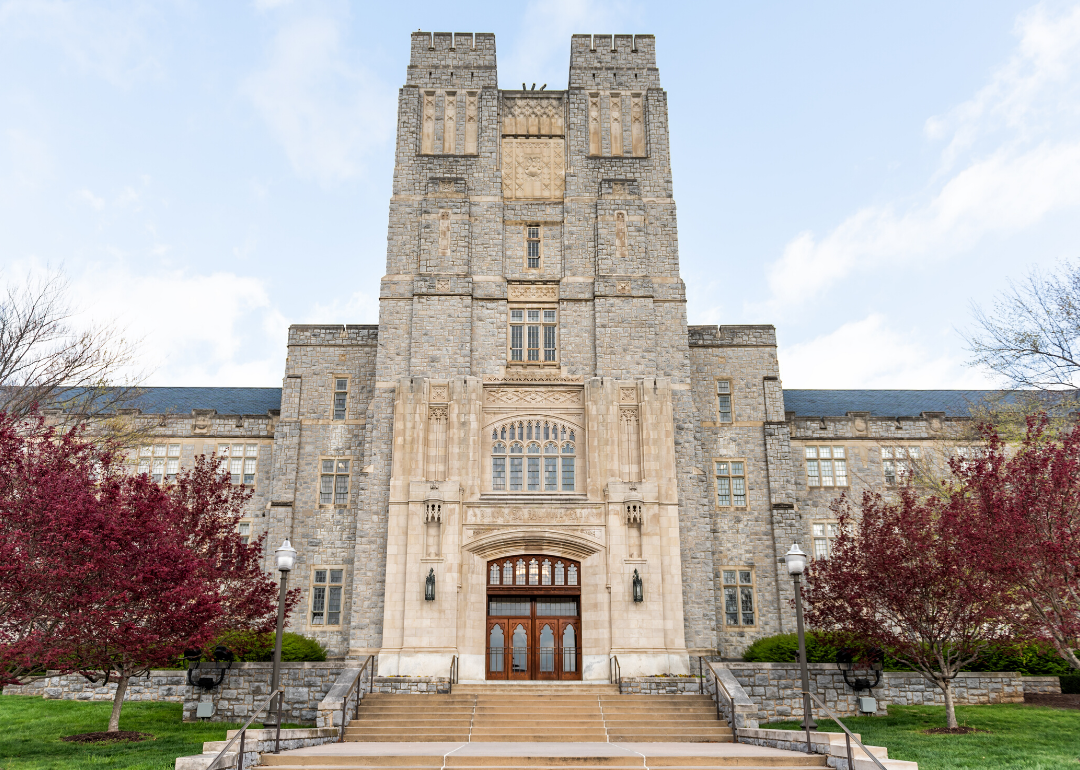
Kristi Blokhin // Shutterstock
#17. Virginia Tech
– Location: Blacksburg, VA
– Students: 29,112
– Students to faculty ratio: 13:1
– Graduation rate: 86%
– Median earnings six years after graduation: $62,500
– Employment rate two years after graduation: 96%
Virginia Tech students can choose between more than 100 undergraduate majors and 170 master’s and doctorate programs, with options that include biology, information science, marketing, and communications. They have a spacious 2,600-acre campus with over 200 buildings and an airport, and the school is in close proximity to downtown Blacksburg, which has been rated a top place to live.
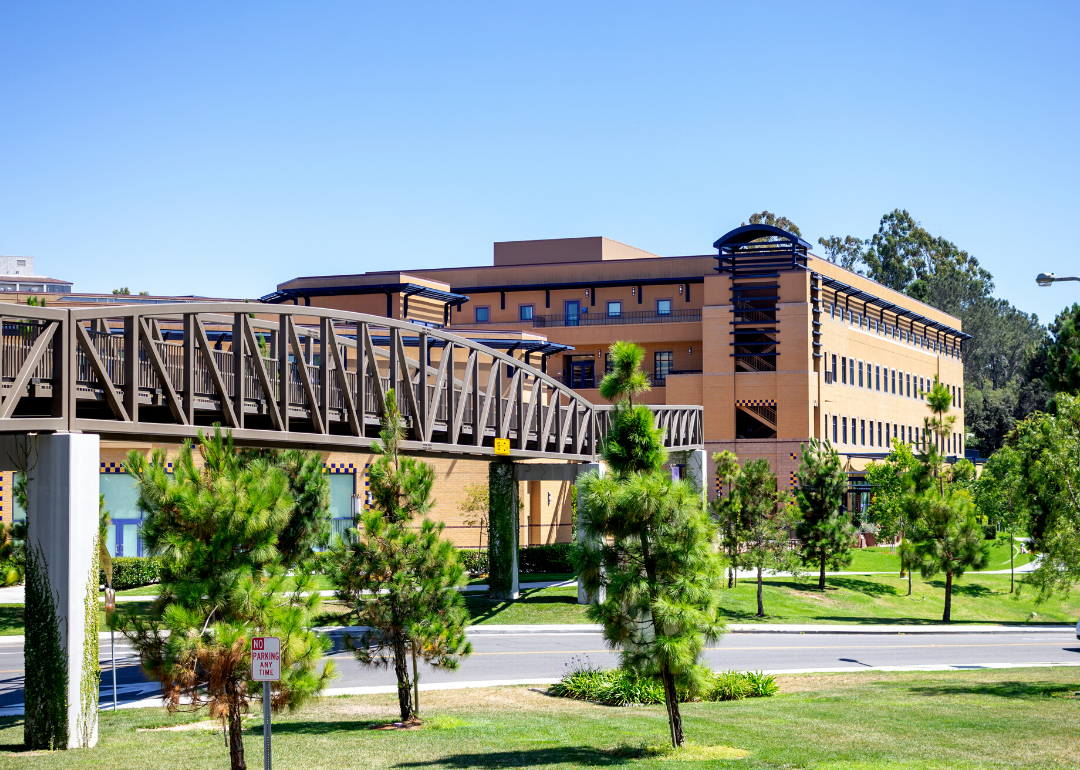
David Tonelson // Shutterstock
#16. University of California – Irvine
– Location: Irvine, CA
– Students: 28,990
– Students to faculty ratio: 13:1
– Graduation rate: 85%
– Median earnings six years after graduation: $58,400
– Employment rate two years after graduation: 90%
UC Irvine is located about 40 miles outside of Los Angeles. This is a larger school with nearly 30,000 students. There are 85 majors and 75 minors to choose from, with programs in social psychology, biology, and computer science being some of the most popular. The school has consistently been ranked in the top 10 for its sustainability efforts by Sierra magazine and has been named #25 for Best Colleges for Performing Arts in America.
You may also like: How student debt has grown in every state
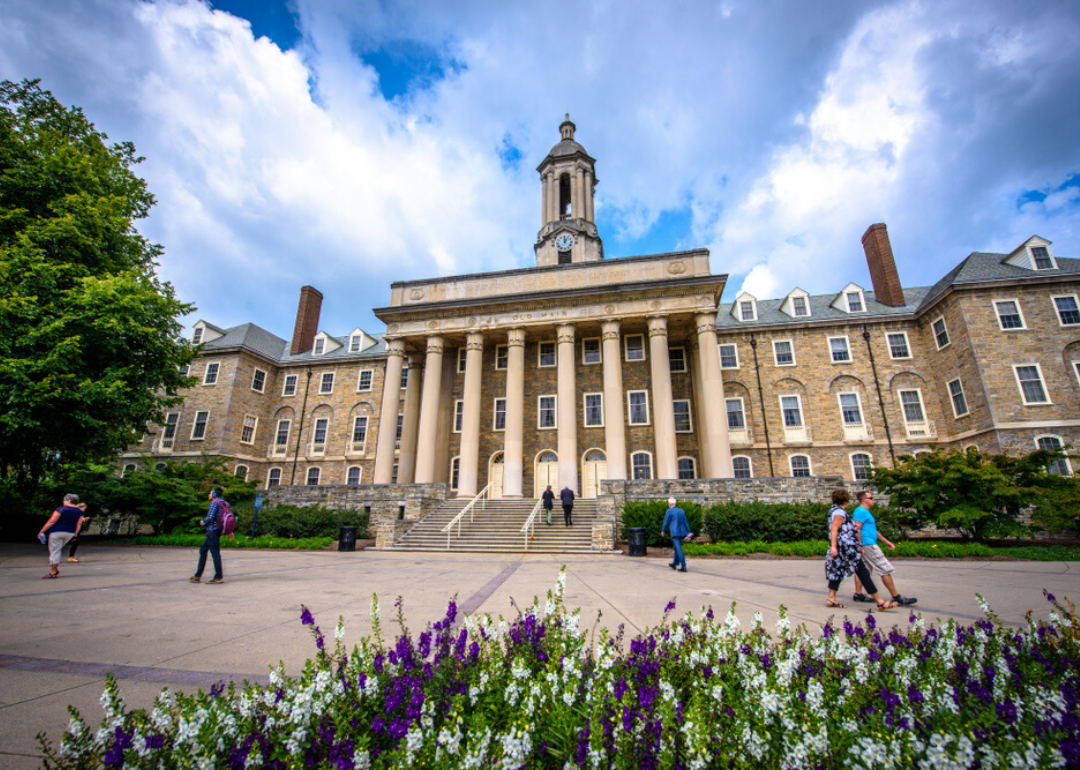
Kristopher Kettner // Shutterstock
#15. Penn State
– Location: University Park, PA
– Students: 39,321
– Students to faculty ratio: 13:1
– Graduation rate: 85%
– Median earnings six years after graduation: $50,100
– Employment rate two years after graduation: 94%
Niche gives Penn State A and A+ grades across the board in its rankings, and students seem to agree, with the bulk of student reviews rating the school “excellent” or “very good.” Originally founded in 1855, Penn State is home to more than 39,000 students, offering more than 275 degree programs across 24 different campus locations. It consistently ranks high for engineering and business.
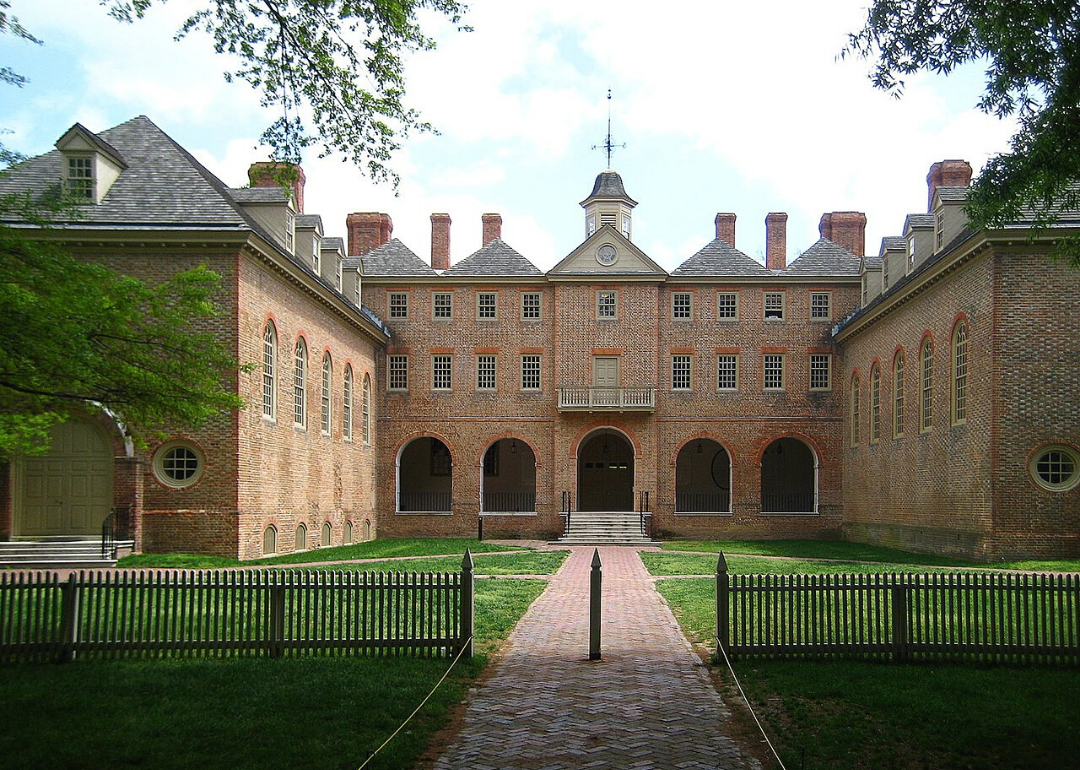
Jrcla2 // Wikimedia Commons
#14. William & Mary
– Location: Williamsburg, VA
– Students: 6,475
– Students to faculty ratio: 9:1
– Graduation rate: 91%
– Median earnings six years after graduation: $58,500
– Employment rate two years after graduation: 94%
William & Mary is a smaller university, with an enrollment of just over 6,000 and a low student-faculty ratio. One of only eight “Public Ivy” schools in the nation, it offers innovative education opportunities, and campus life includes clubs and recreational sports, student organizations, and cultural events.
Fotoluminate LLC // Shutterstock
#13. Florida State University
– Location: Tallahassee, FL
– Students: 29,072
– Students to faculty ratio: 17:1
– Graduation rate: 84%
– Median earnings six years after graduation: $46,400
– Employment rate two years after graduation: 93%
Florida State has been designated a Carnegie Research Facility, providing students with hands-on learning opportunities. Nearly 60% of the student populace is women. The school also ranks in the top 10 for both Greek life and student life.
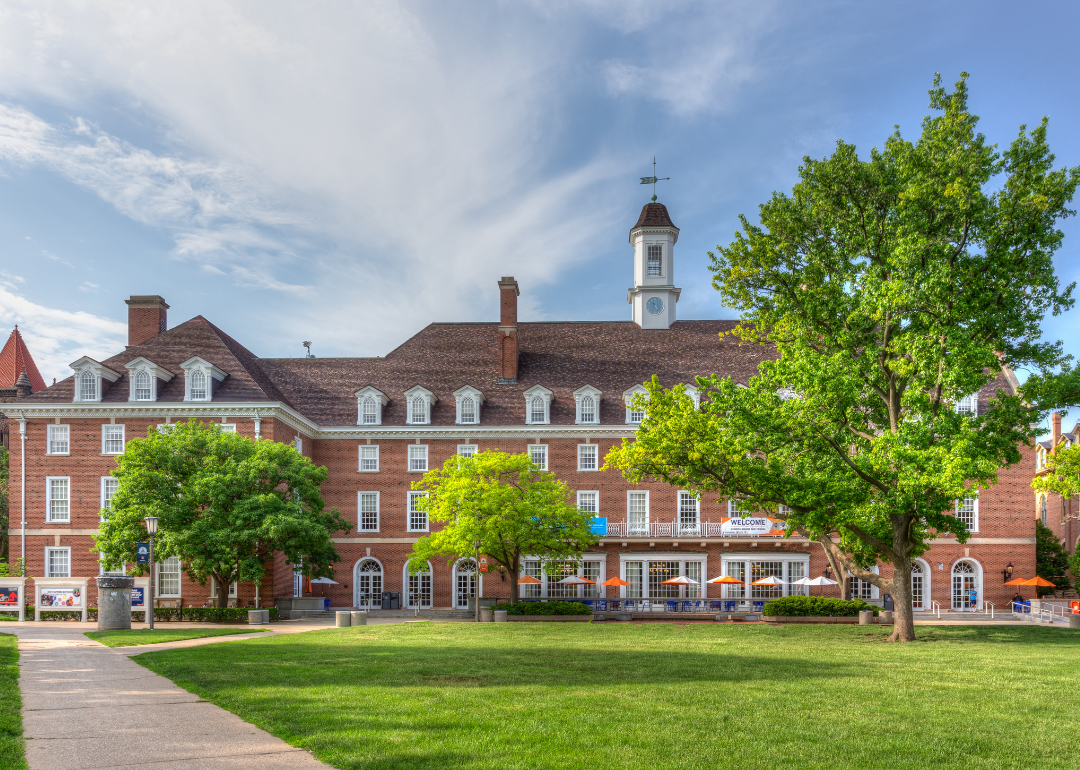
Ken Wolter // Shutterstock
#12. University of Illinois Urbana-Champaign
Davenport Hall on the campus of the University of Illinois at Urbana–Champaign.
– Location: Urbana, IL
– Students: 32,107
– Students to faculty ratio: 13:1
– Graduation rate: 86%
– Median earnings six years after graduation: $61,500
– Employment rate two years after graduation: 95%
Founded in 1867 as a land-grant institution, the University of Illinois at Urbana-Champaign produces world-class research addressing worldwide problems. It enrolls students from all 50 states and more than 100 countries. Its University Library has 14 million volumes, making it one of the largest public university collections in the world.
youngryand // Shutterstock
#11. University of Wisconsin – Madison
– Location: Madison, WI
– Students: 30,063
– Students to faculty ratio: 8:1
– Graduation rate: 88%
– Median earnings six years after graduation: $56,200
– Employment rate two years after graduation: 95%
Established in 1848, the University of Wisconsin at Madison sits on over 900 acres, with plenty of greenery and easy access to amenities. Educational opportunities are plentiful at UMad, and students can choose from more than 600 undergraduate and graduate programs. Students who attend enjoy a variety of academic programs, scenic campus views, and an active Greek life.
You may also like: Best public colleges in America
Bryan Pollard // Shutterstock
#10. University of Georgia
– Location: Athens, GA
– Students: 27,888
– Students to faculty ratio: 13:1
– Graduation rate: 87%
– Median earnings six years after graduation: $50,500
– Employment rate two years after graduation: 92%
Originally founded in 1785, the University of Georgia is the state’s flagship school. UGA students include Rhodes Scholars, Fulbright Scholars, and Goldwater Scholars, and 92% of its graduates are gainfully employed two years post-grad.
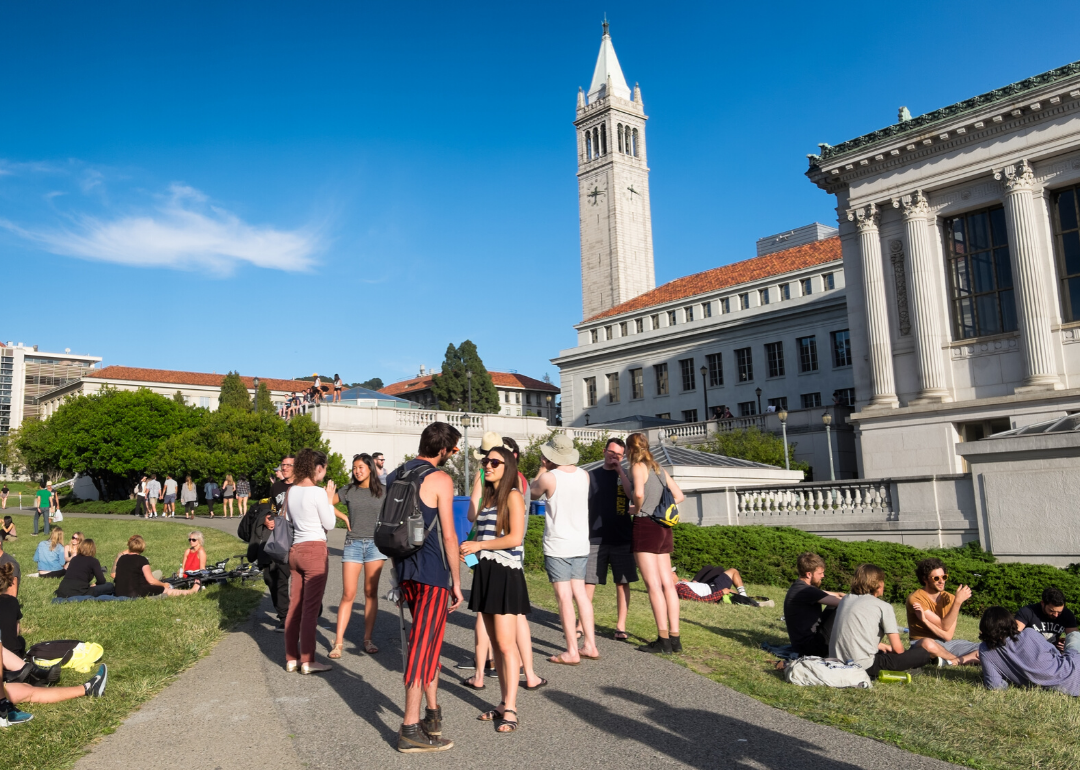
cdrin // Shutterstock
#9. University of California – Berkeley
– Location: Berkeley, CA
– Students: 29,300
– Students to faculty ratio: 14:1
– Graduation rate: 92%
– Median earnings six years after graduation: $64,700
– Employment rate two years after graduation: 88%
UC Berkeley is a highly sought-after school with an equally sought-after hip California vibe. The school has a lean acceptance rate of just 17%, but an outstanding graduation rate of 92%. Students who attend say they love the location and beauty of the campus, the diverse student population, and amazing research facilities.
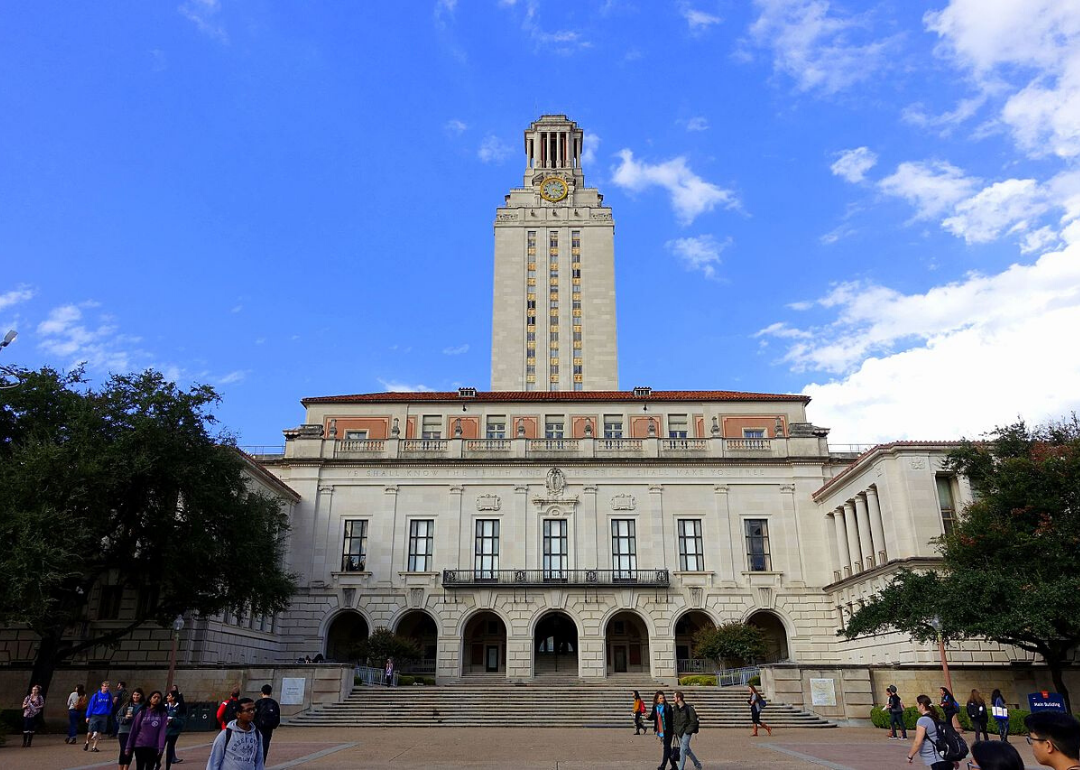
Daderot // Wikimedia Commons
#8. University of Texas – Austin
– Location: Austin, TX
– Students: 37,404
– Students to faculty ratio: 13:1
– Graduation rate: 88%
– Median earnings six years after graduation: $58,200
– Employment rate two years after graduation: 93%
UT Austin was founded in 1883. Popular majors for undergraduates include business, biology, and information science. In addition to its rating as one of the Best Public Colleges in America, it is also ranked in the top 10 for Best Colleges for Communications and #1 for Top Public Universities in Texas.

Yeungb // Wikimedia Commons
#7. University of North Carolina at Chapel Hill
– Location: Chapel Hill, NC
– Students: 18,505
– Students to faculty ratio: 9:1
– Graduation rate: 91%
– Median earnings six years after graduation: $55,600
– Employment rate two years after graduation: 94%
UNC Chapel Hill was established in 1789, the first public university in the country. It offers 74 bachelor’s, 104 master’s, and 65 doctorate programs. Many students take advantage of the school’s study abroad program, with approximately one-third of undergraduates studying in other countries during their school career. UNC was also ranked in the top 10 for Best Big Colleges in America.
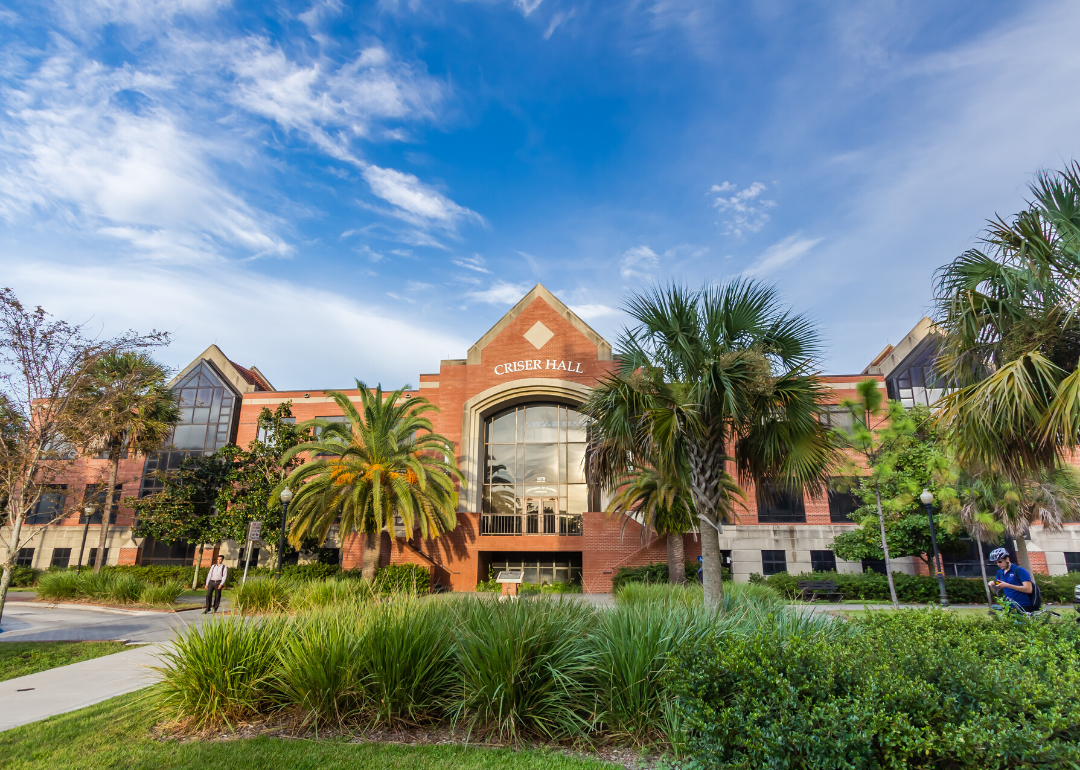
Bryan Pollard // Shutterstock
#6. University of Florida
– Location: Gainesville, FL
– Students: 31,476
– Students to faculty ratio: 11:1
– Graduation rate: 89%
– Median earnings six years after graduation: $56,000
– Employment rate two years after graduation: 92%
The University of Florida offers upwards of 300 undergraduate and graduate degrees, as well as numerous clubs, sports, and extracurriculars. UF launched an “Academics for Black Survival and Wellness” program in 2020, which was initiated by a UF student and her professor after determining outreach was needed to support Black Lives Matter. The program provides anti-racism training, and helps enhance the safety of Black students on- and off-campus. It’s sessions aim to facilitate healing for Black people in and out of academia.
You may also like: 35 CEOs who never finished college
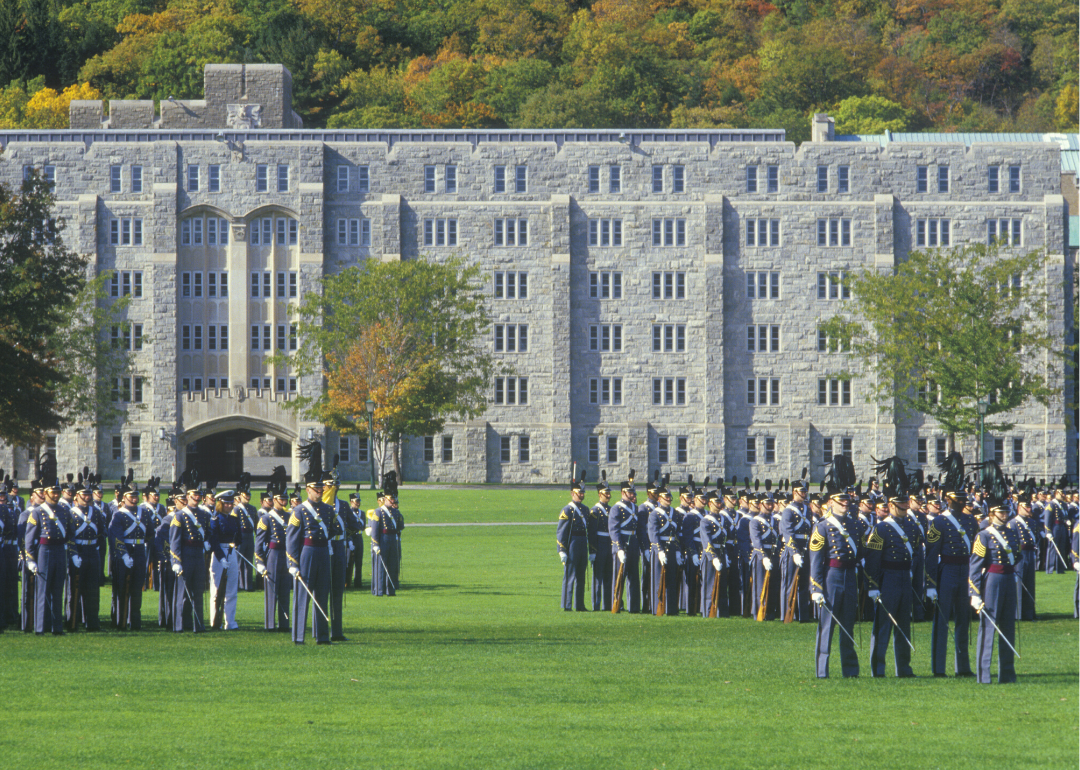
Joseph Sohm // Shutterstock
#5. United States Military Academy at West Point
– Location: West Point, NY
– Students: 4,536
– Students to faculty ratio: 16:1
– Graduation rate: 85%
– Median earnings six years after graduation: $ No data available
– Employment rate two years after graduation: No data available
West Point is a small school with a very competitive acceptance rate of just 9%. Located in Highlands, New York, it was originally built as a military fort in 1778, and established as a military academy in 1802. In addition to its top rating for Best Public Colleges in America, the academy is also ranked in the top 10 for Best Liberal Arts Colleges in America.
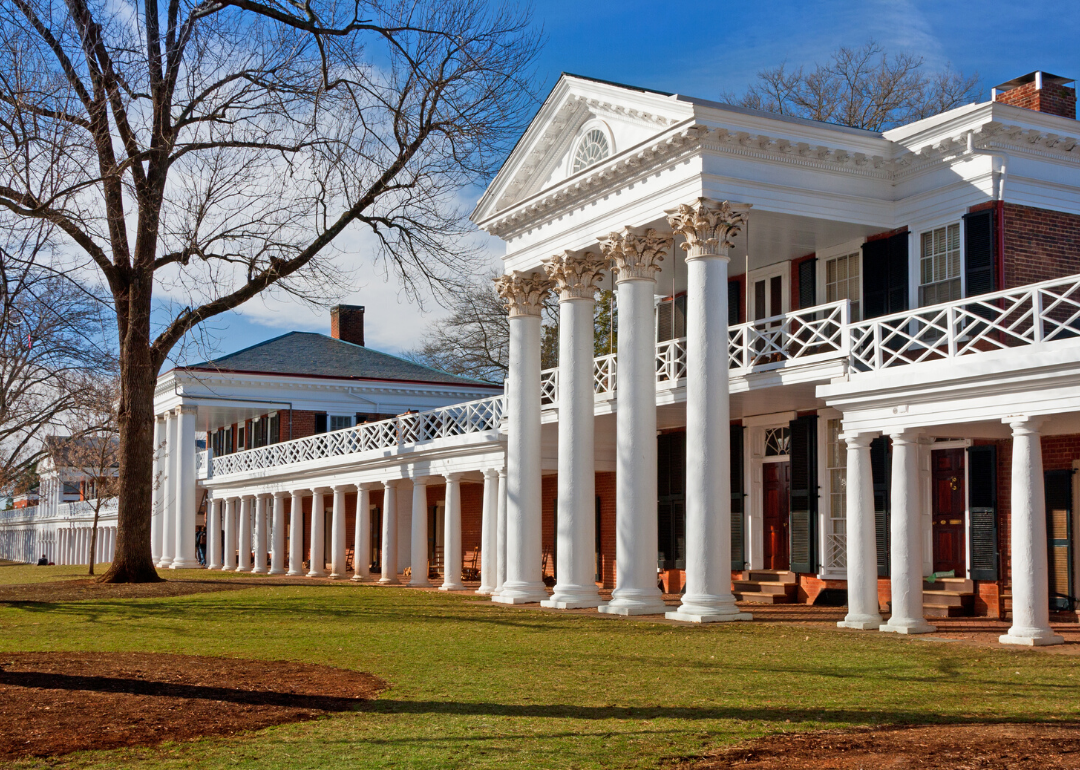
Melinda Fawver // Shutterstock
#4. University of Virginia
– Location: Charlottesville, VA
– Students: 16,319
– Students to faculty ratio: 7:1
– Graduation rate: 94%
– Median earnings six years after graduation: $61,200
– Employment rate two years after graduation: 94%
Popular majors at the University of Virginia include liberal arts and humanities, economics, and business. The school sits on more than 1,600 acres, and the campus has been named one of the most beautiful college campuses in America many times.
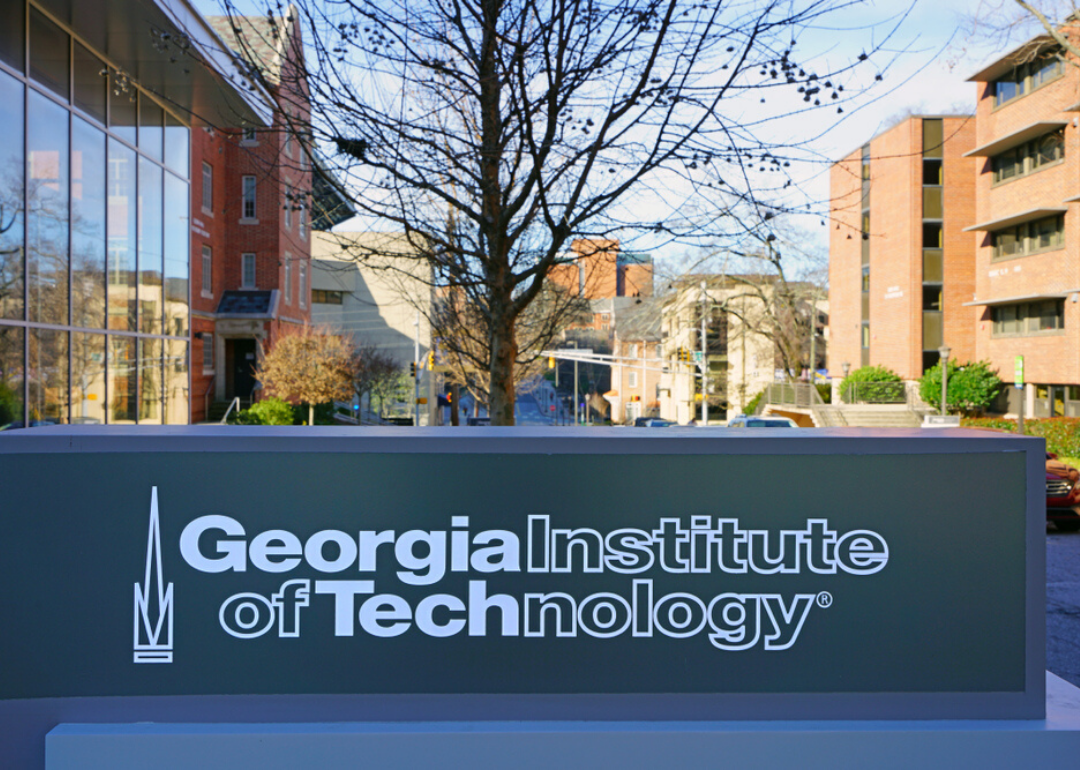
EQRoy // Shutterstock
#3. Georgia Institute of Technology
– Location: Atlanta, GA
– Students: 14,485
– Students to faculty ratio: 12:1
– Graduation rate: 91%
– Median earnings six years after graduation: $79,100
– Employment rate two years after graduation: 95%
Students who make the grade at Georgia Tech are privy to a wide selection of undergraduate and graduate programs within six colleges and 28 schools. It is one of the largest industrial and engineering research agencies in the South U.S. and participates in the Georgia Research Alliance, a nonprofit that helps develop the state economic strategy.
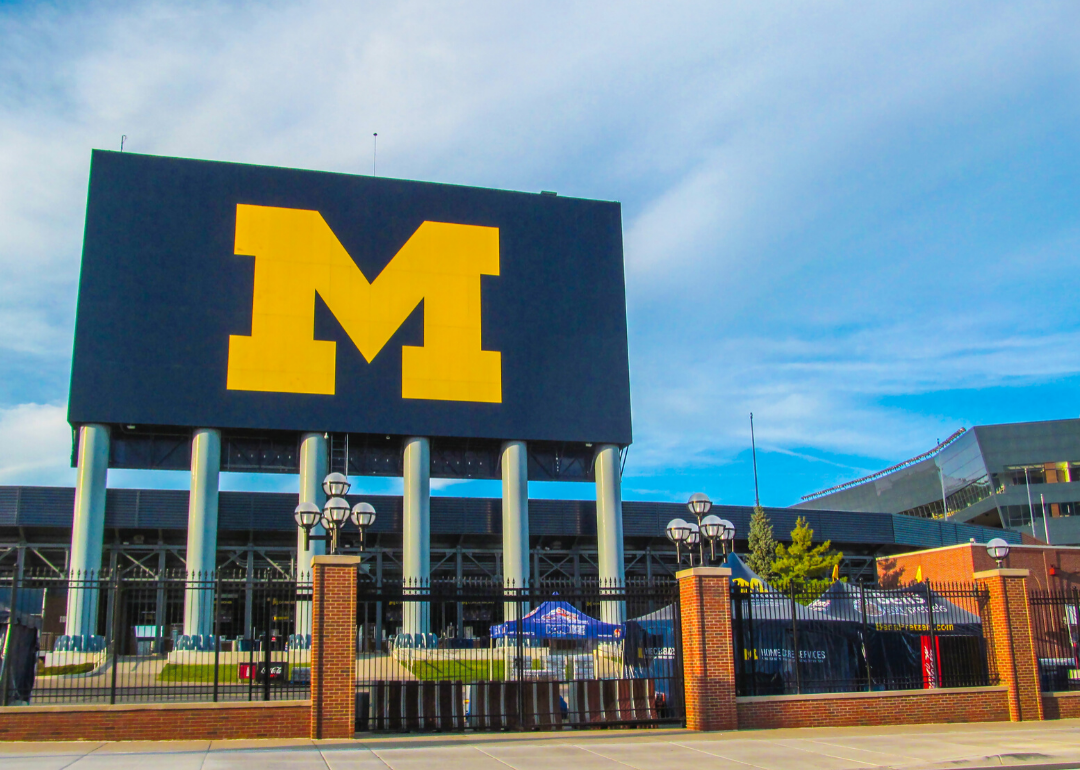
mivod // Shutterstock
#2. University of Michigan – Ann Arbor
– Location: Ann Arbor, MI
– Students: 29,851
– Students to faculty ratio: 4:1
– Graduation rate: 93%
– Median earnings six years after graduation: $63,400
– Employment rate two years after graduation: 94%
The University of Michigan at Ann Arbor is among the most highly regarded schools in the nation. Not only does it hold the #2 spot on this list, but it holds the same position on the lists of Best Colleges for Sports Management and Best Big Colleges. With more than 1,500 research opportunities, U of M is also highly ranked by the National Science Foundation.
Ken Wolter // Shutterstock
#1. University of California – Los Angeles
– Location: Los Angeles, CA
– Students: 31,068
– Students to faculty ratio: 7:1
– Graduation rate: 91%
– Median earnings six years after graduation: $60,700
– Employment rate two years after graduation: 89%
In addition to its sitting pretty at the top spot for Best Public Colleges in America, UCLA comes in at #1 for Best College Campuses in America and Best College Food. With just over 31,000 students and a low acceptance rate, getting into UCLA is an accomplishment in itself. The school offers more than 125 majors to choose from, with economics and political science as two of the most popular. Campus life includes proximity to all the Los Angeles lifestyle has to offer, as well as plenty of student organizations, clubs, and sports.
You may also like: Most liberal colleges in America
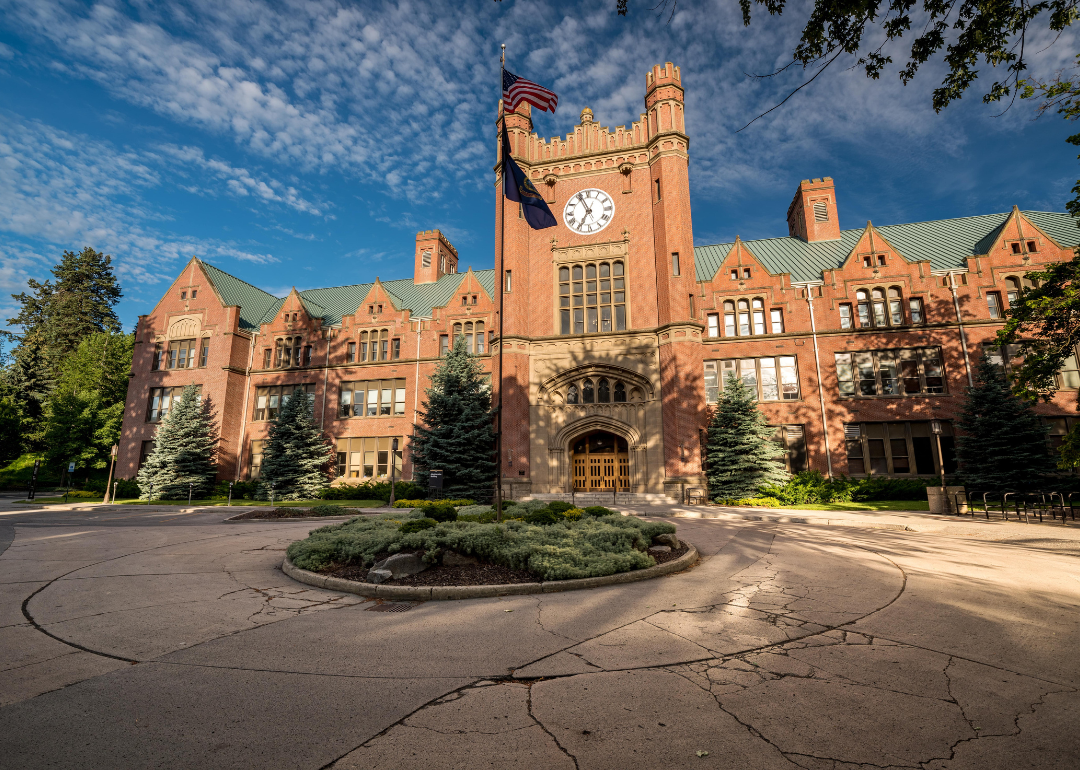
Charles Knowles // Shutterstock
#96. University of Idaho
A brick administration building at the University of Idaho.
– Location: Moscow, ID
– Students: 6,323
– Students to faculty ratio: 12:1
– Graduation rate: 59%
– Median earnings six years after graduation: $41,900
– Employment rate two years after graduation: 92%
The University of Idaho is a land-grant research school founded in 1889 through the federal Morrill Act to specialize in agriculture, engineering, and military sciences. The main campus is in Moscow, a university city of art galleries, movie theaters, and restaurants but surrounded by the Palouse Hills and close to forests and lakes, The class of 2022 is the largest in the school’s history. One fun fact: Its mascot is called Joe Vandal.
You may also like: Can you pass this 8th grade assessment test?
